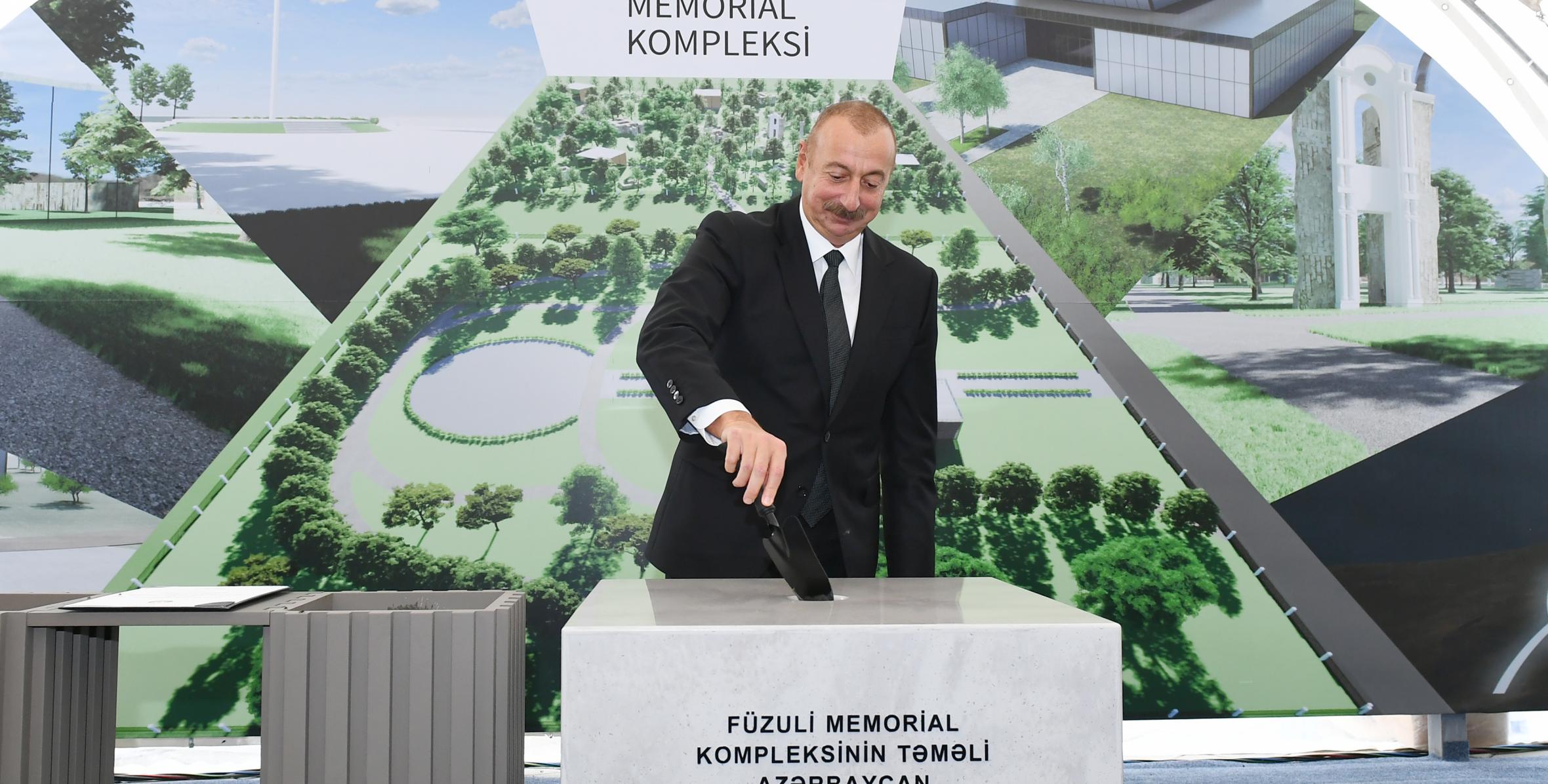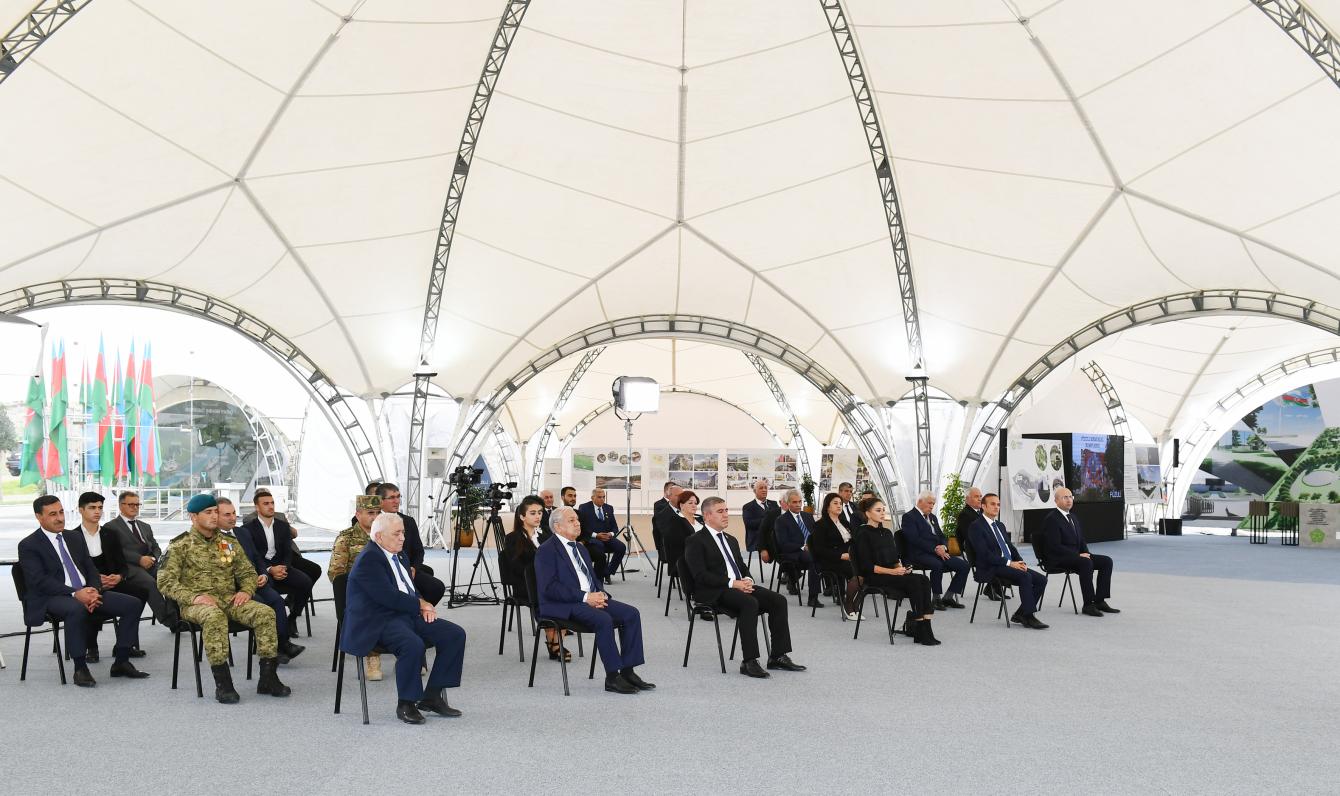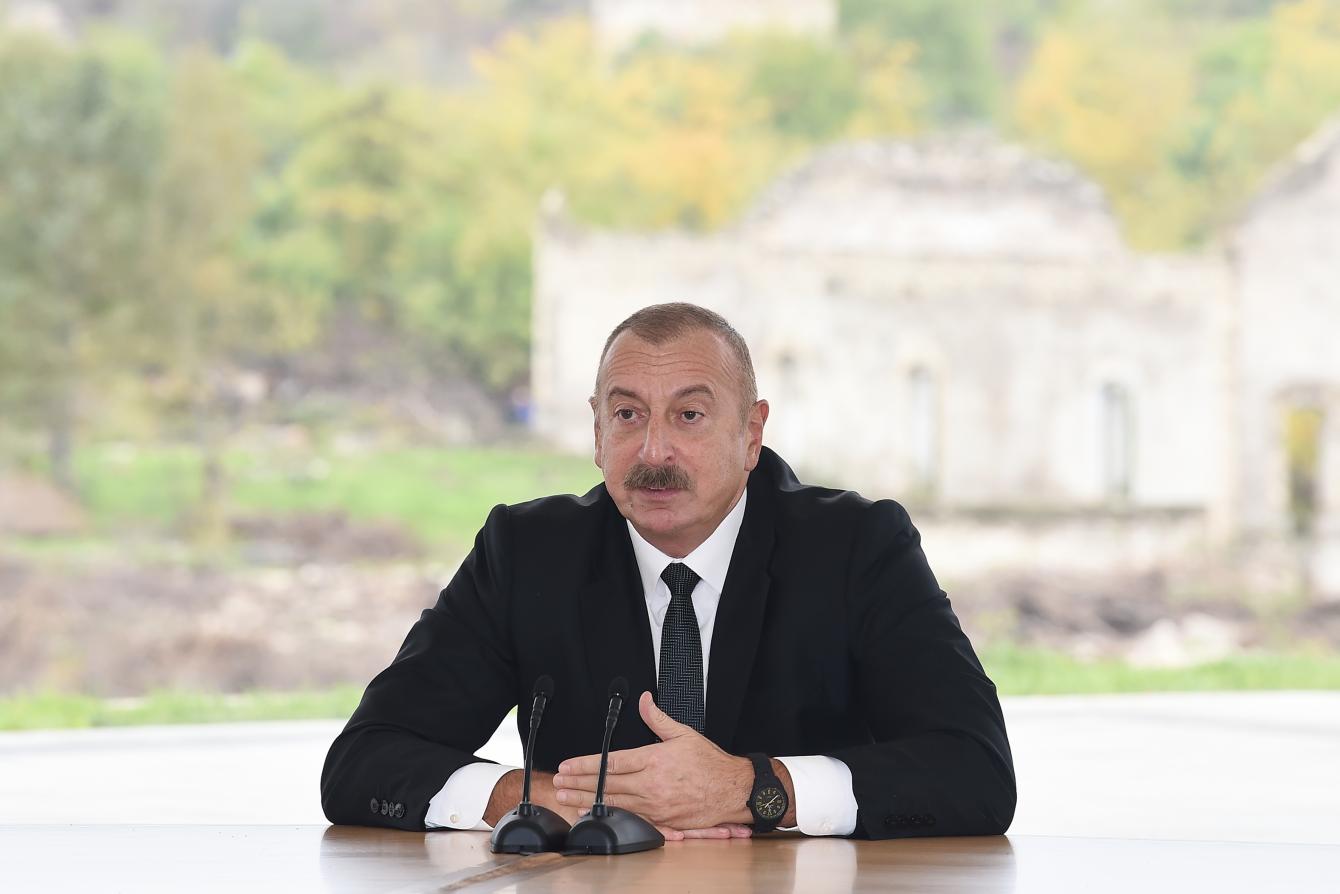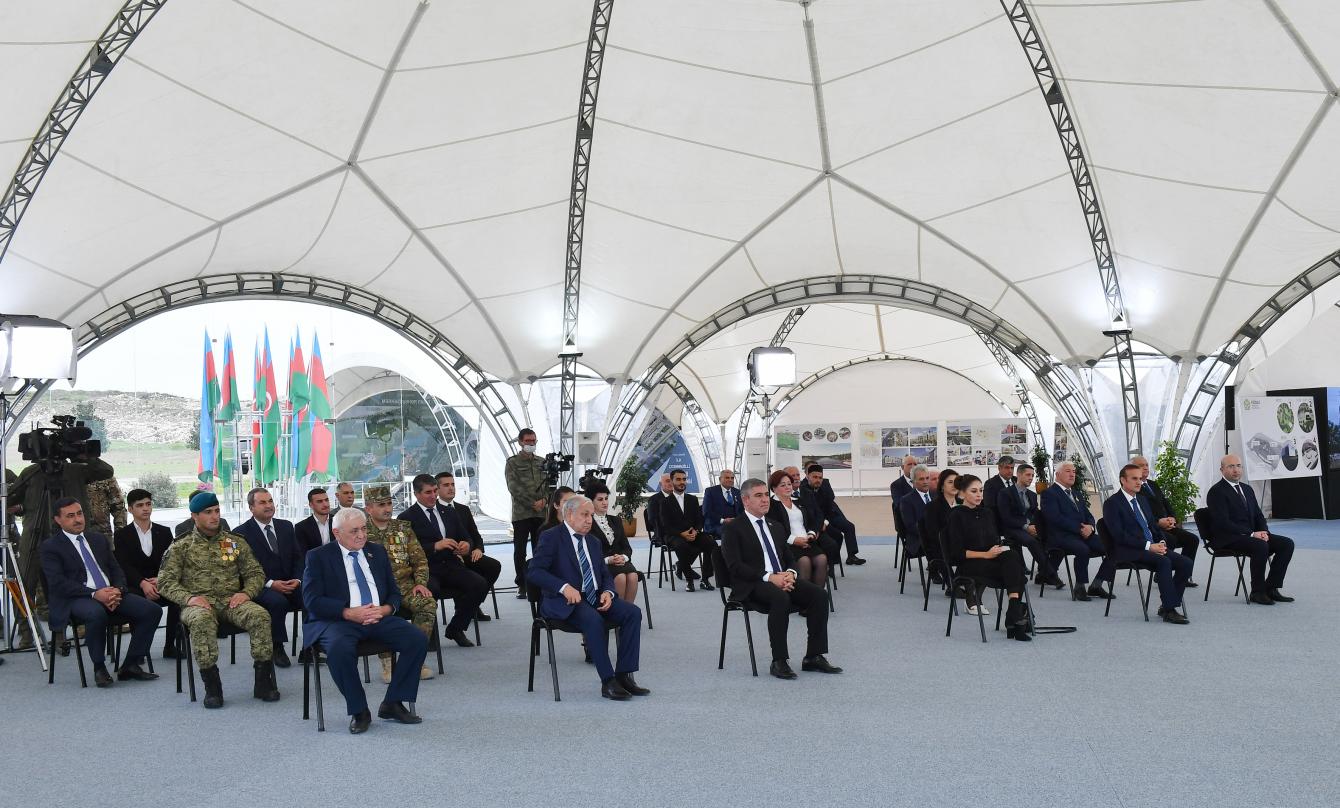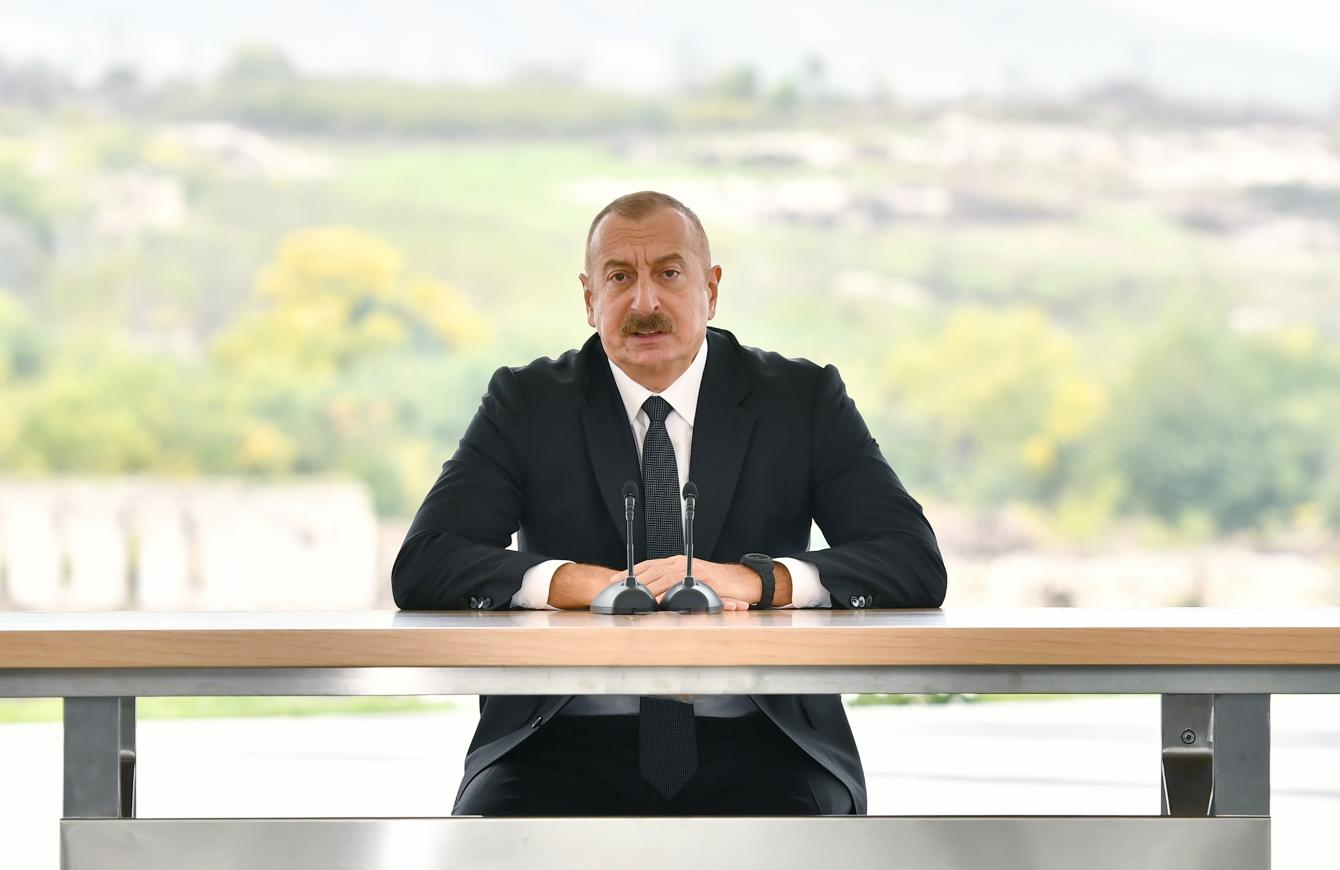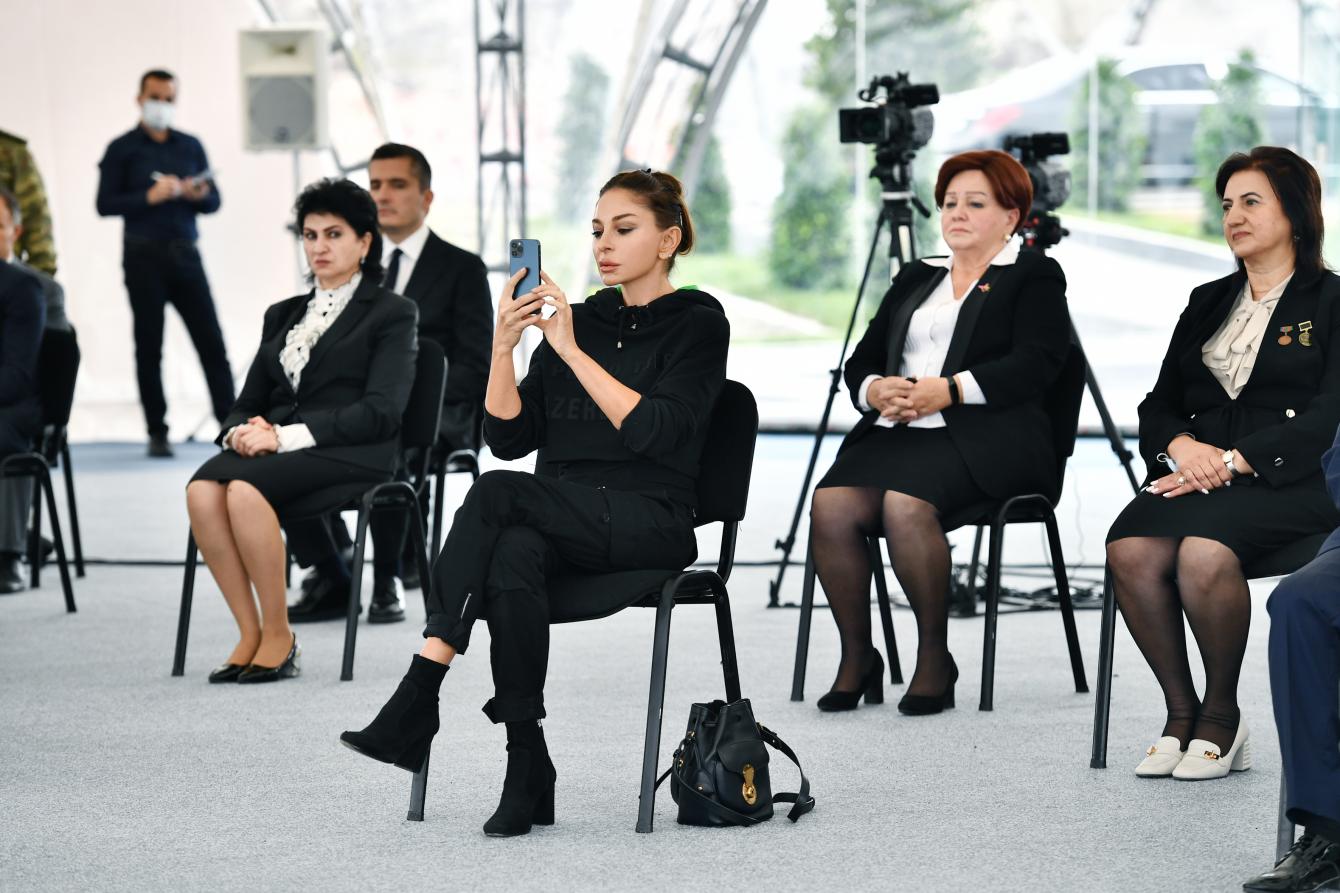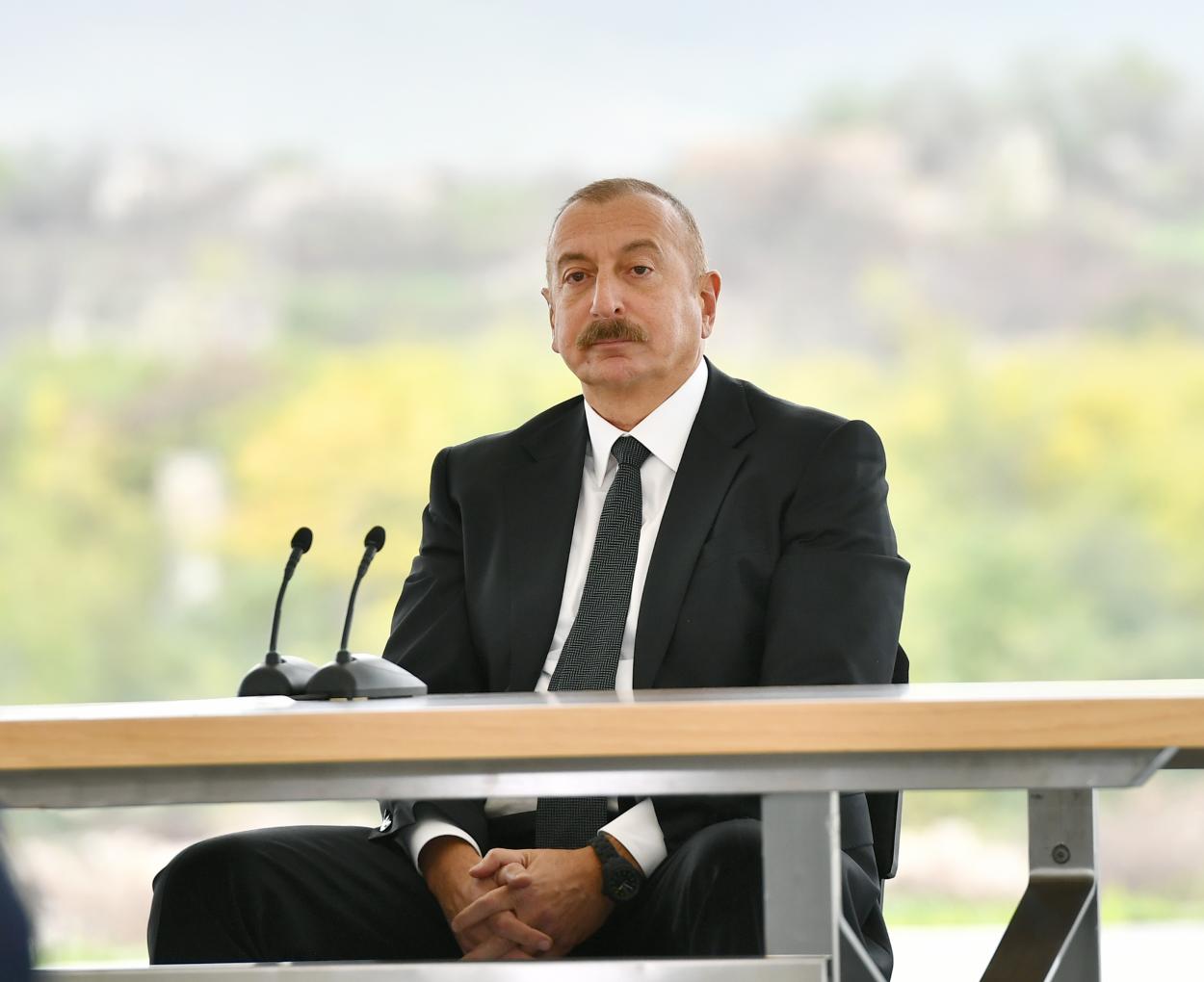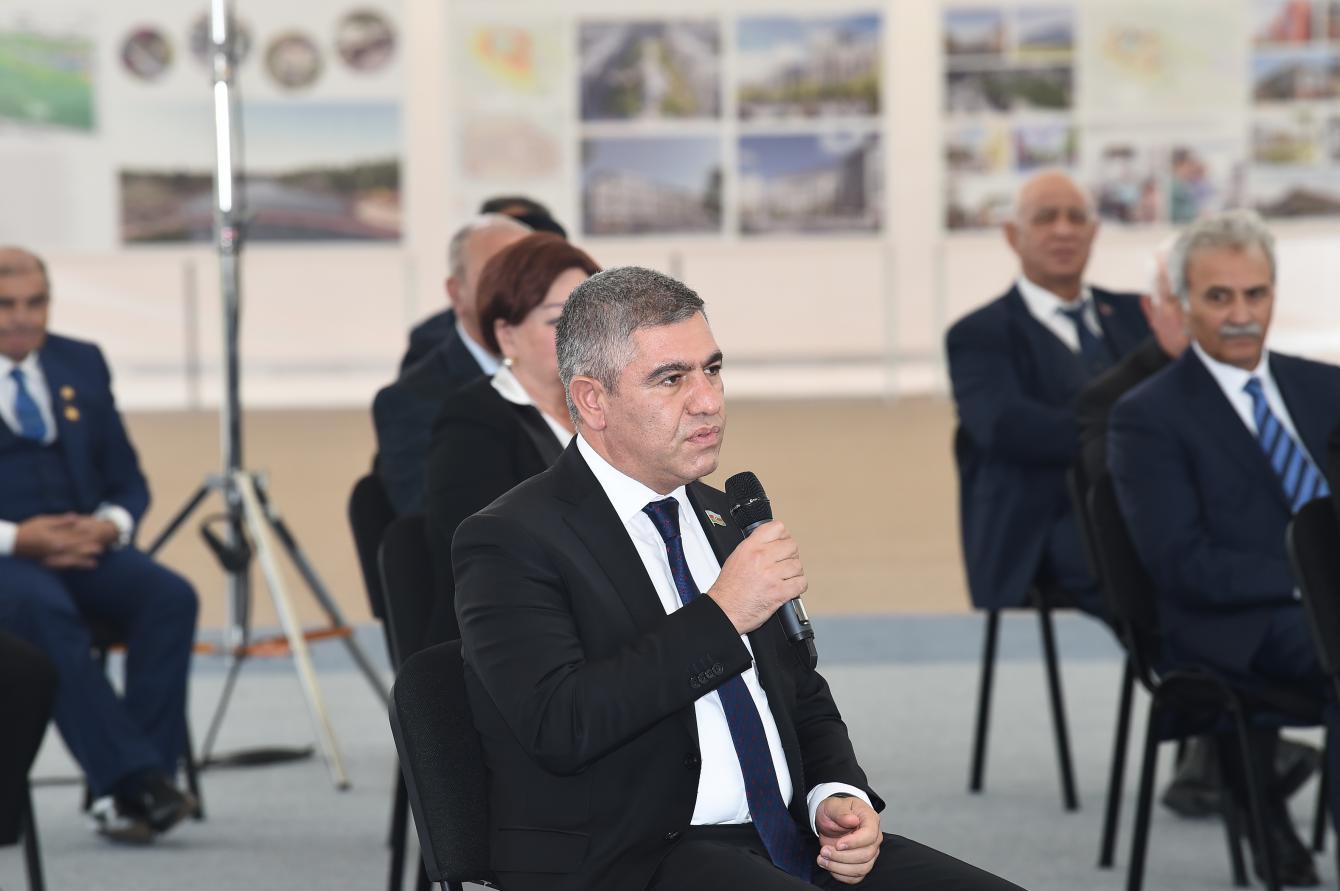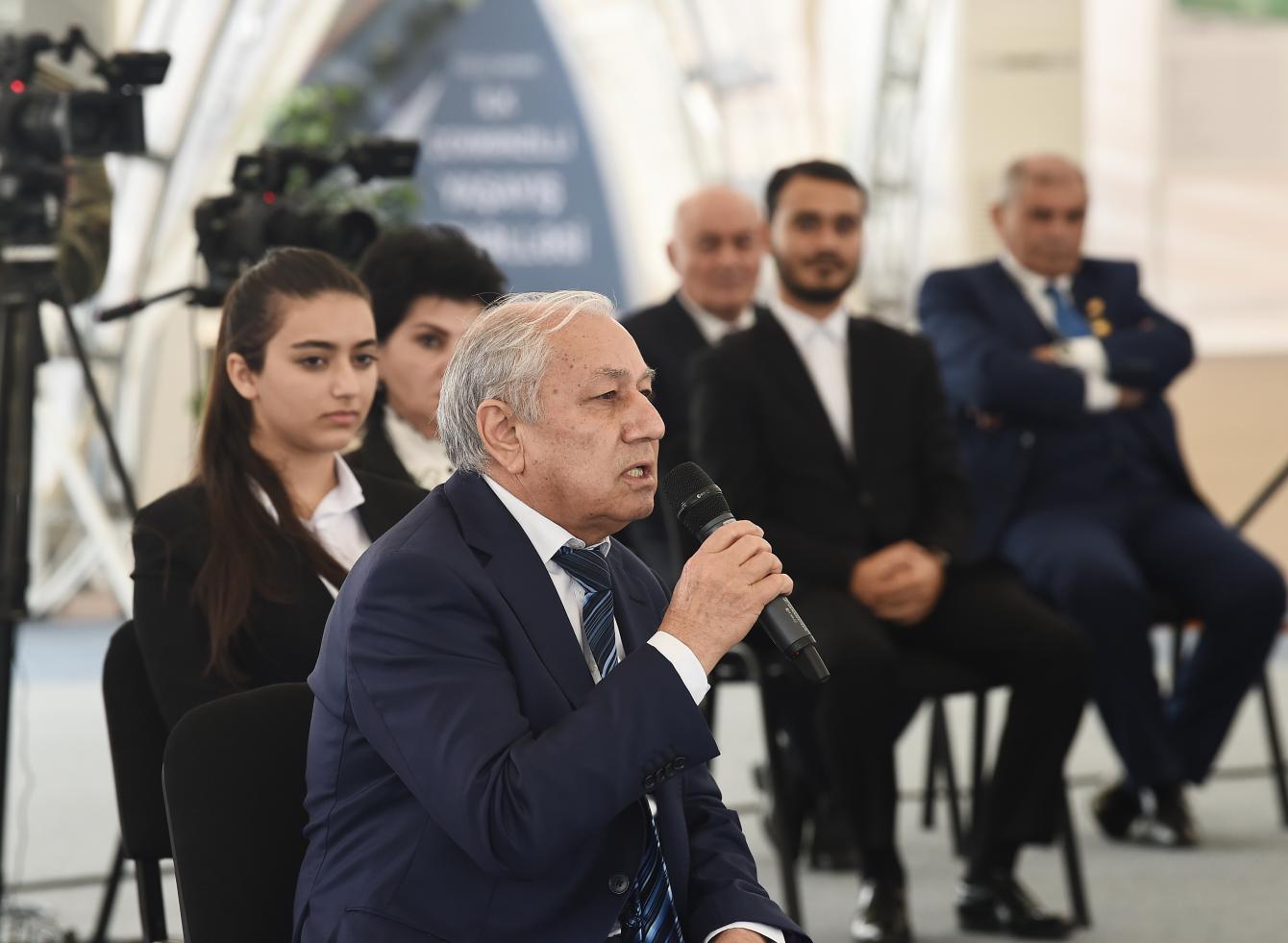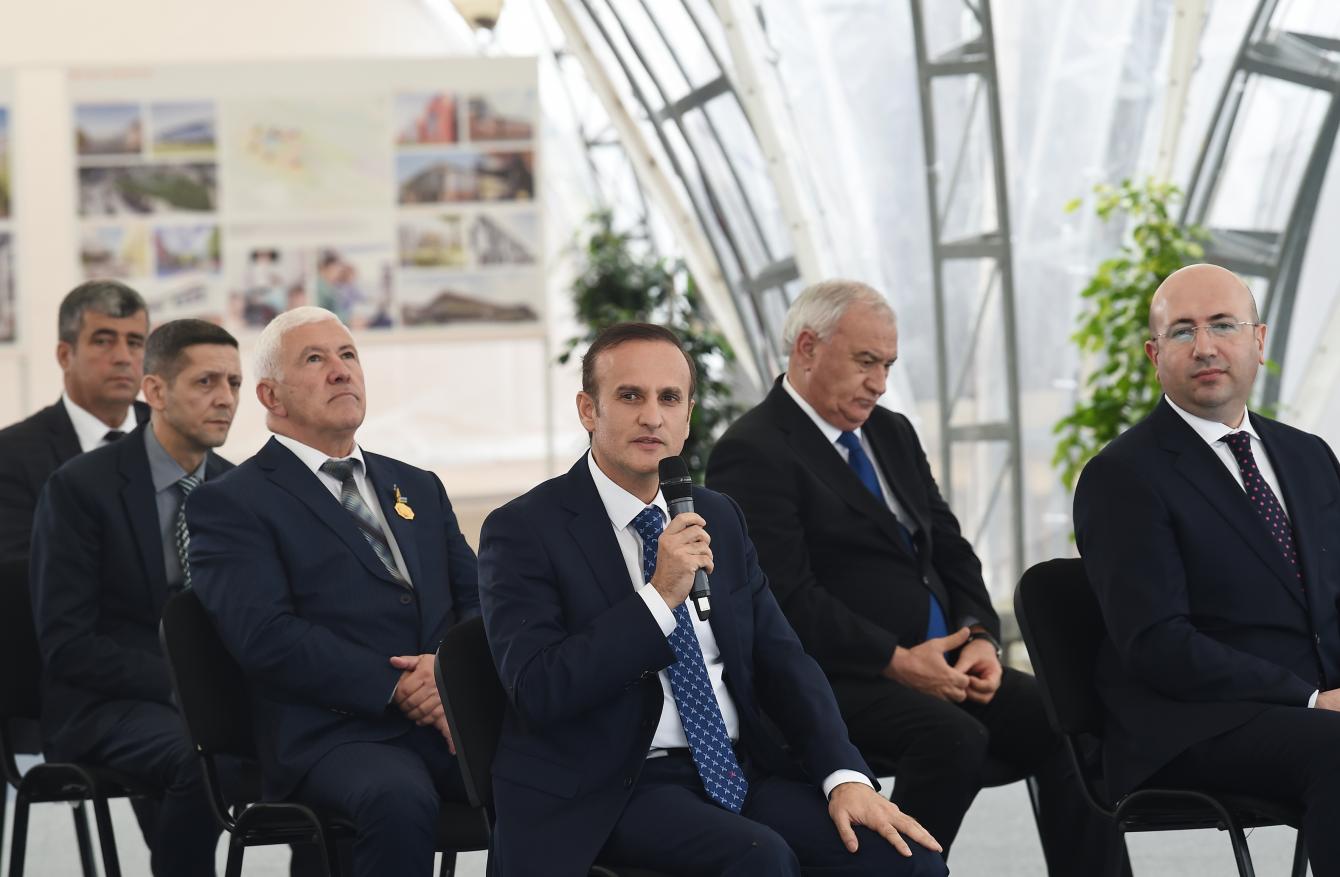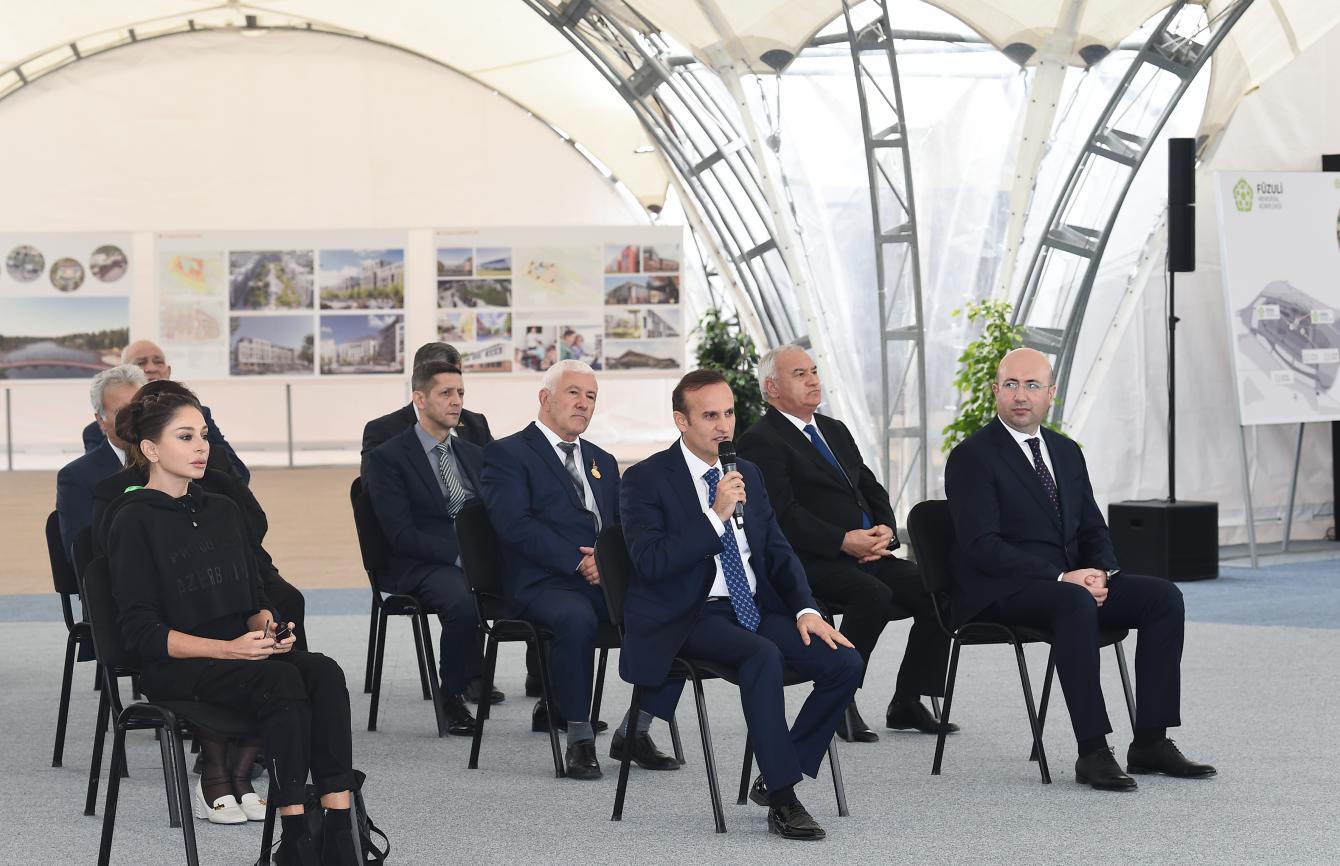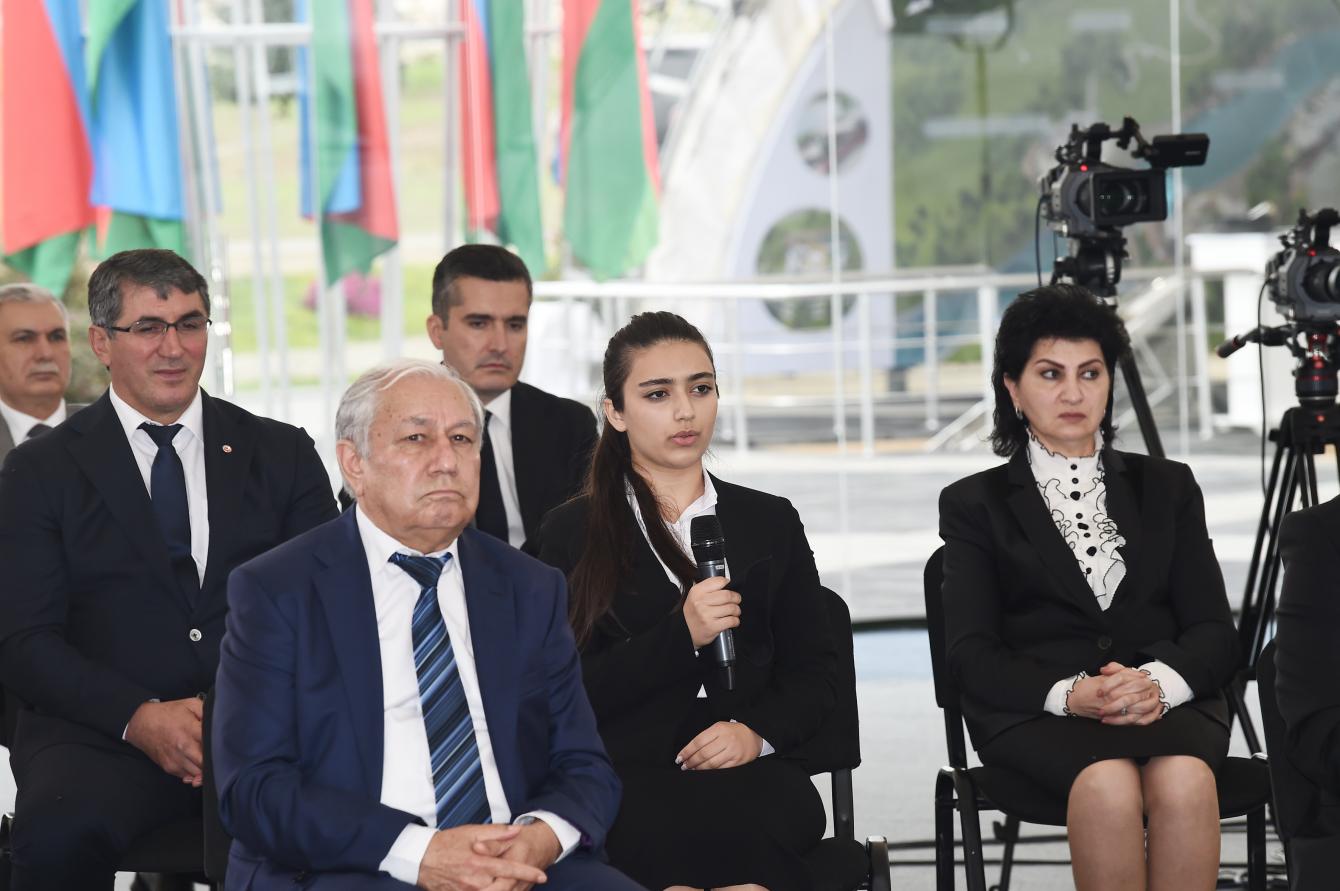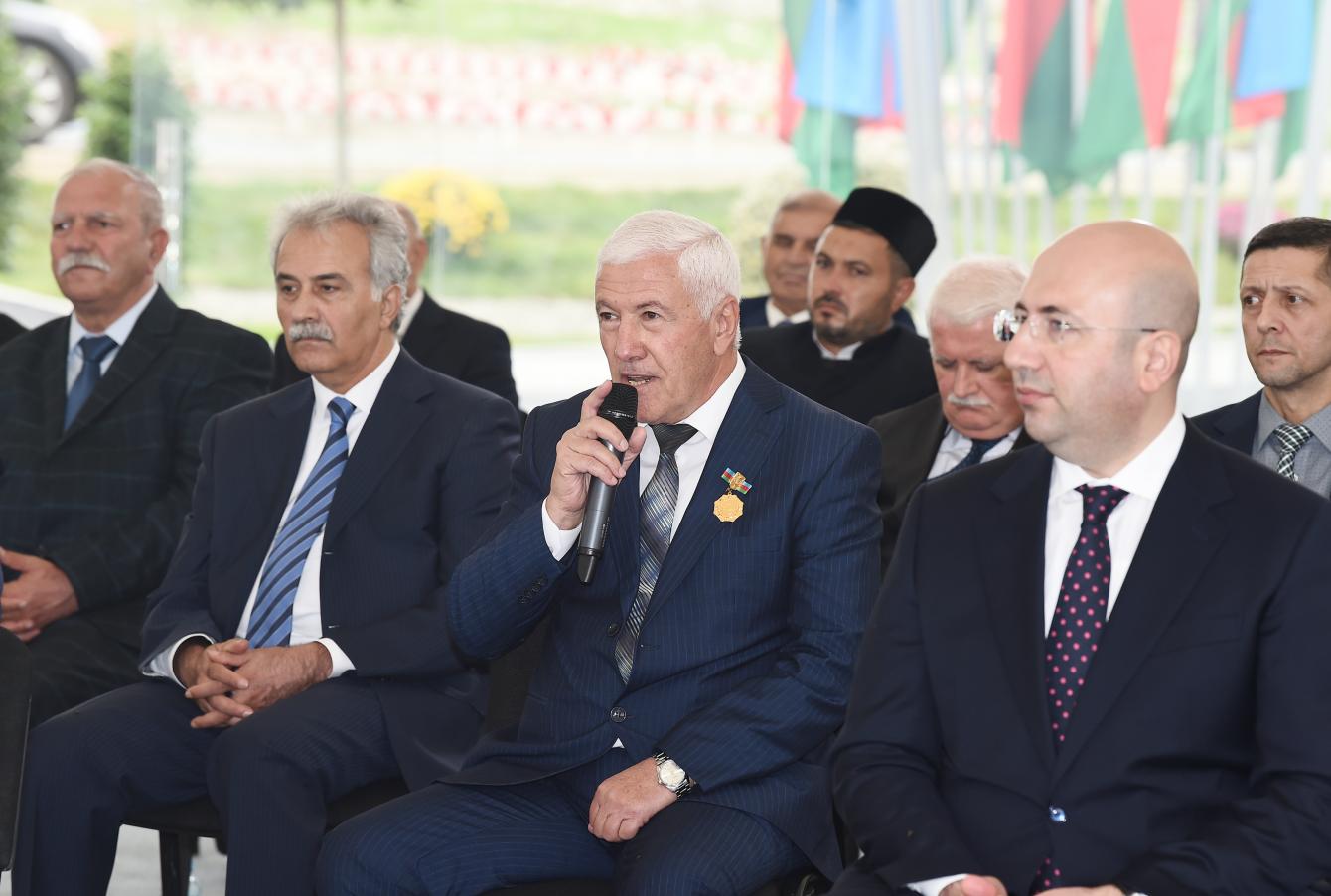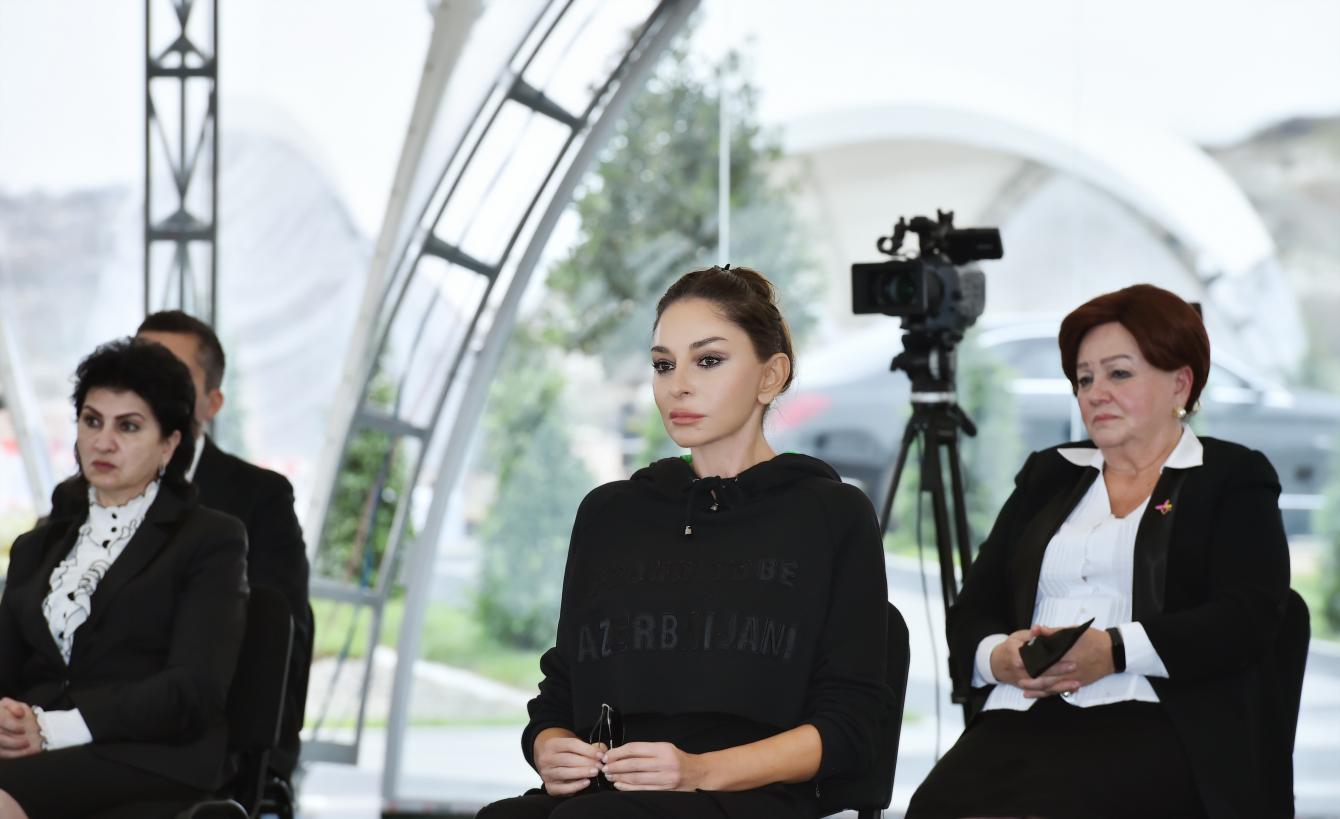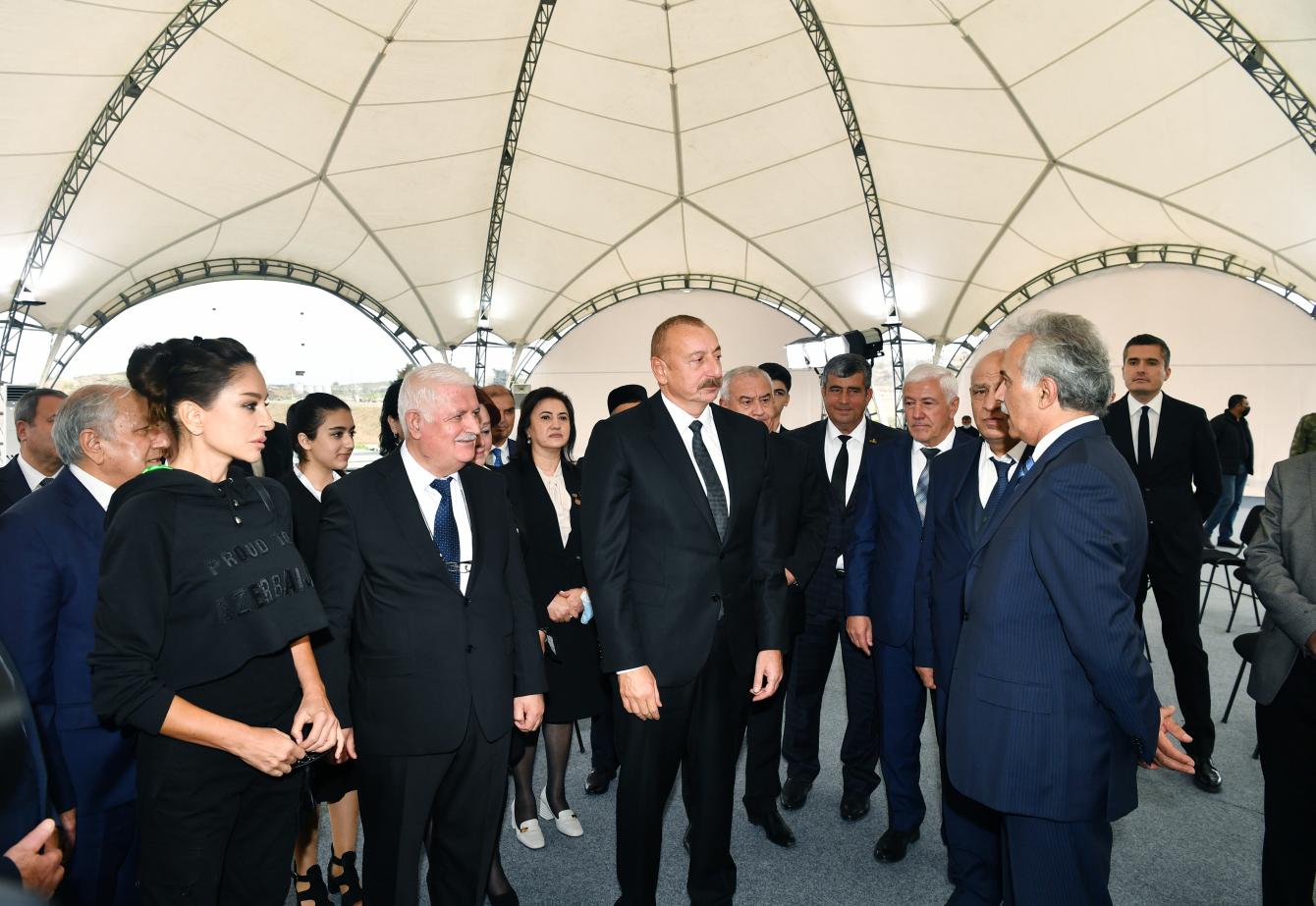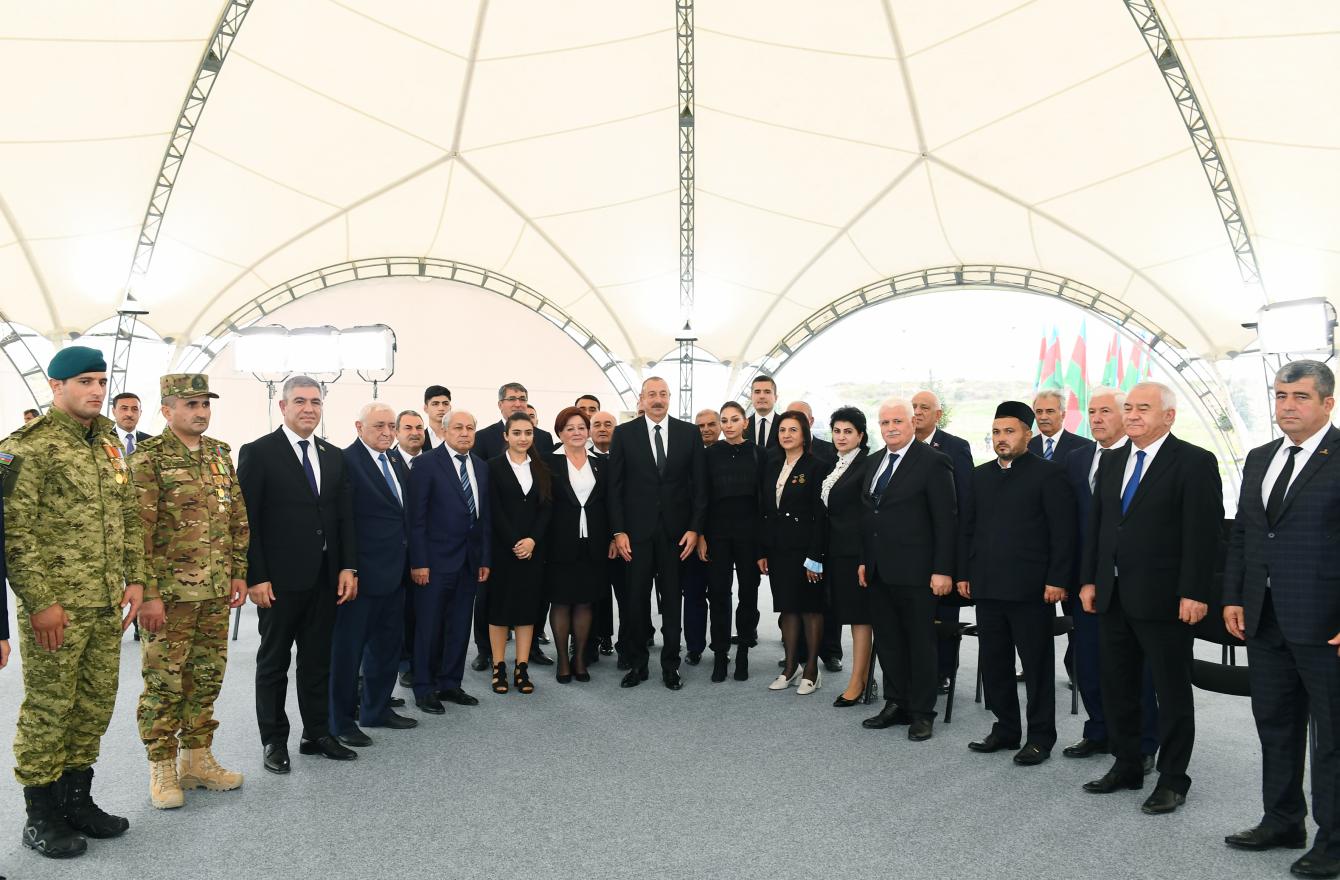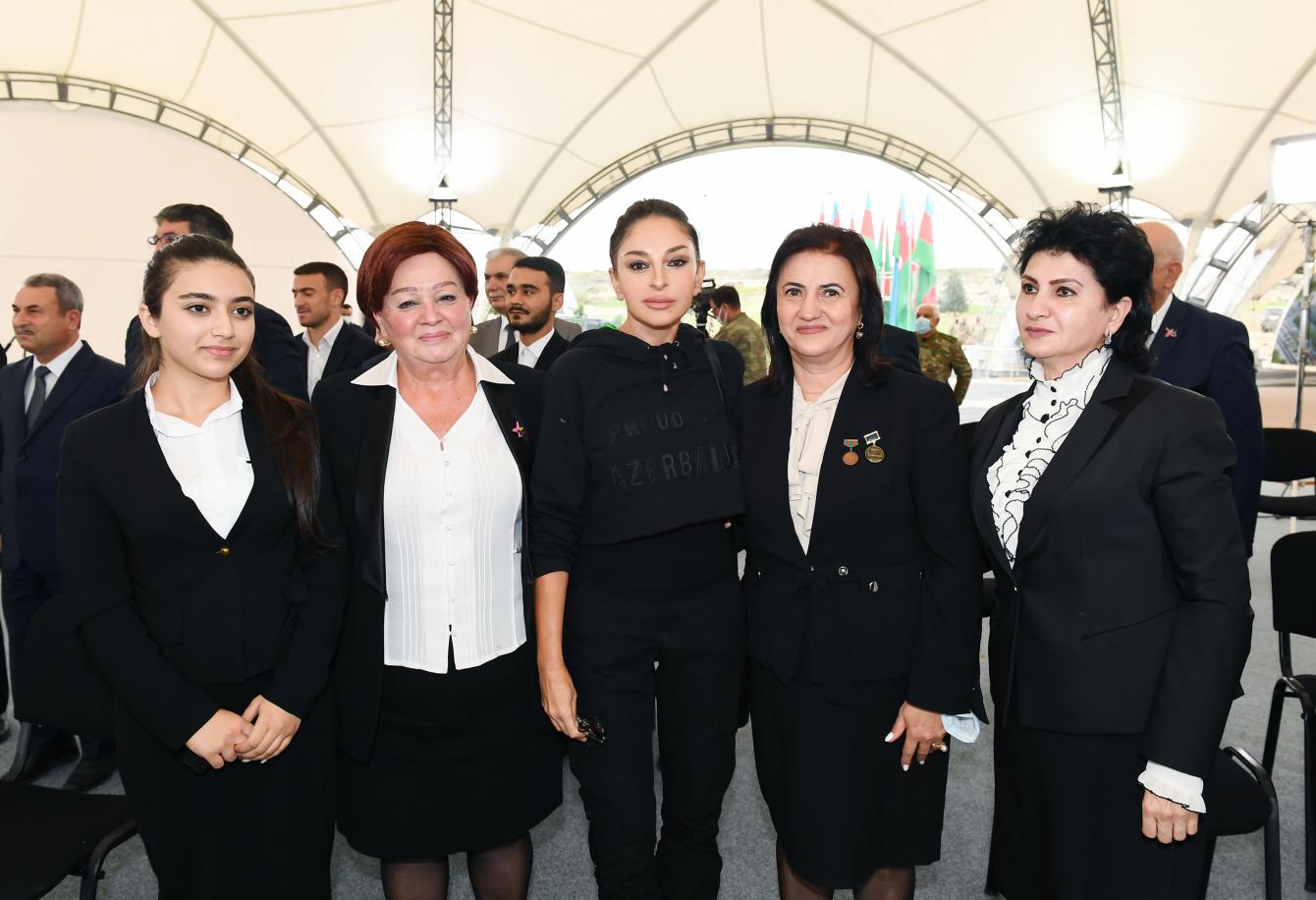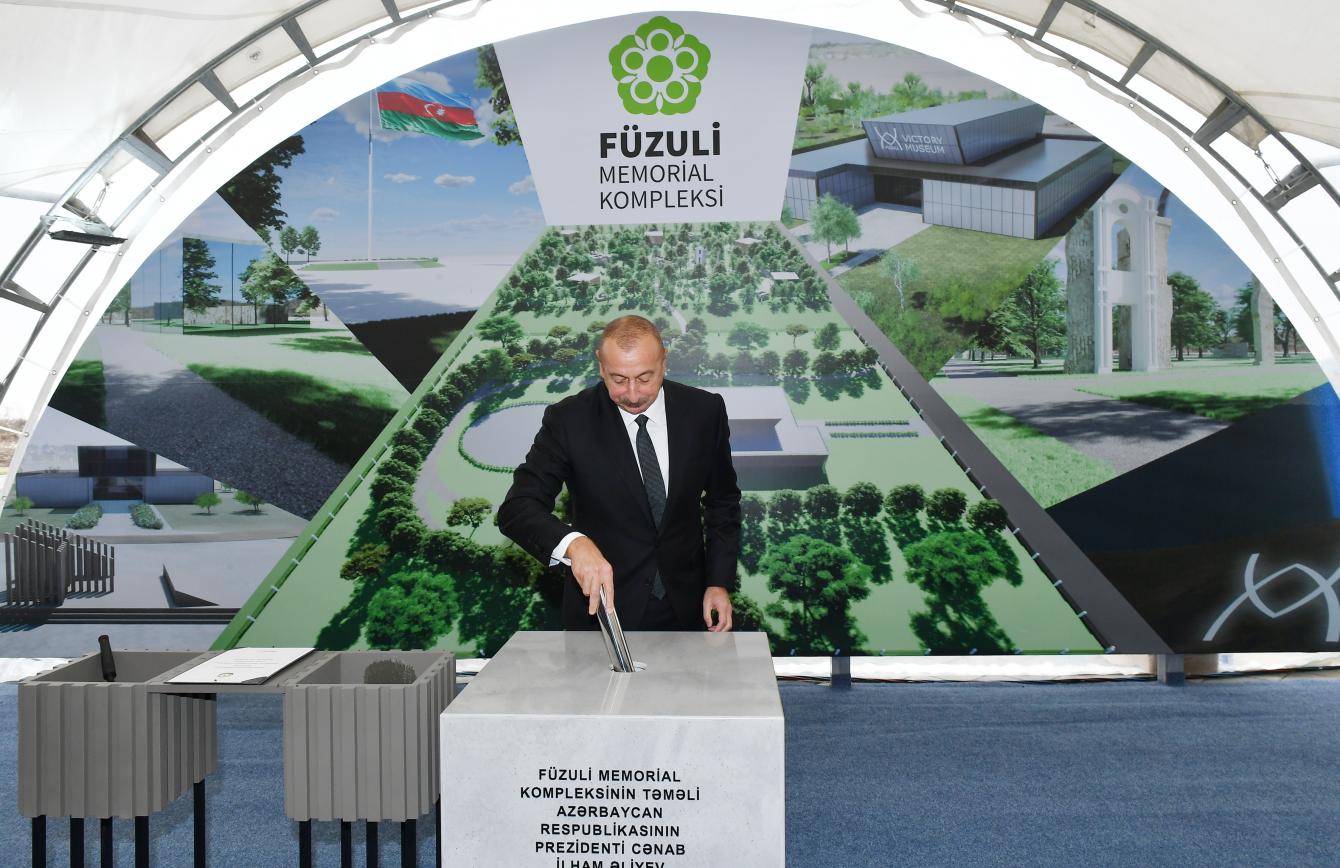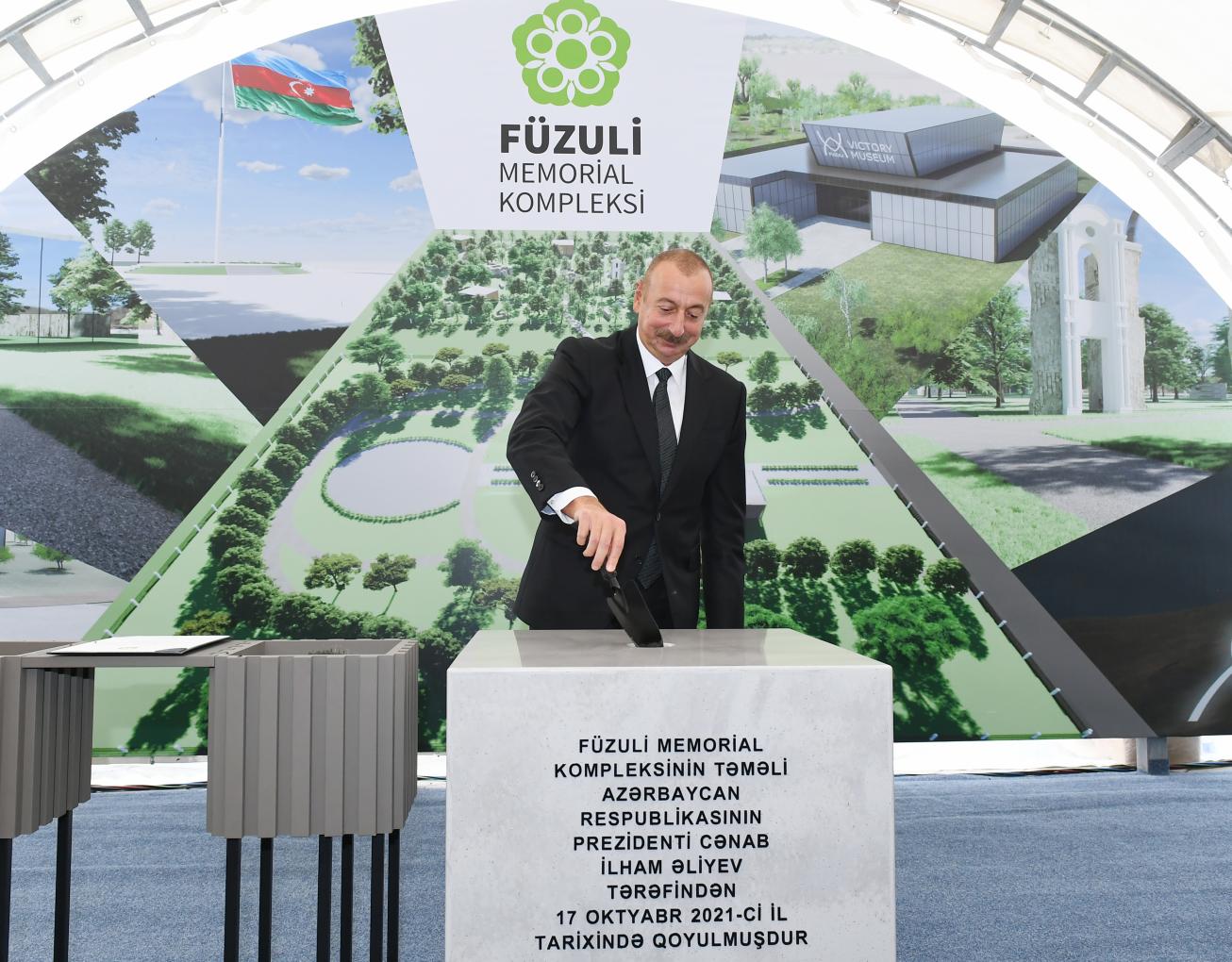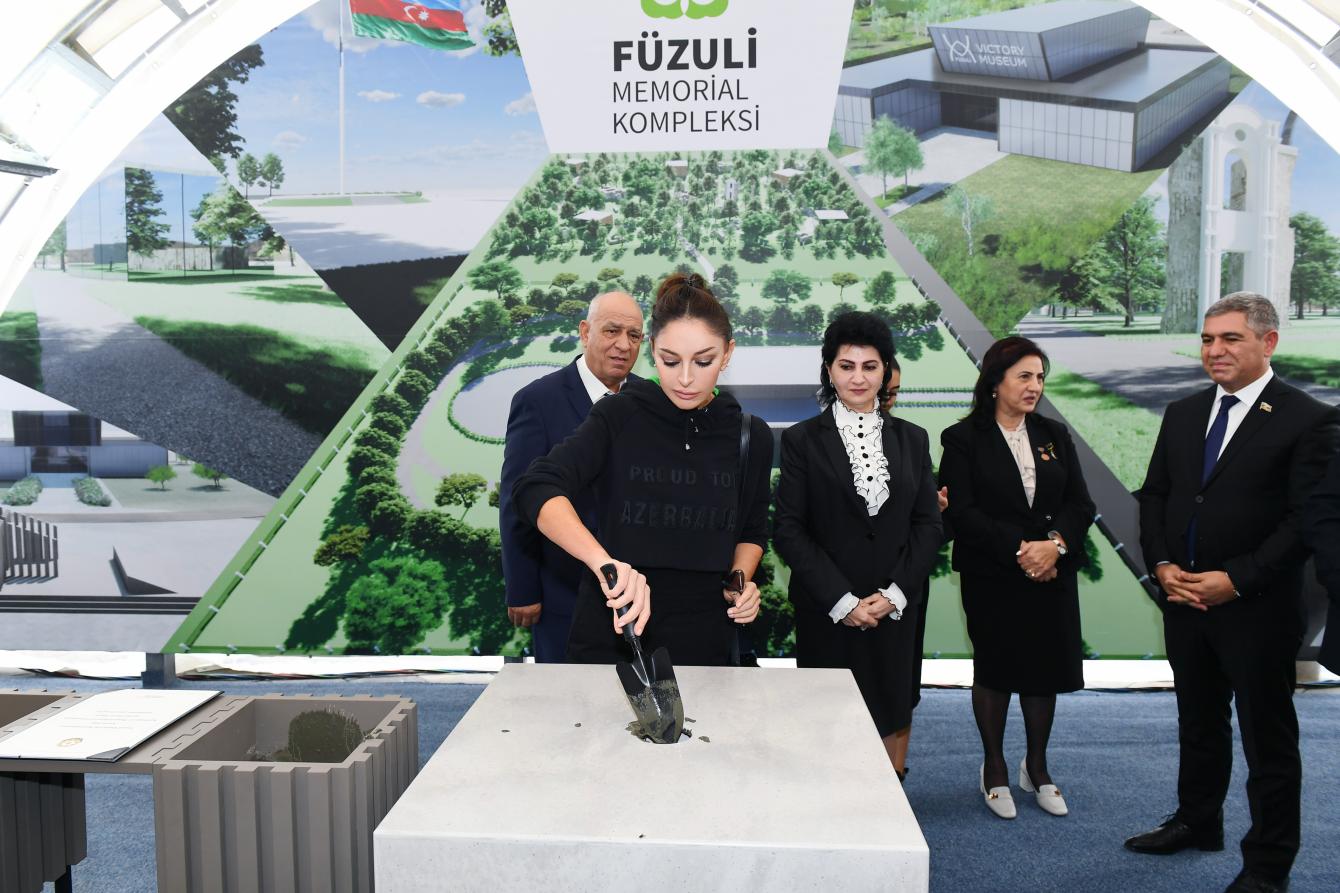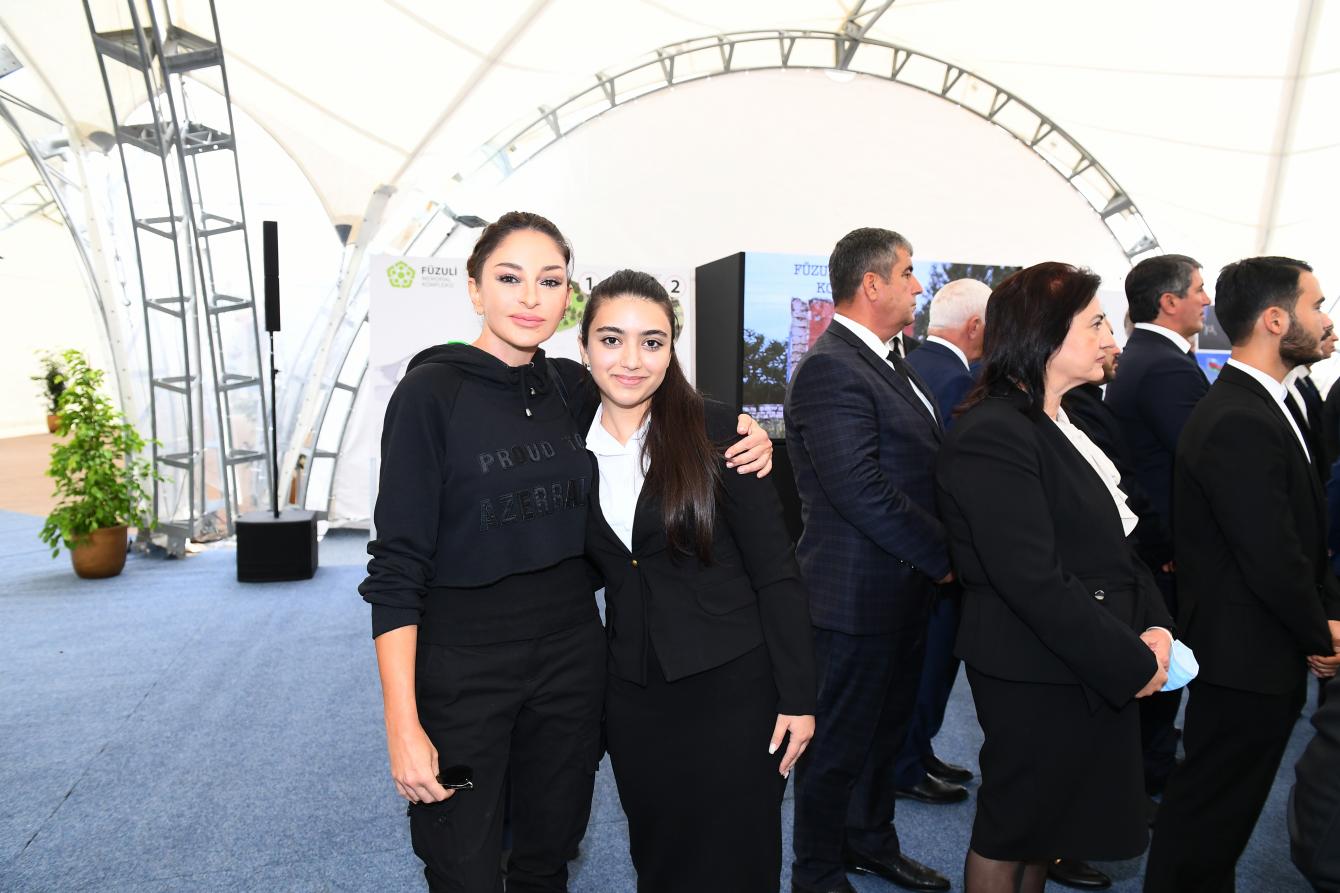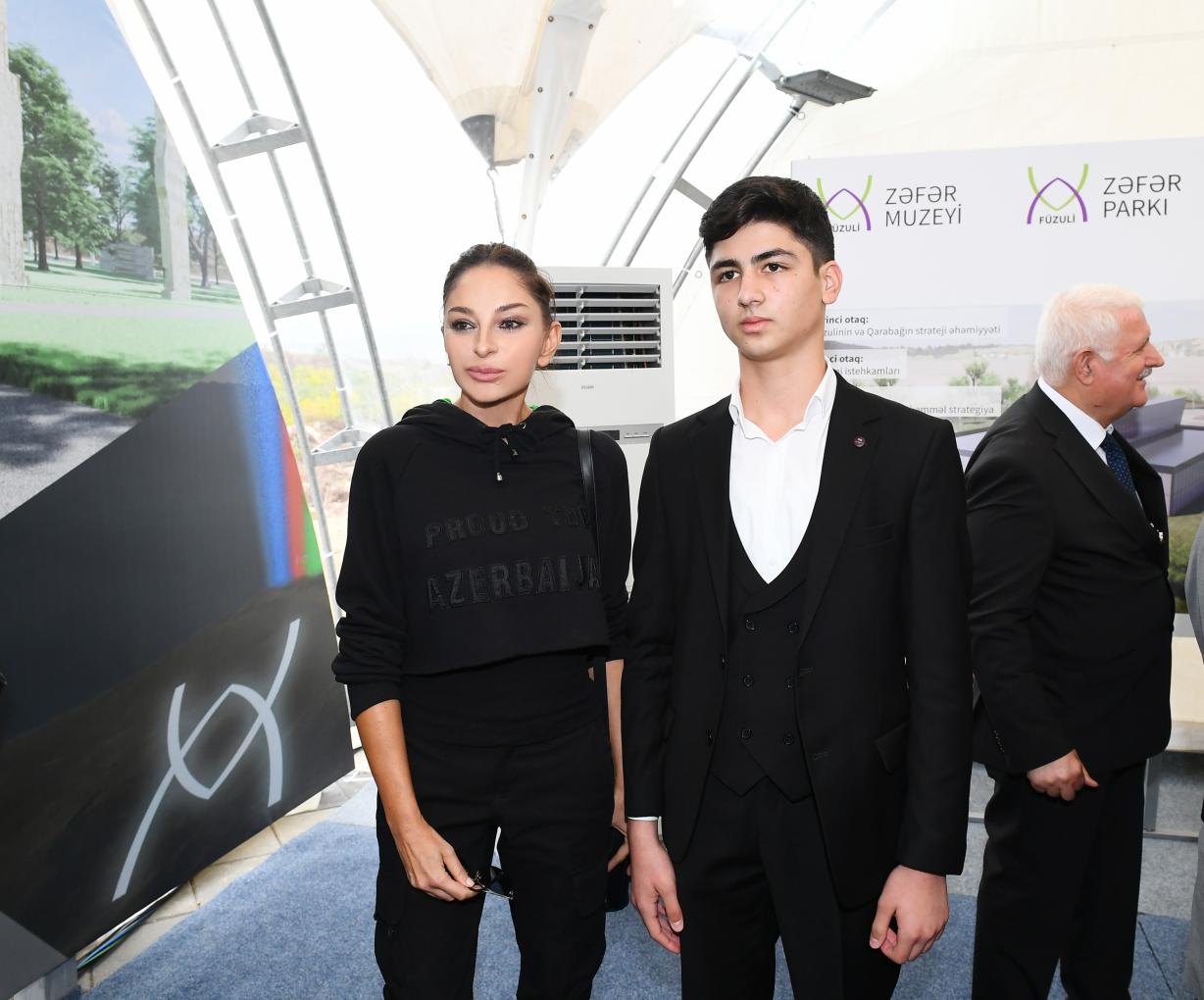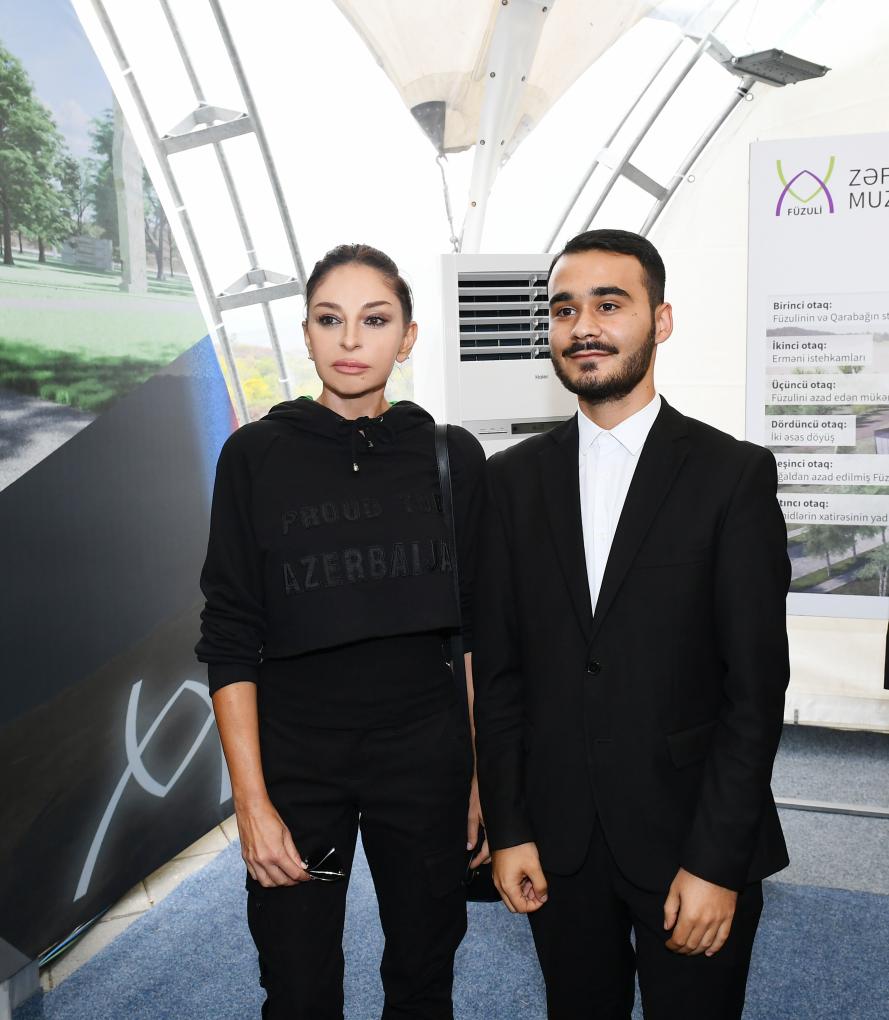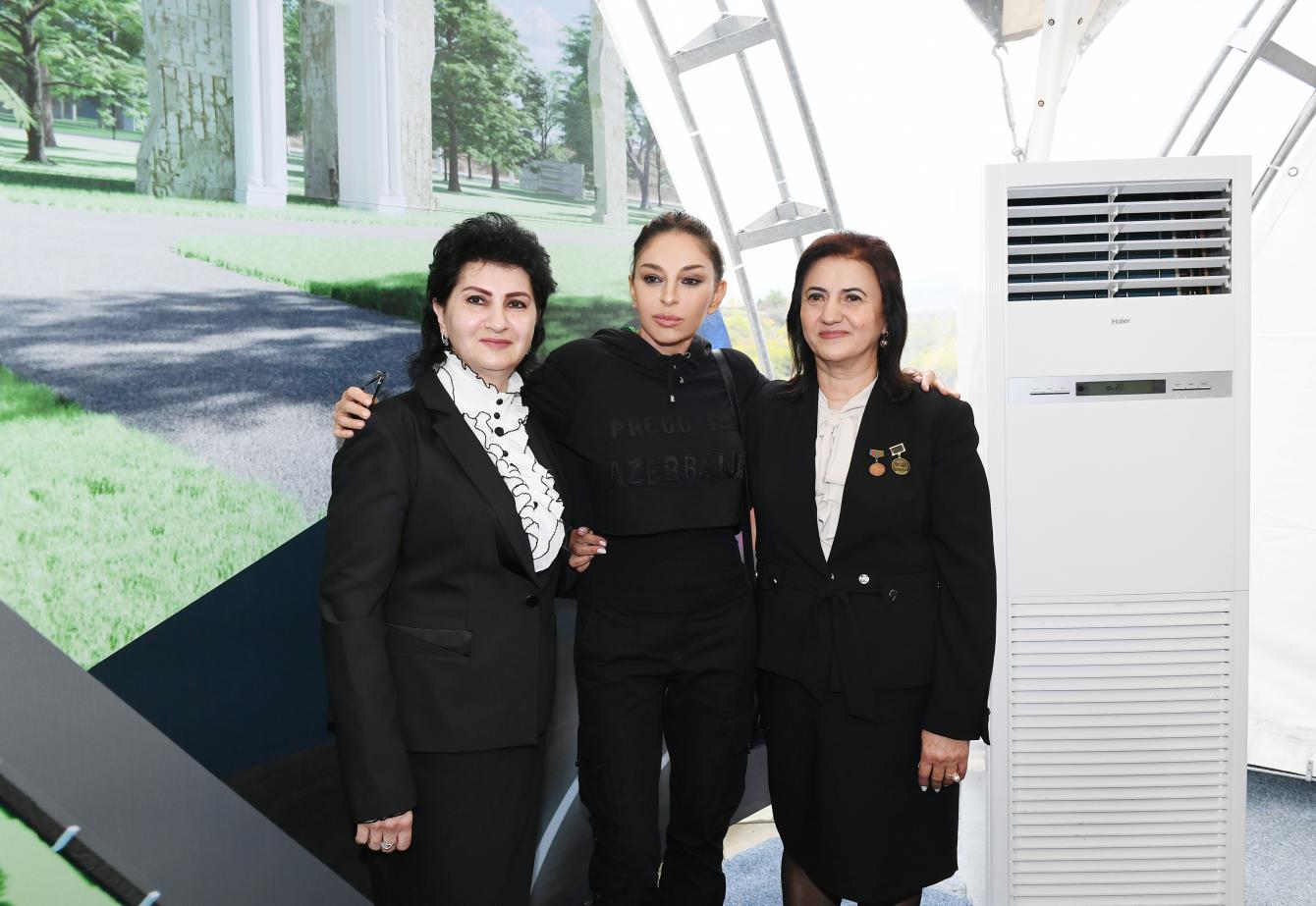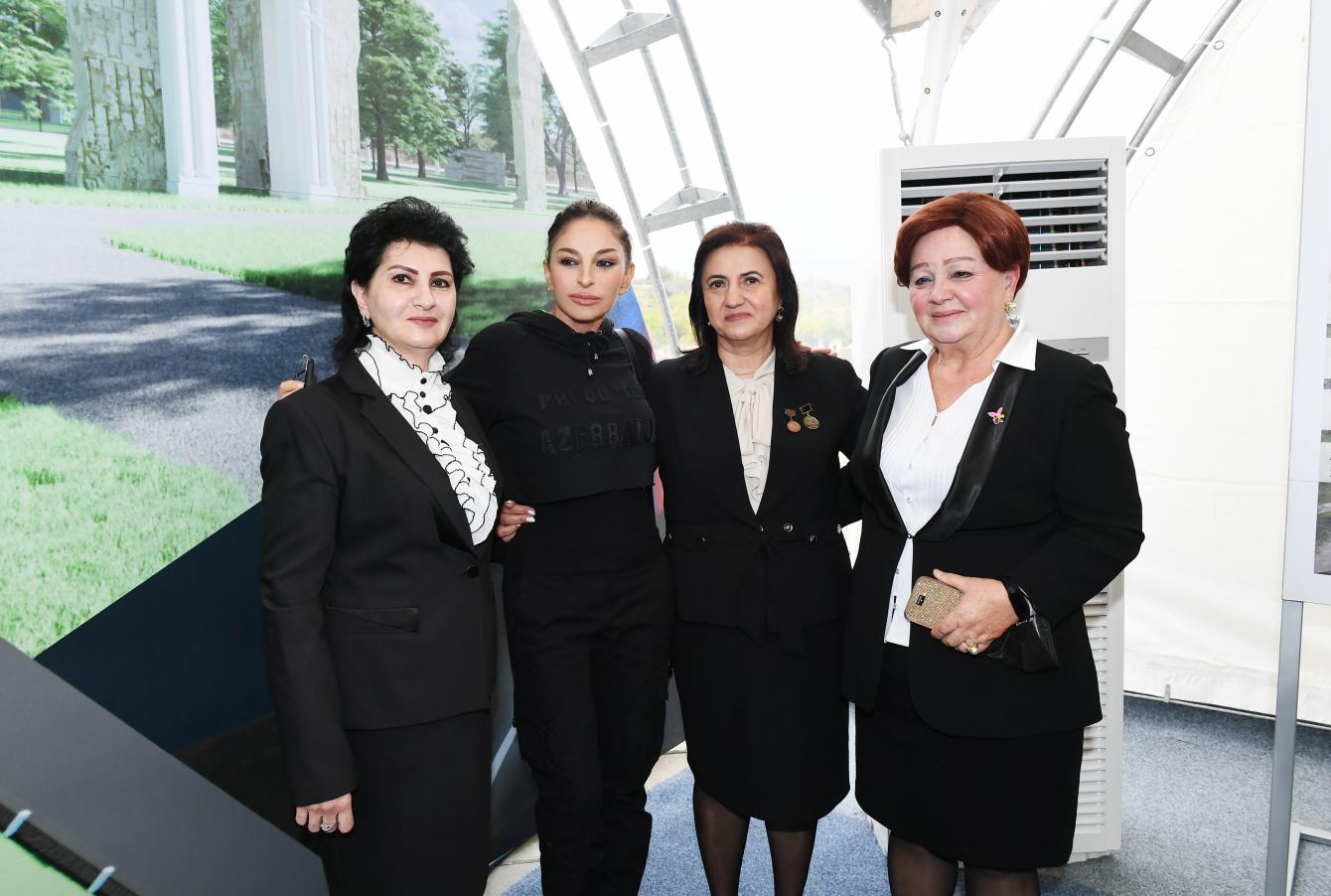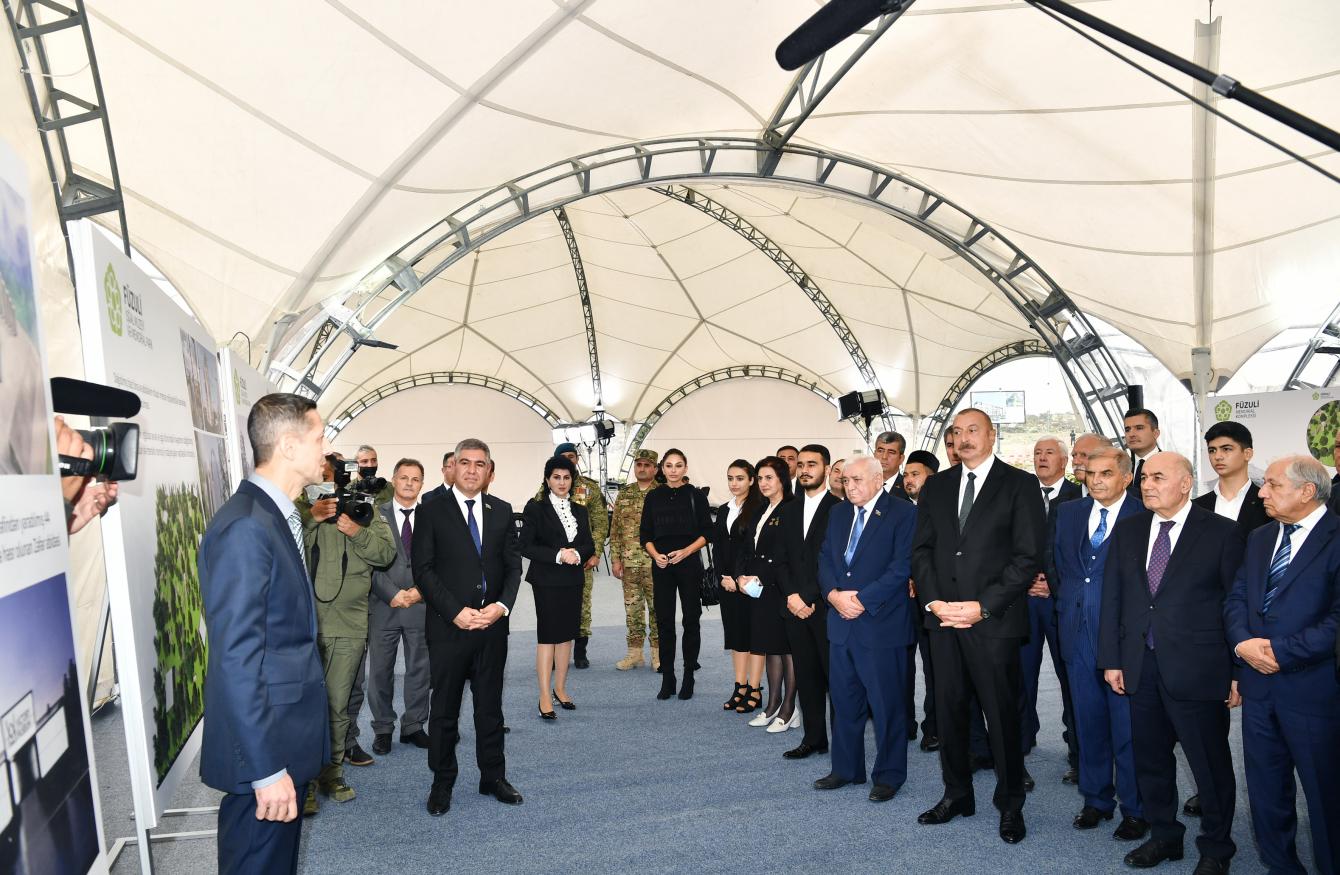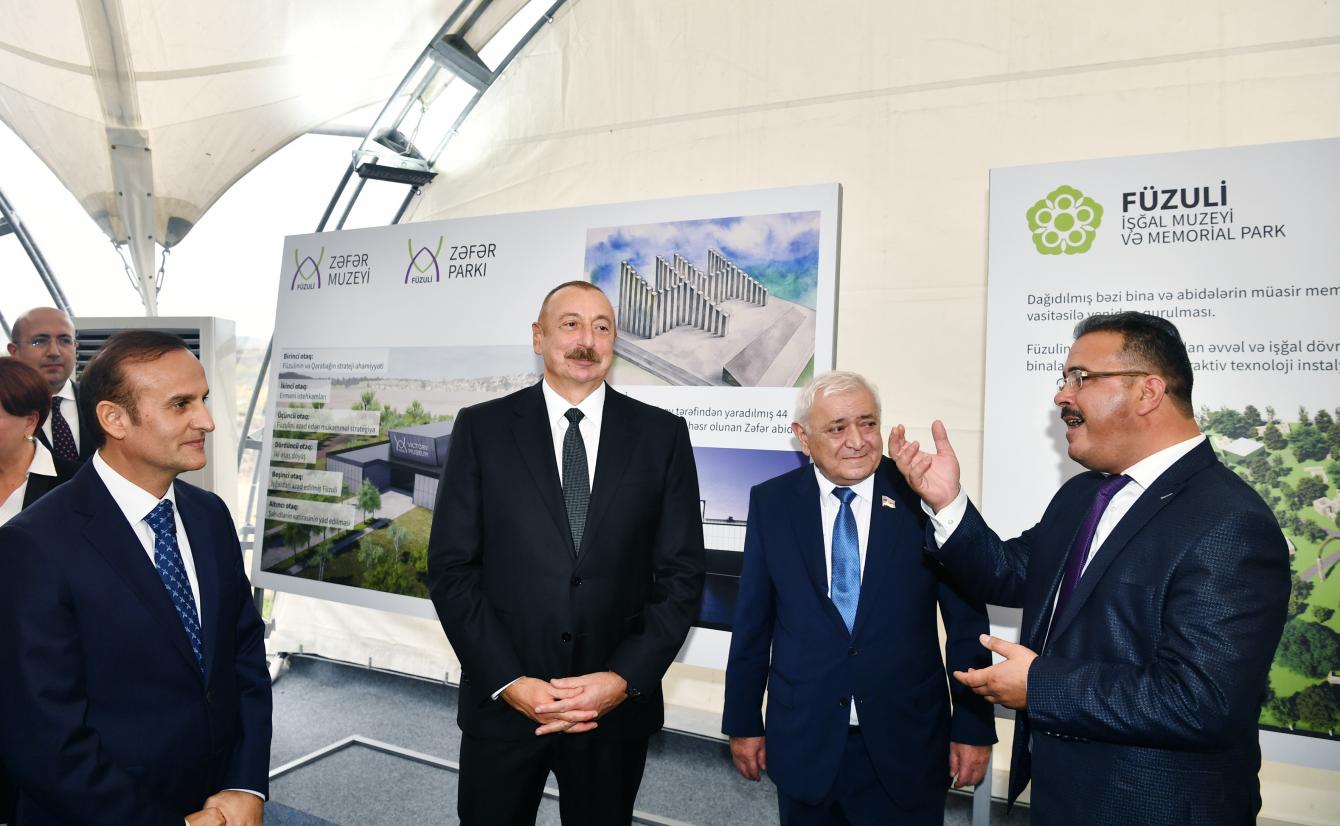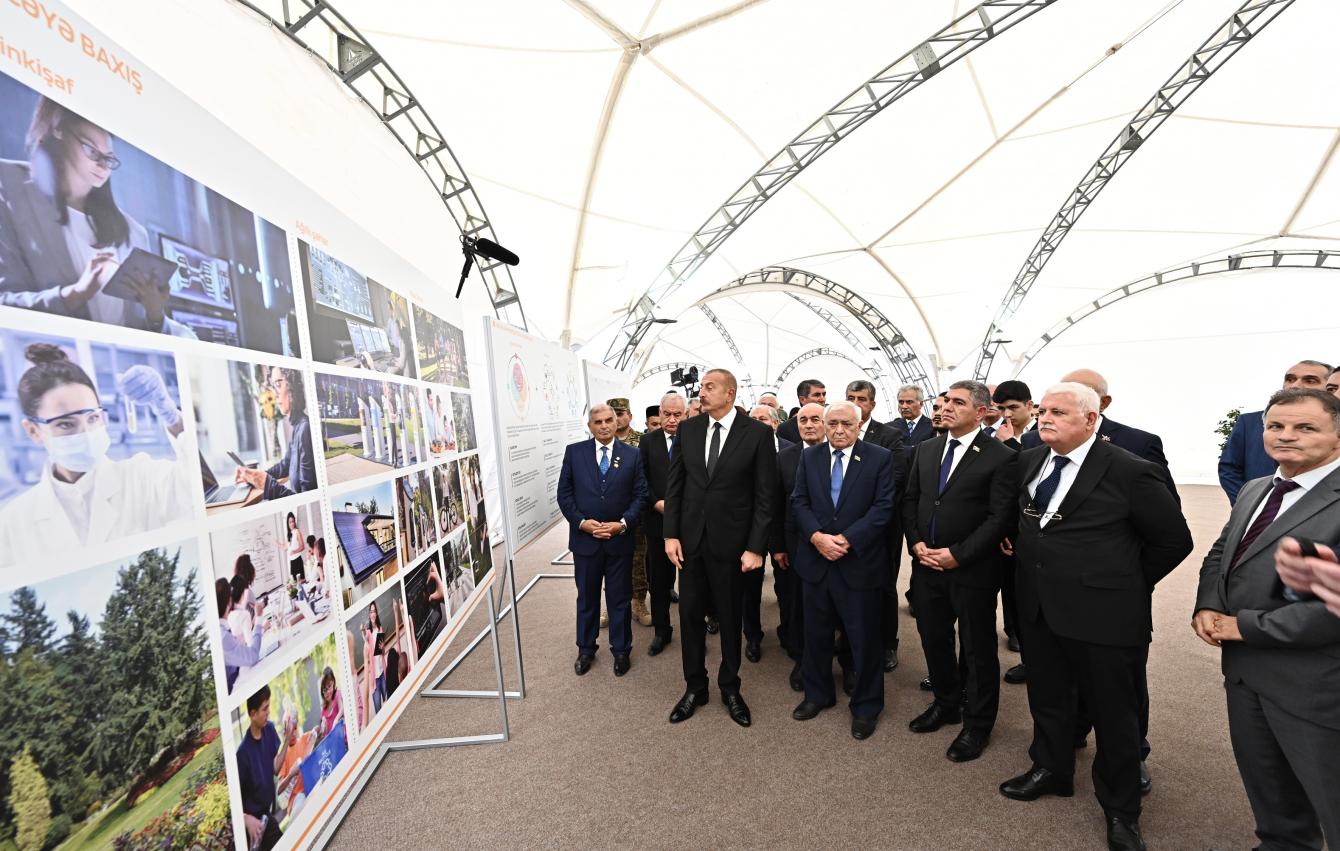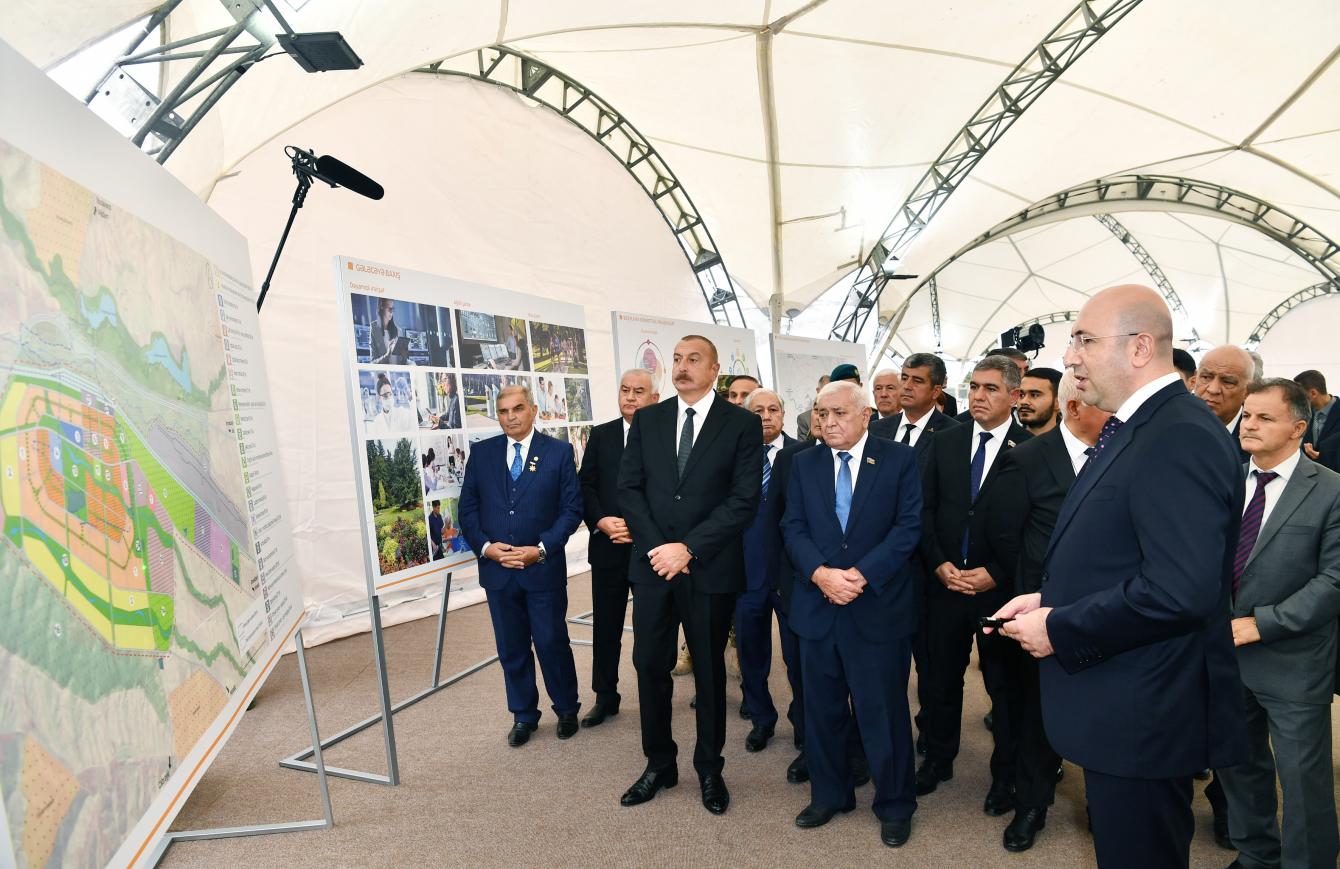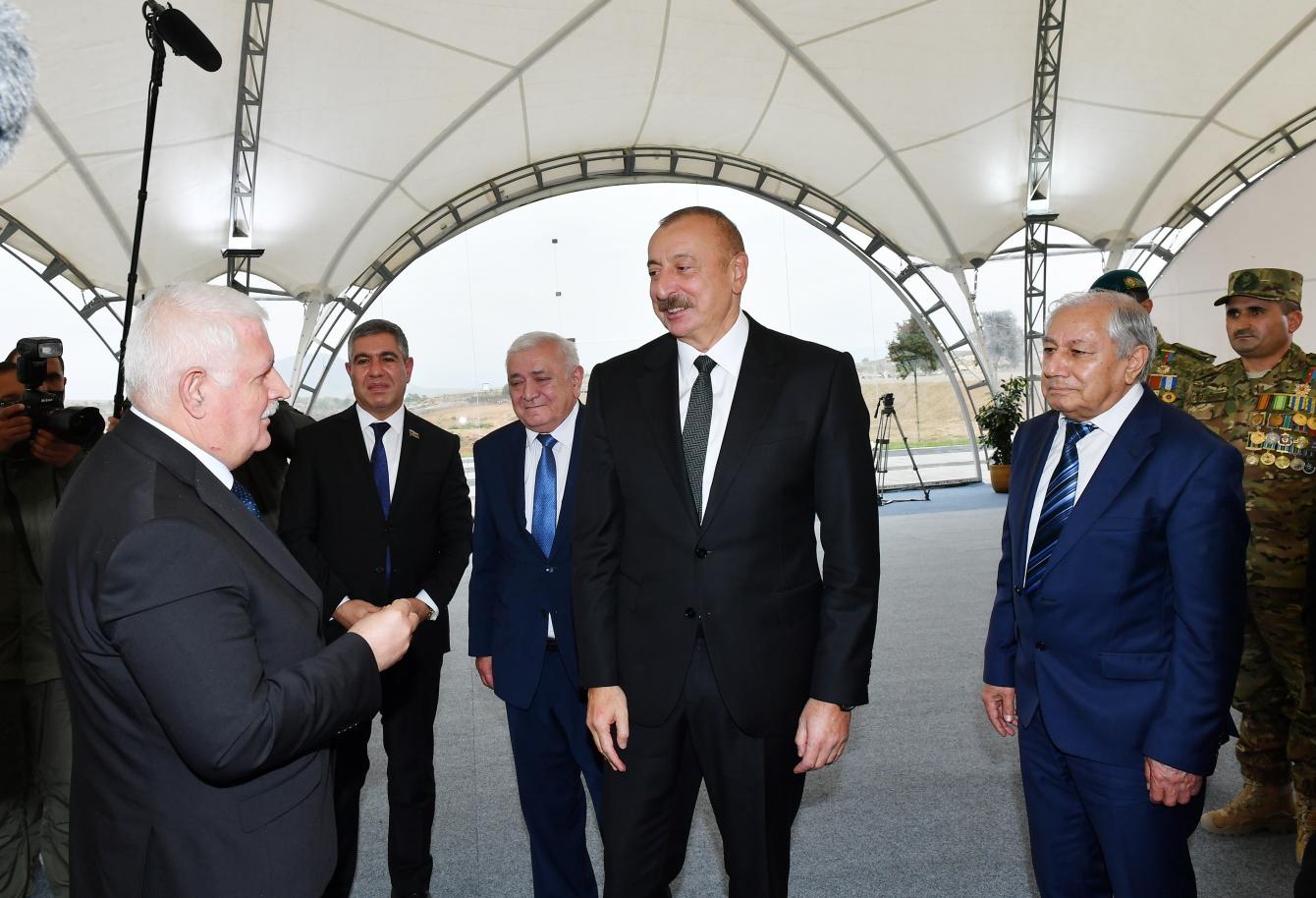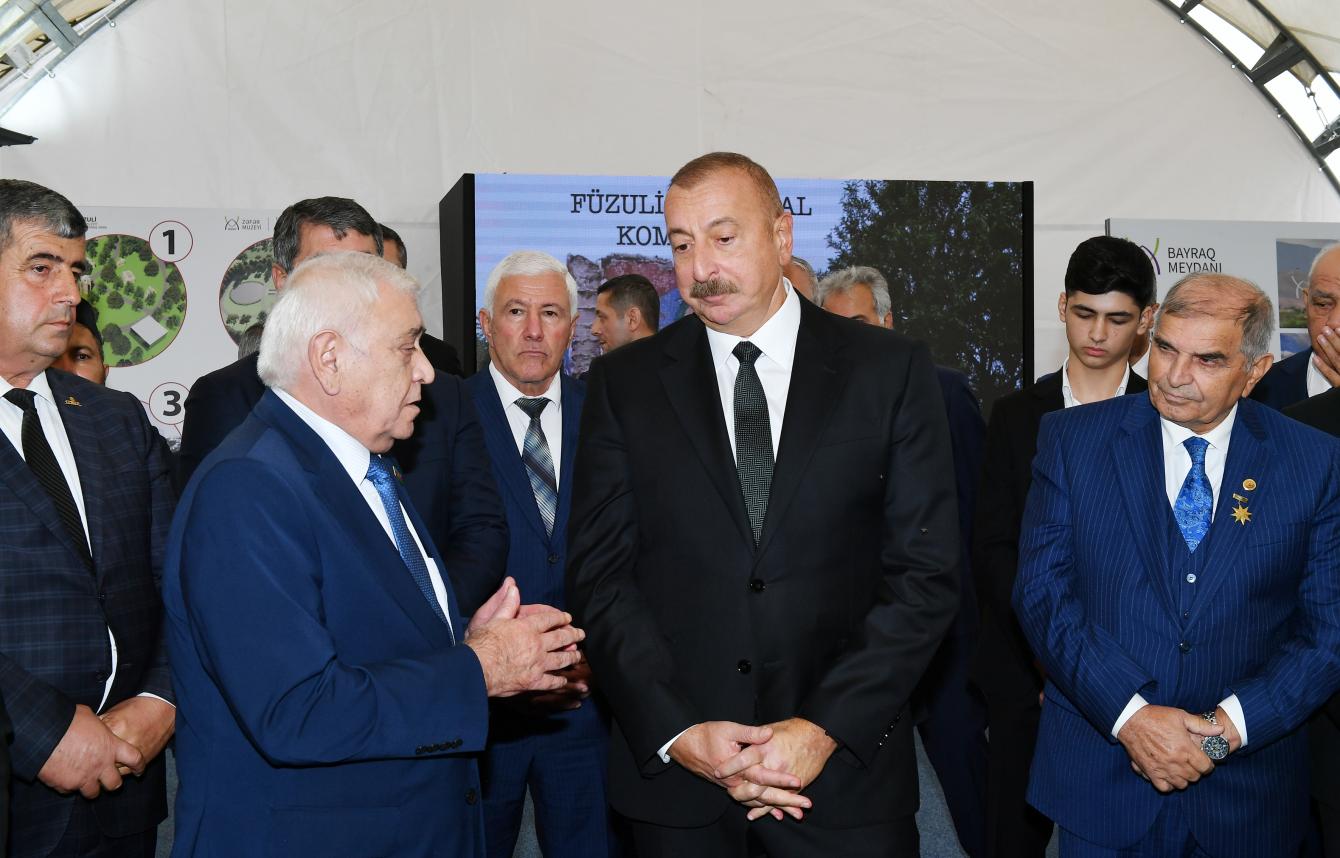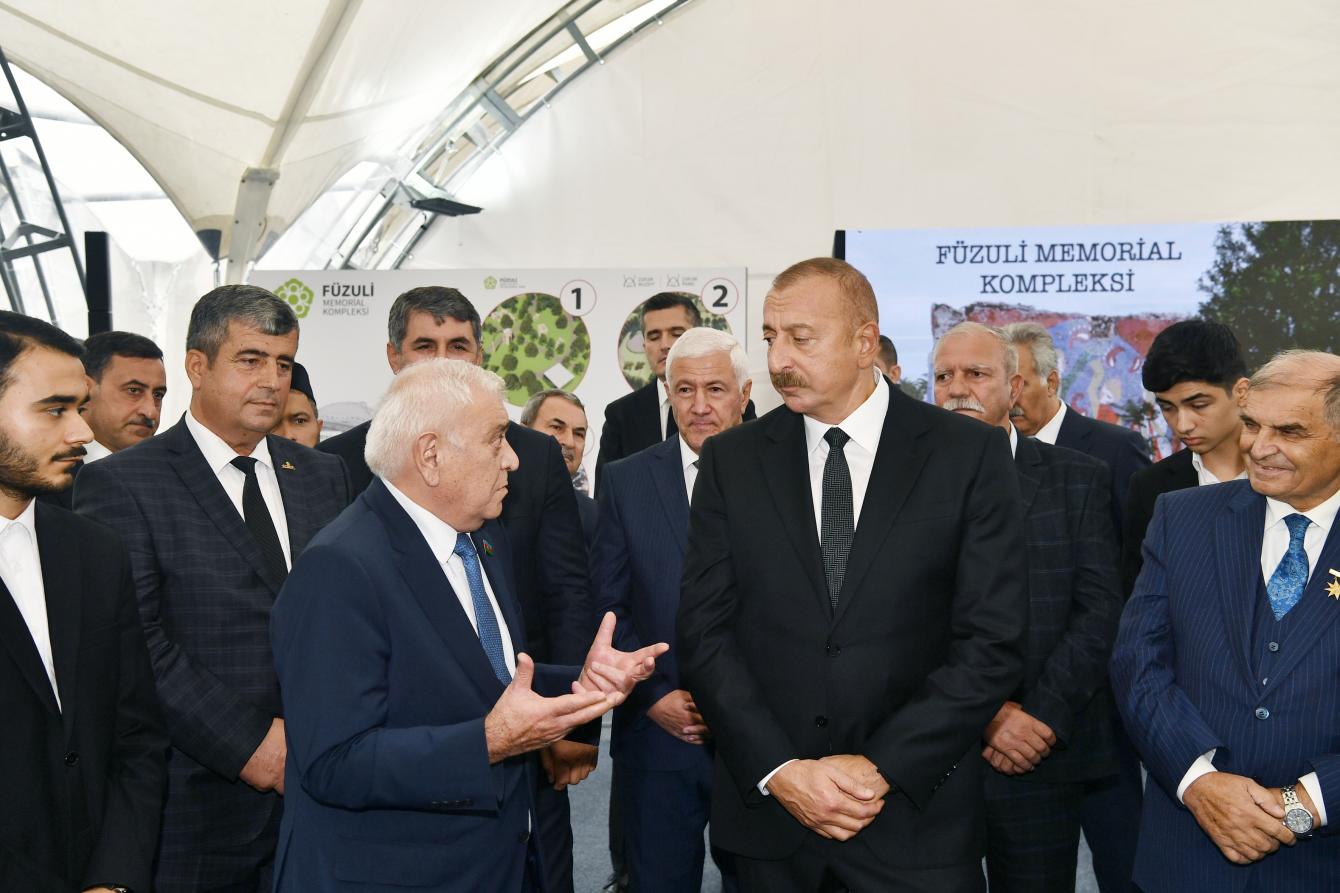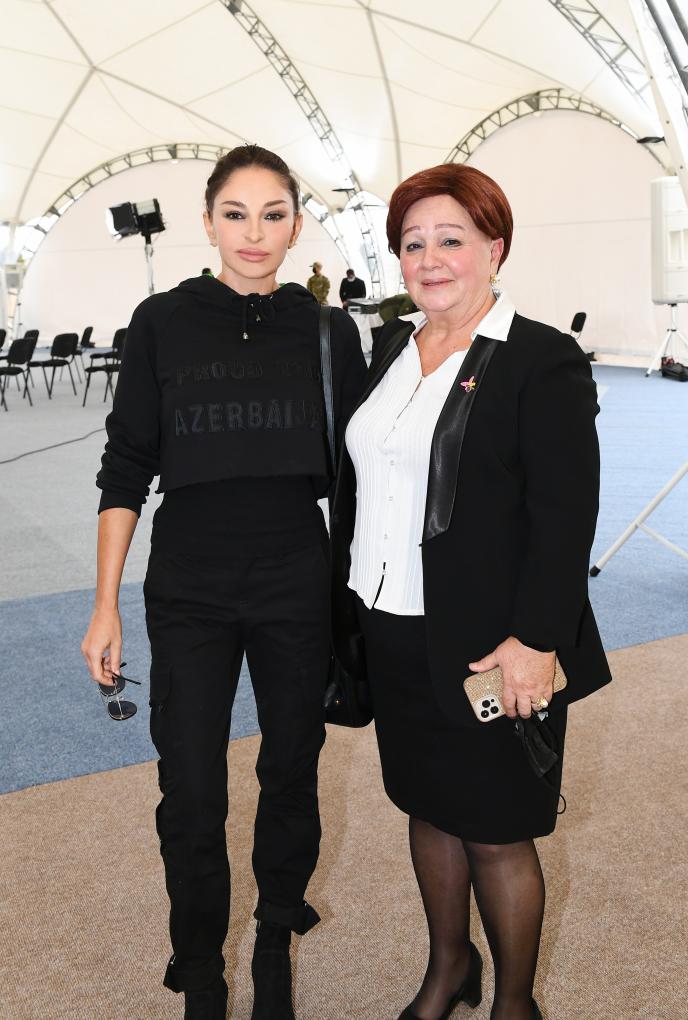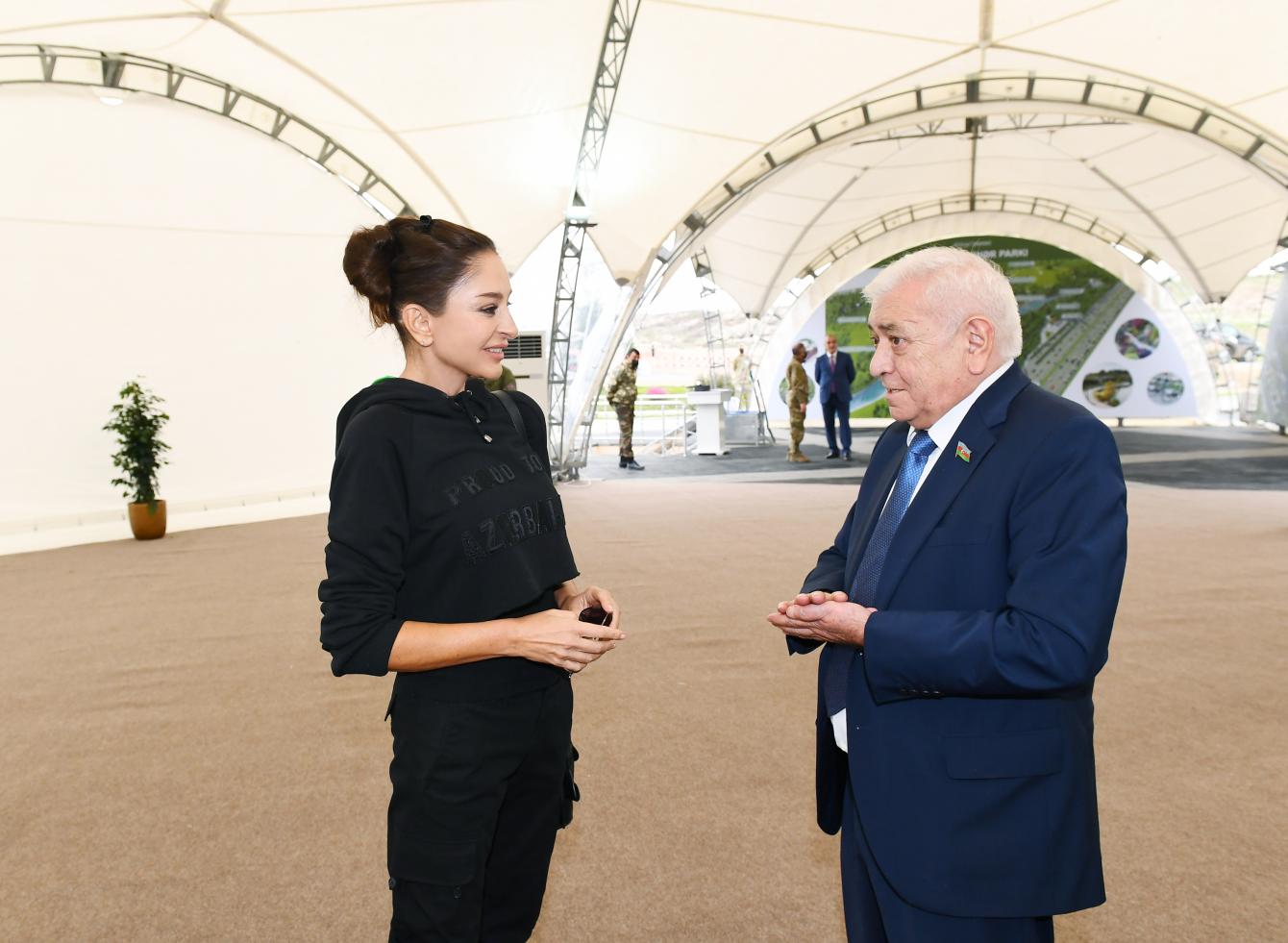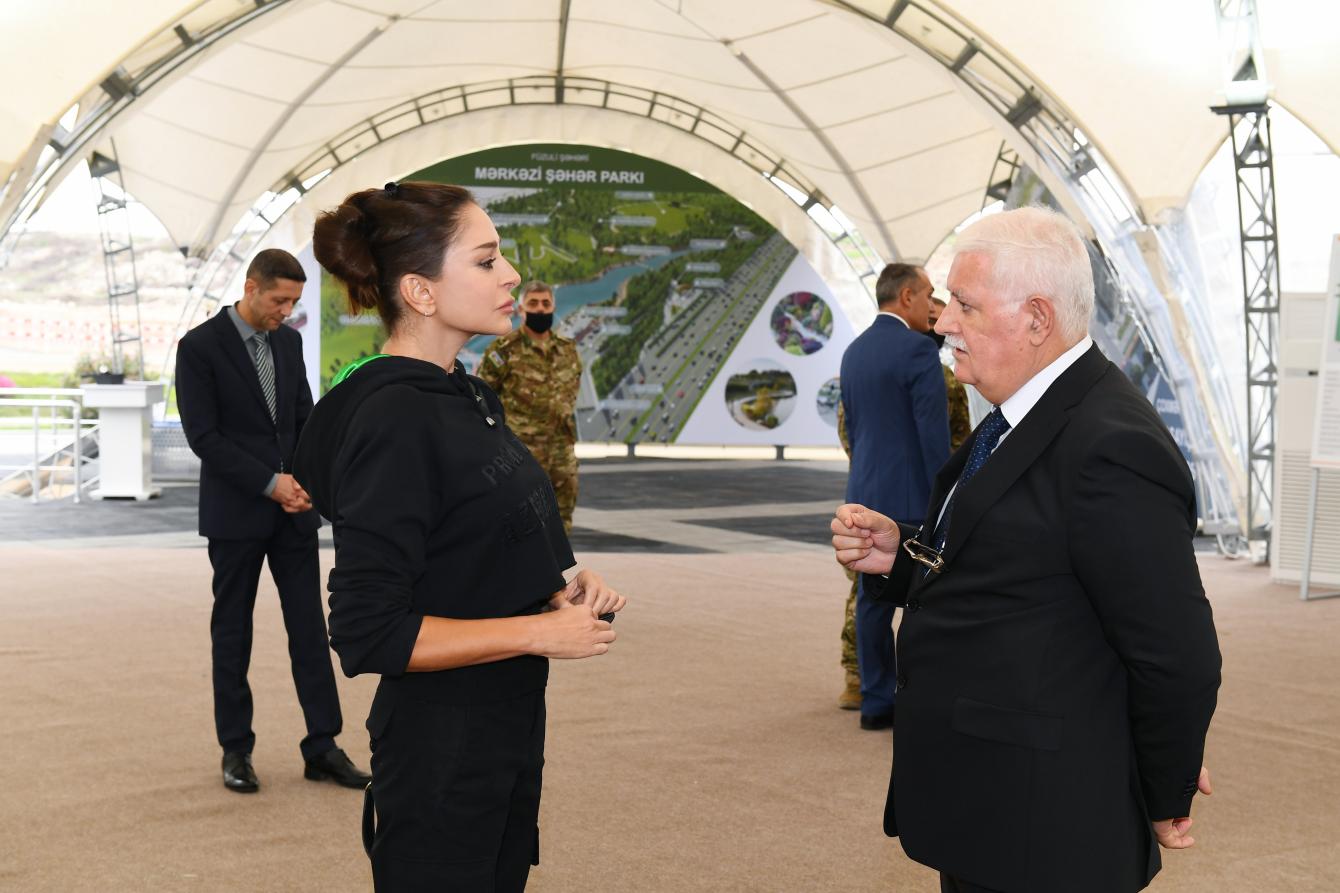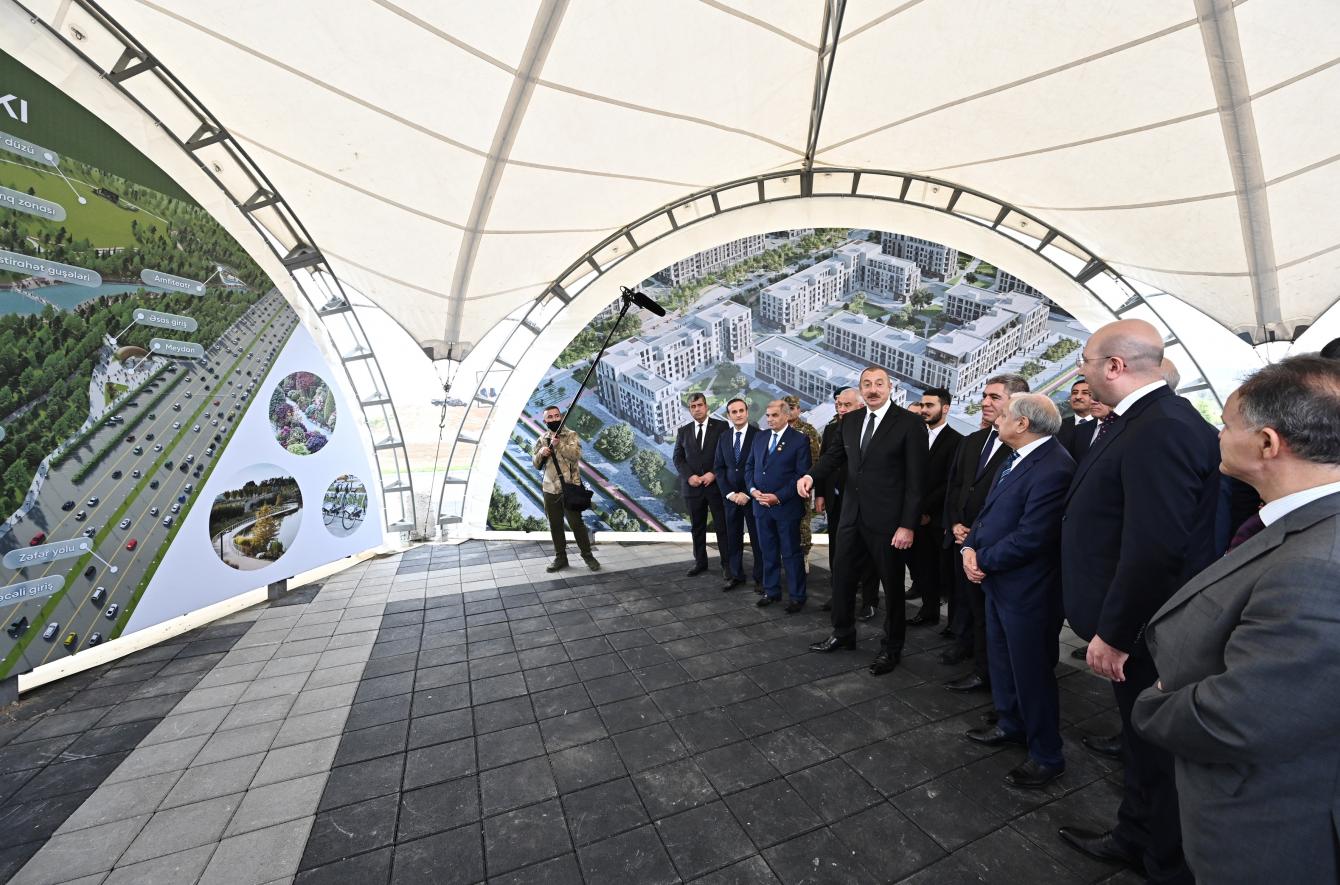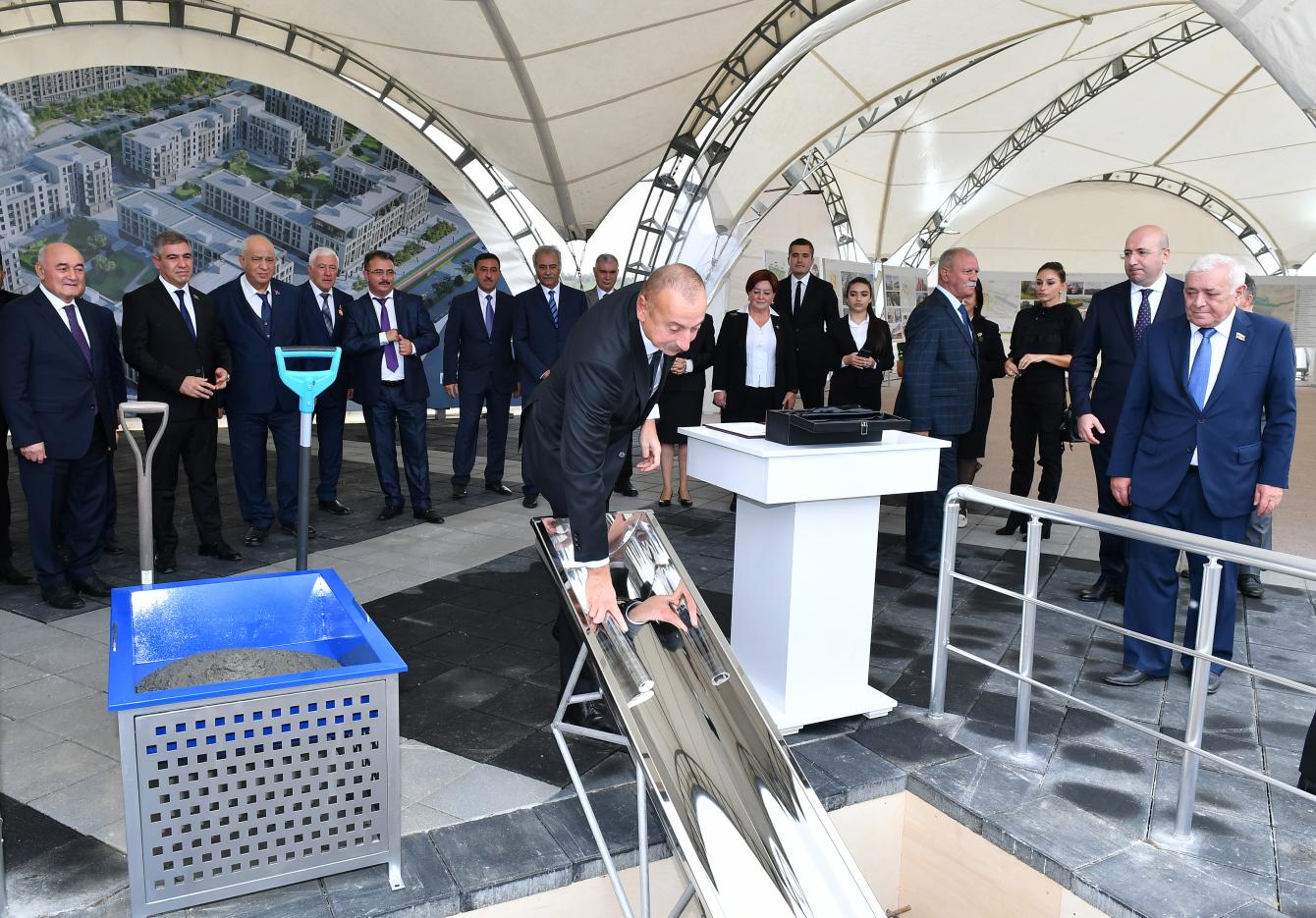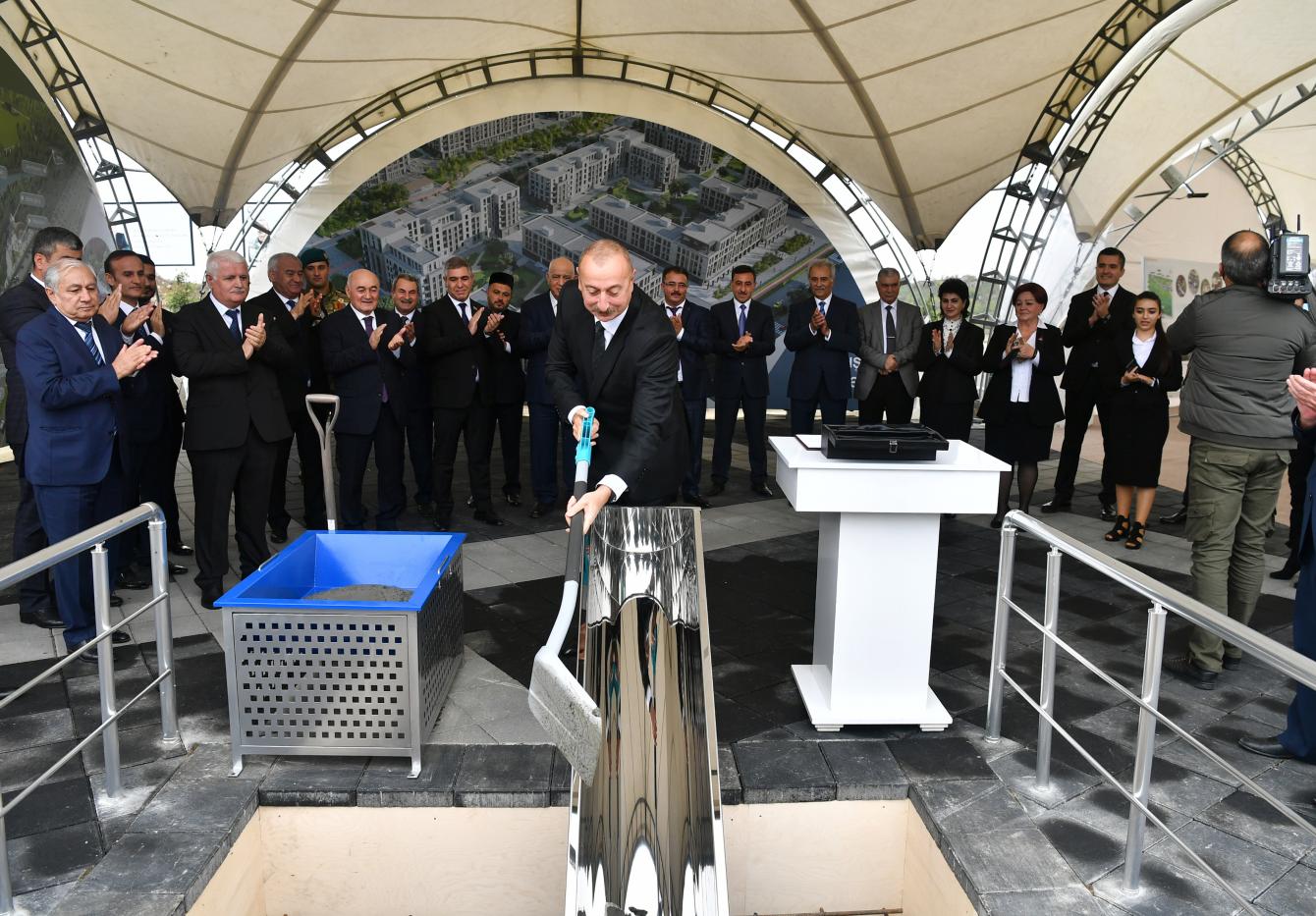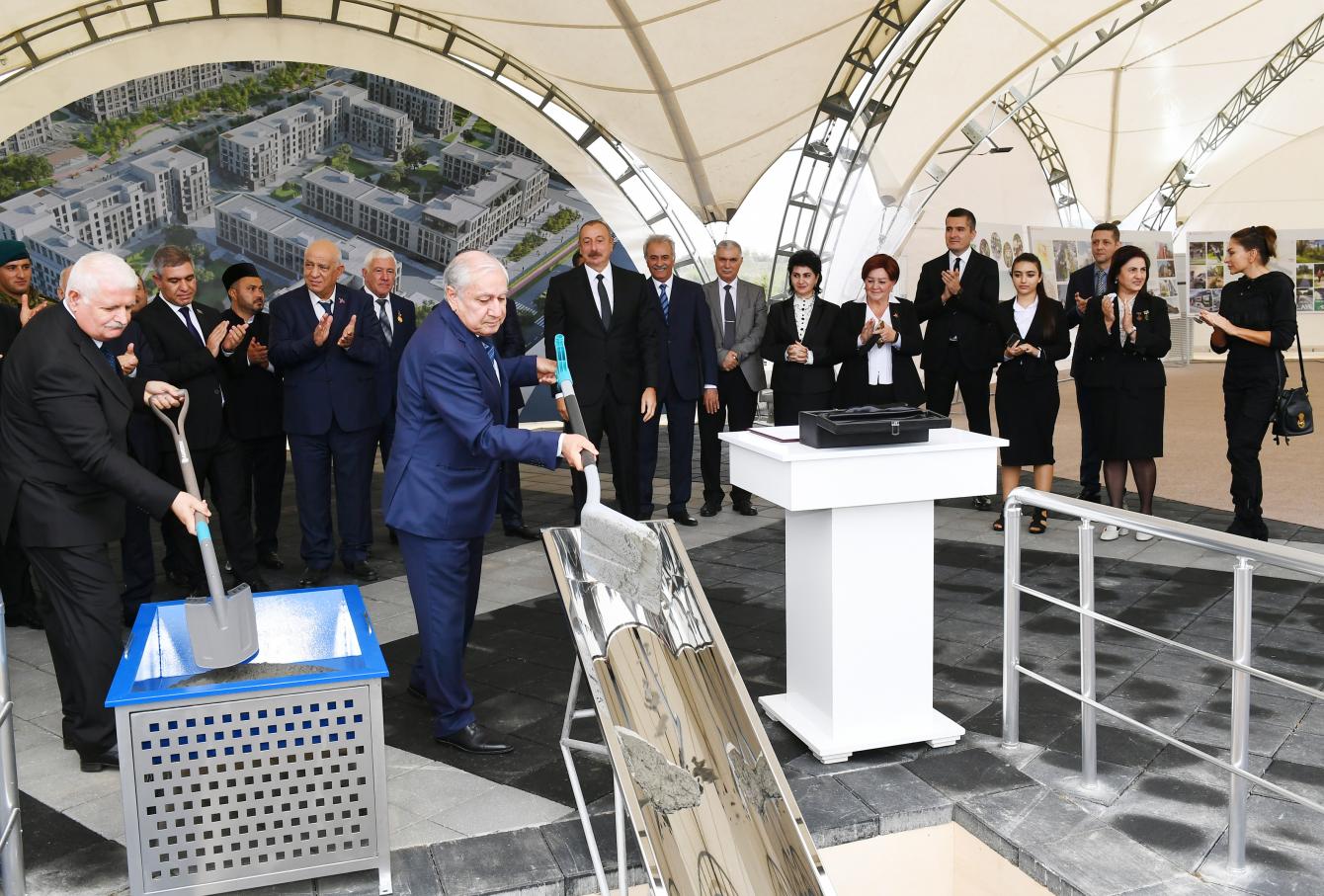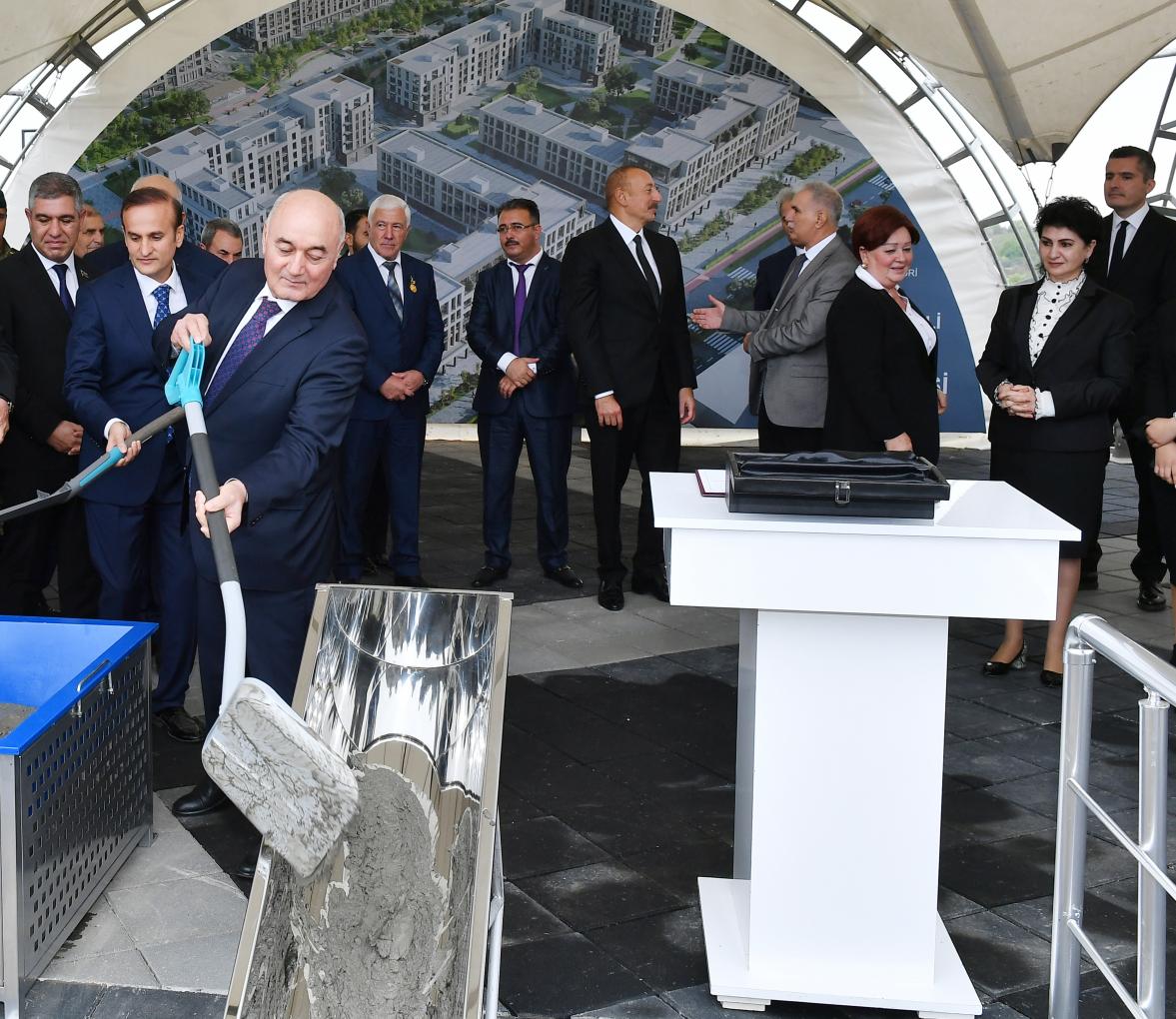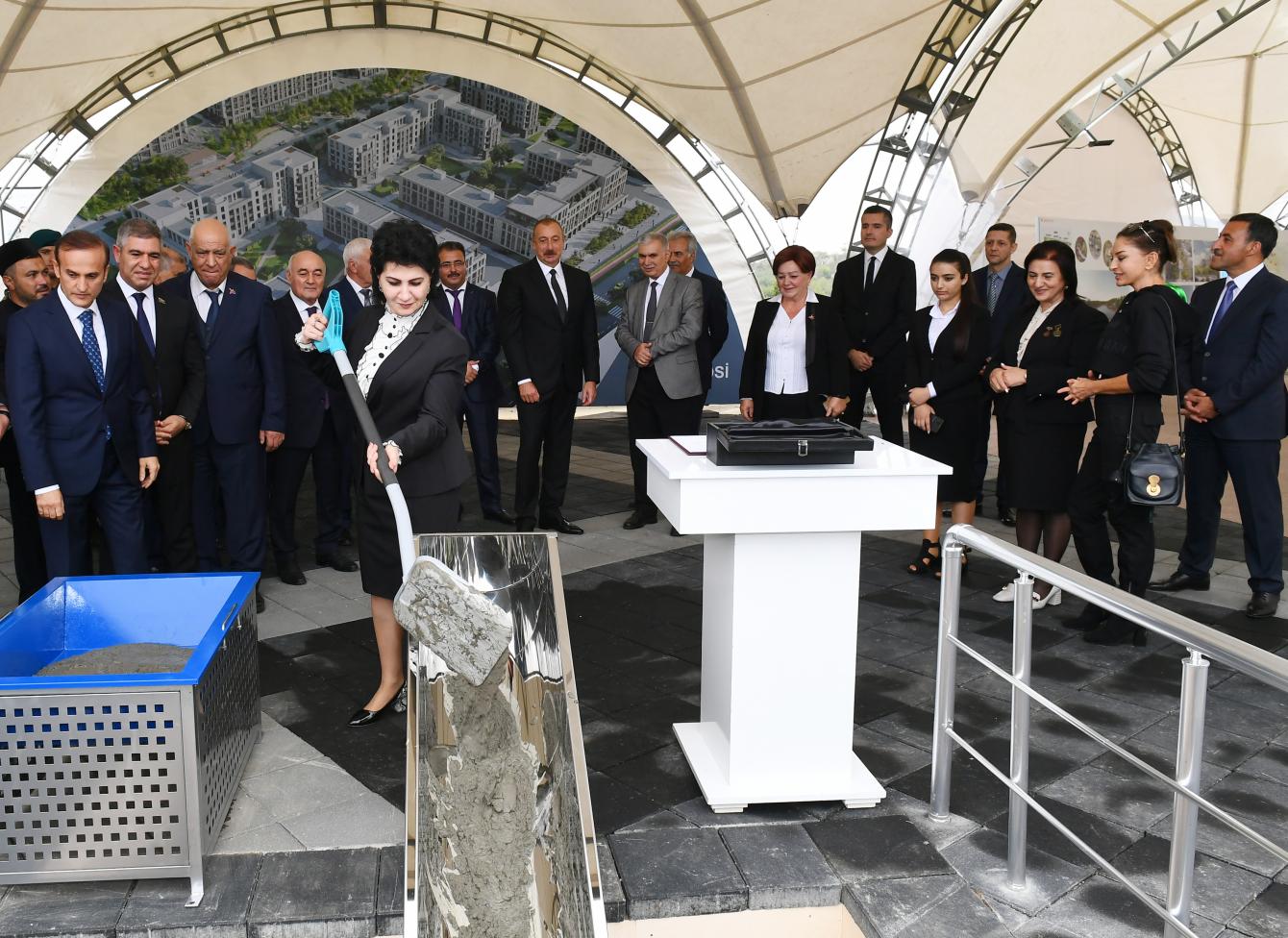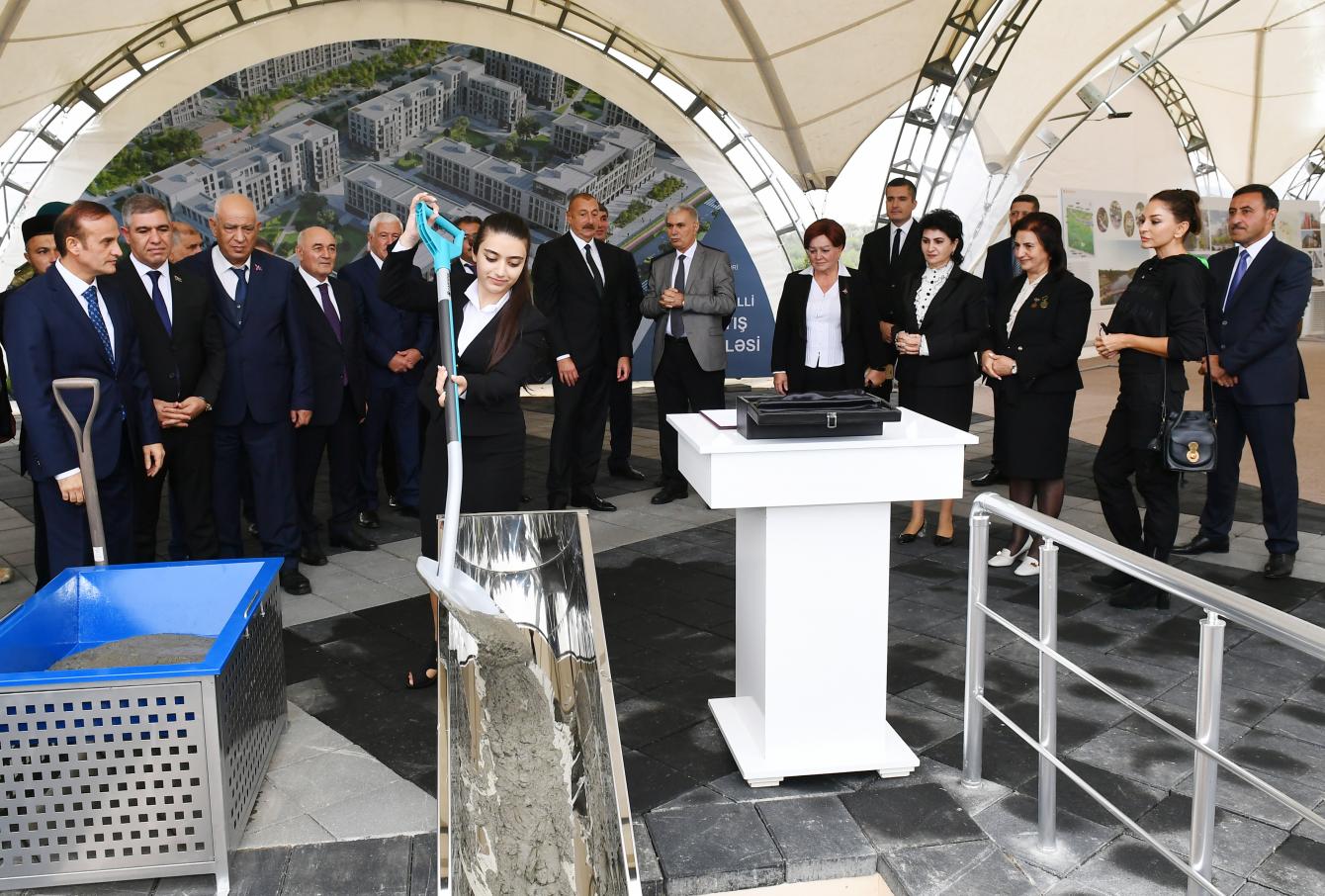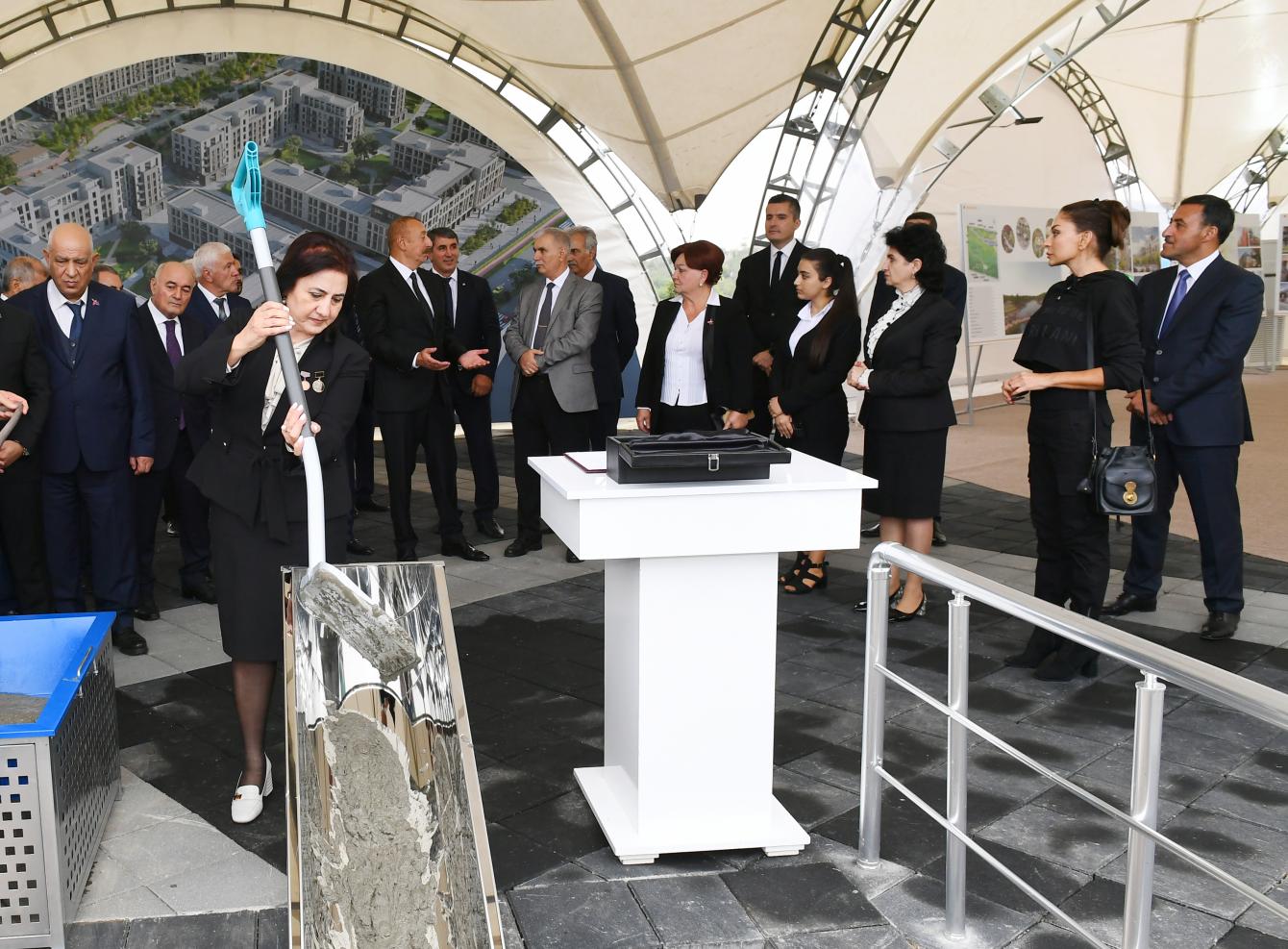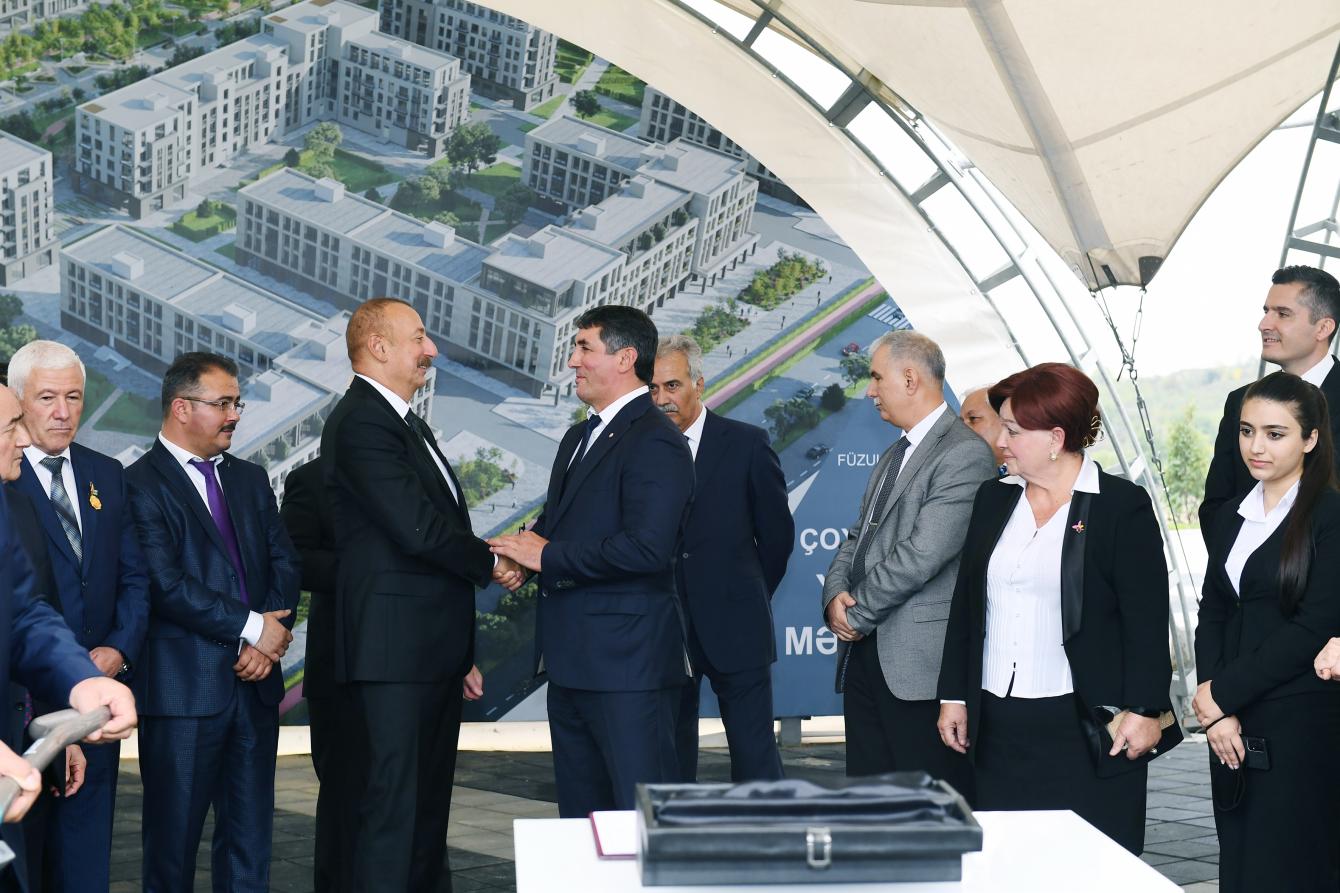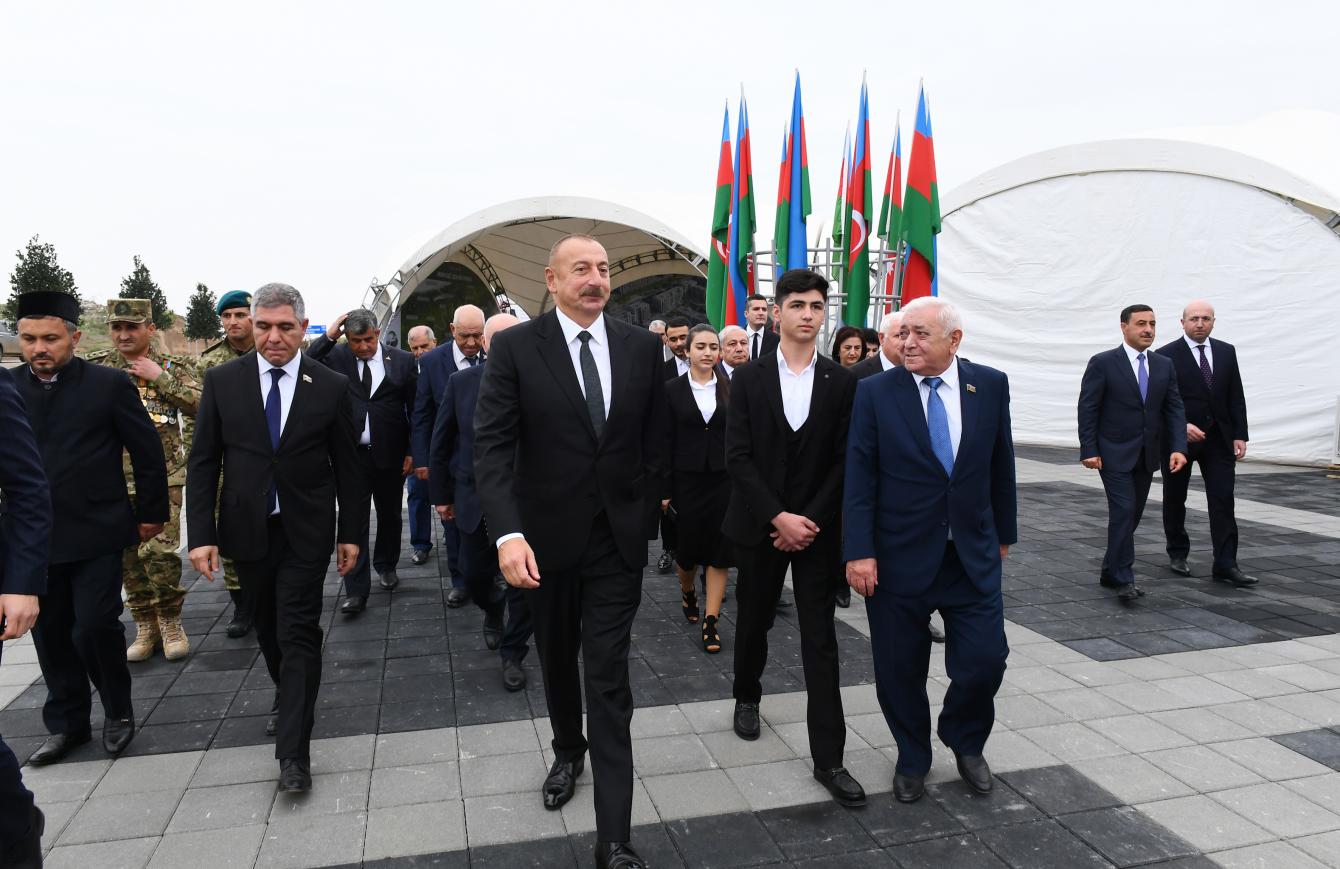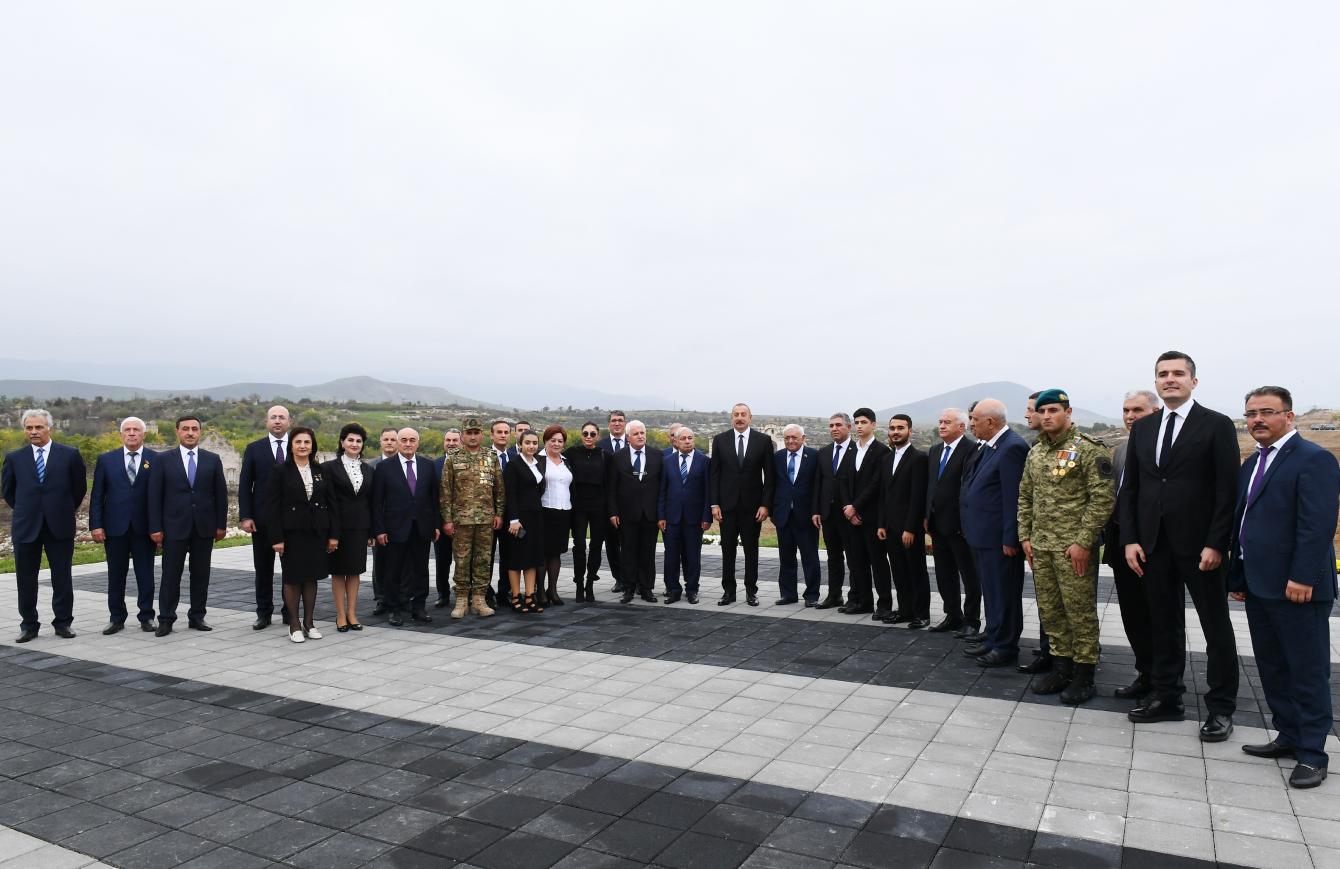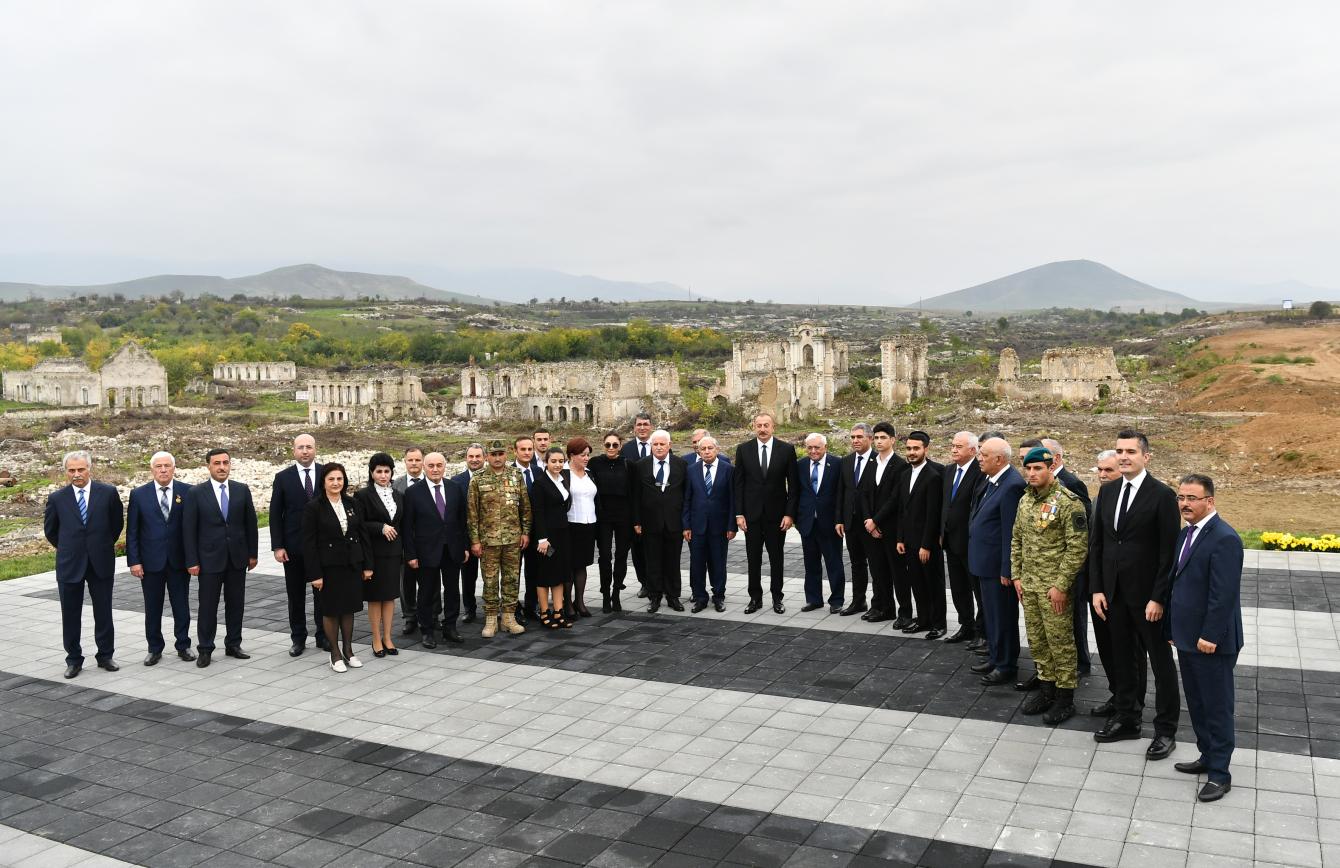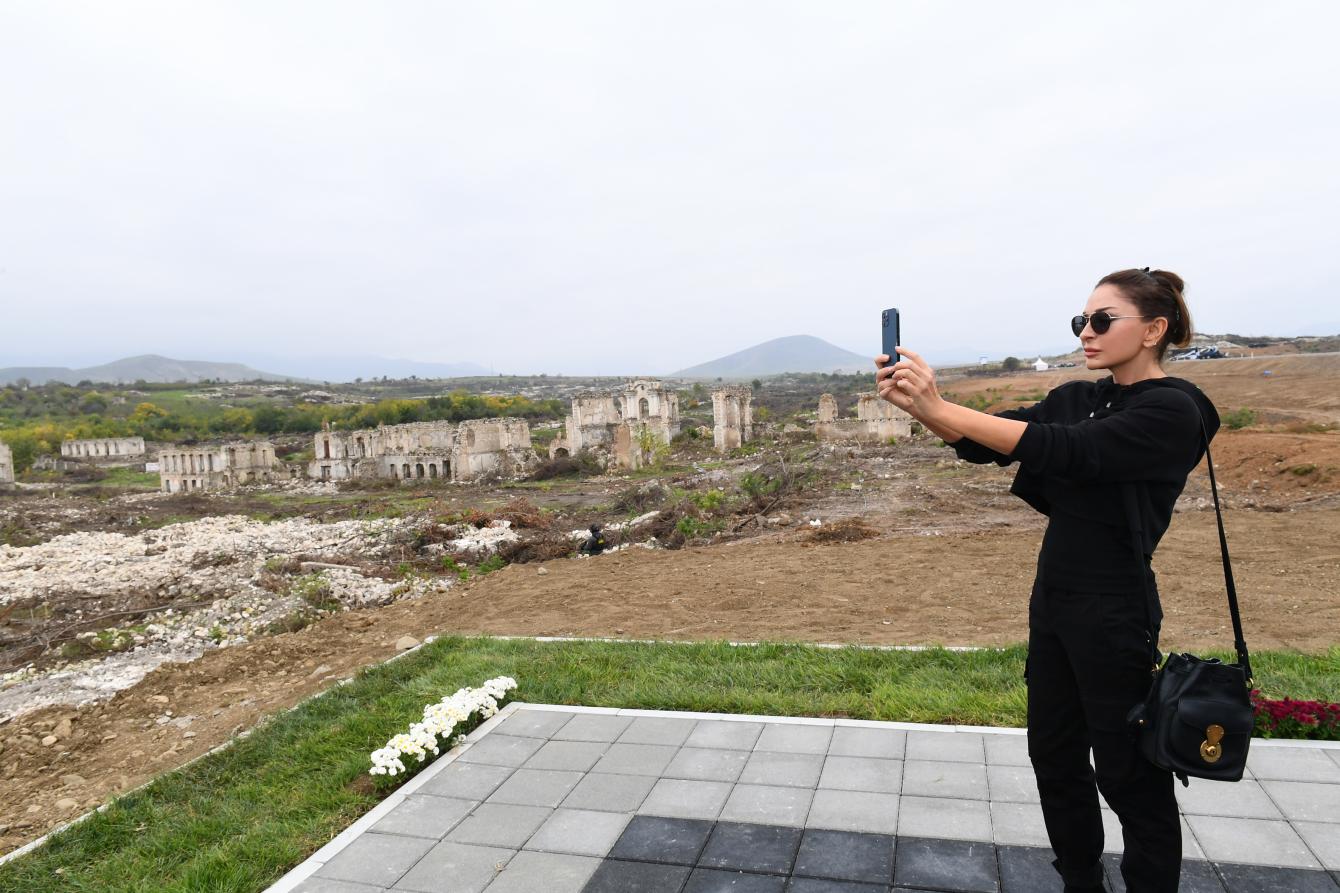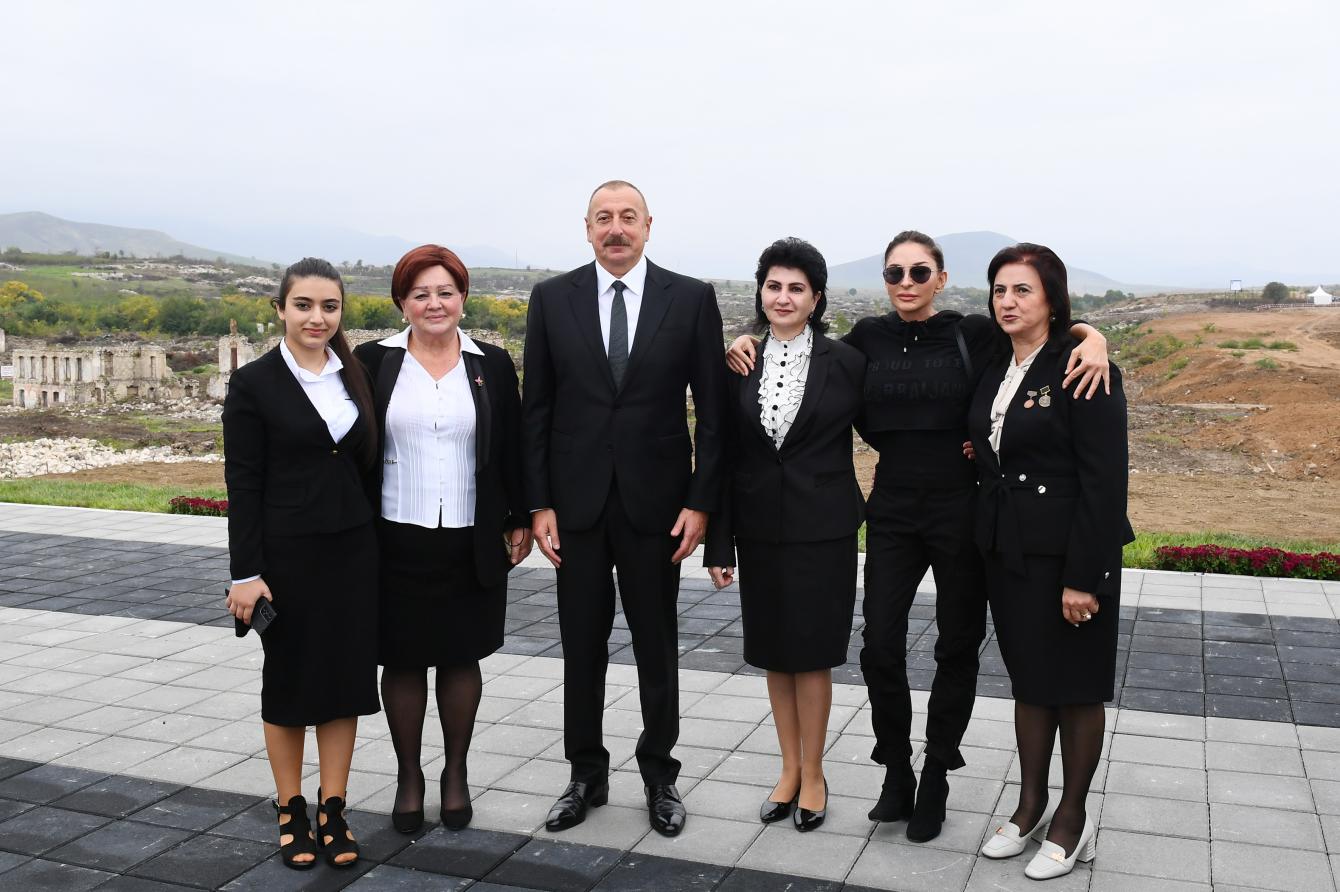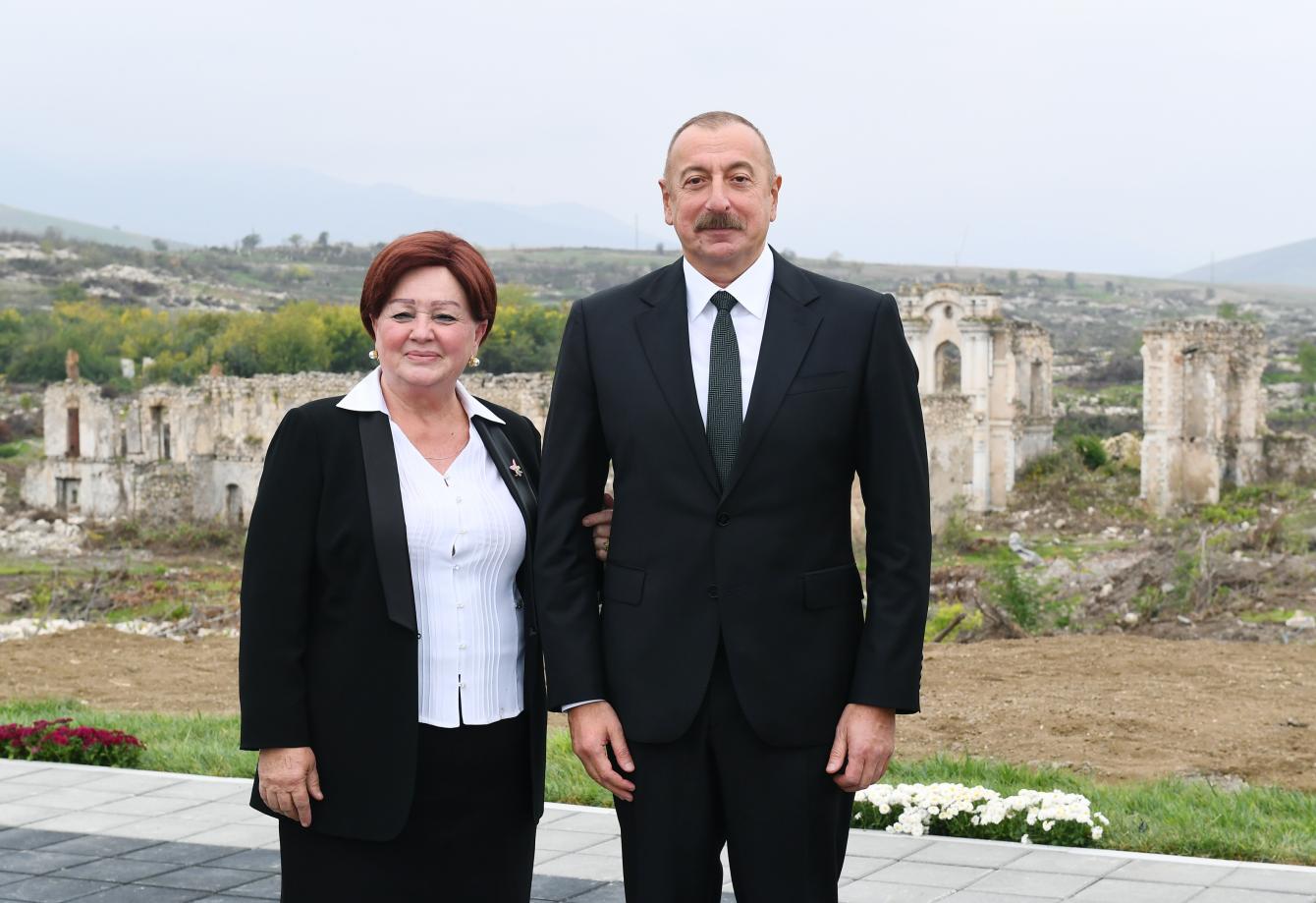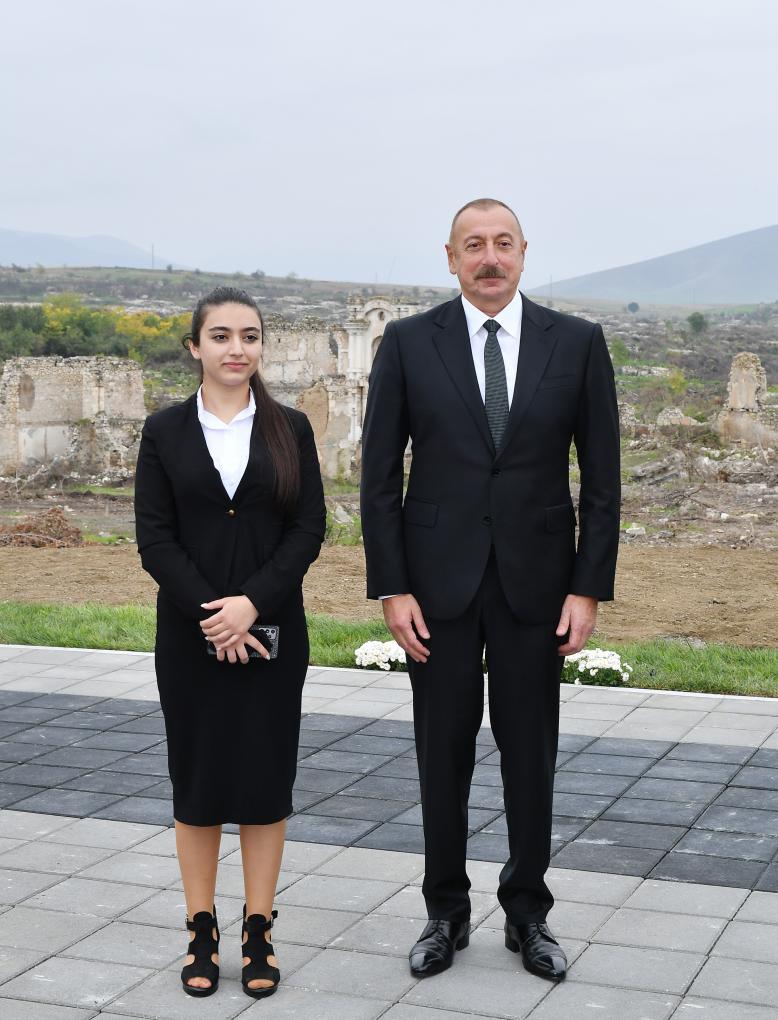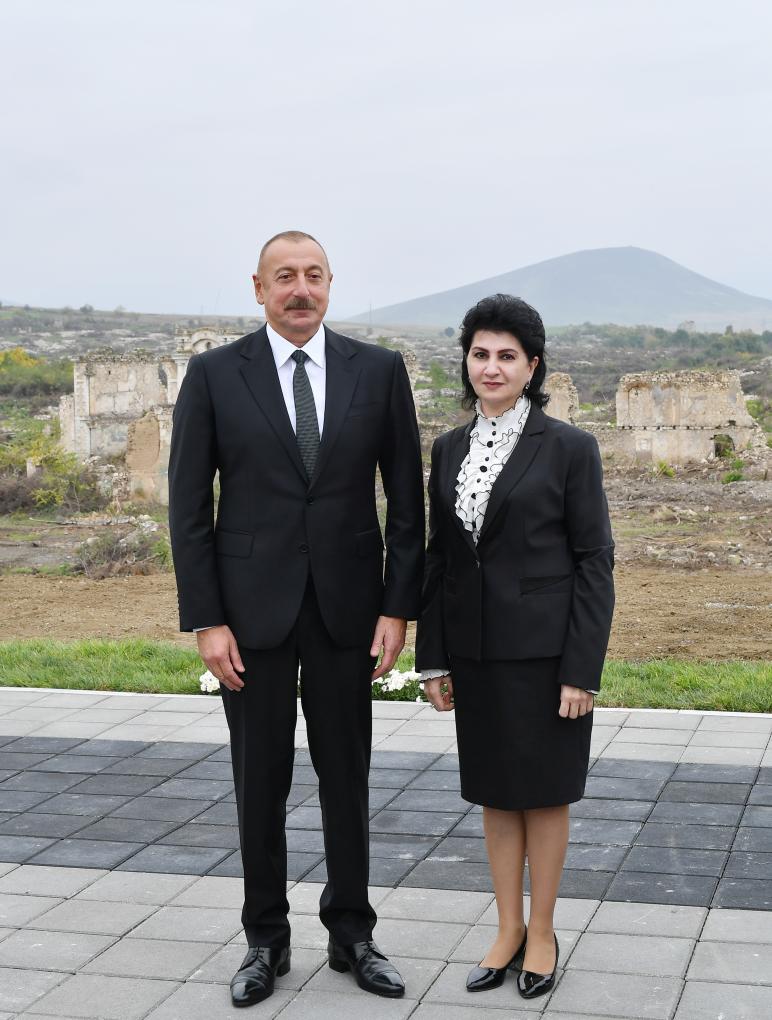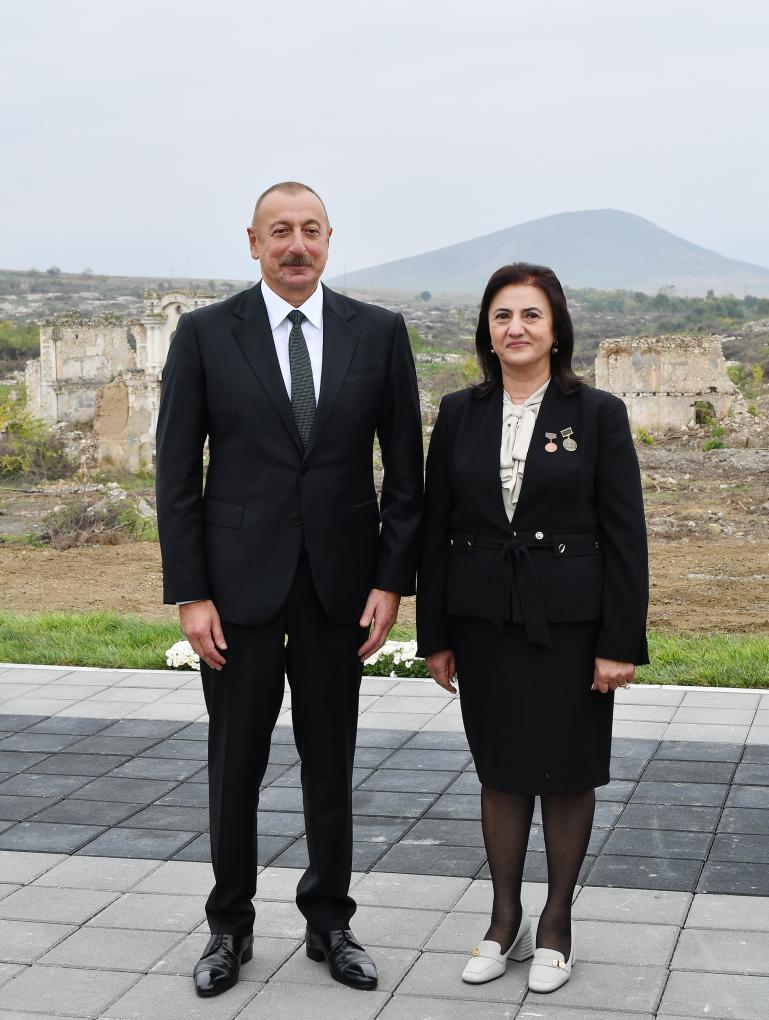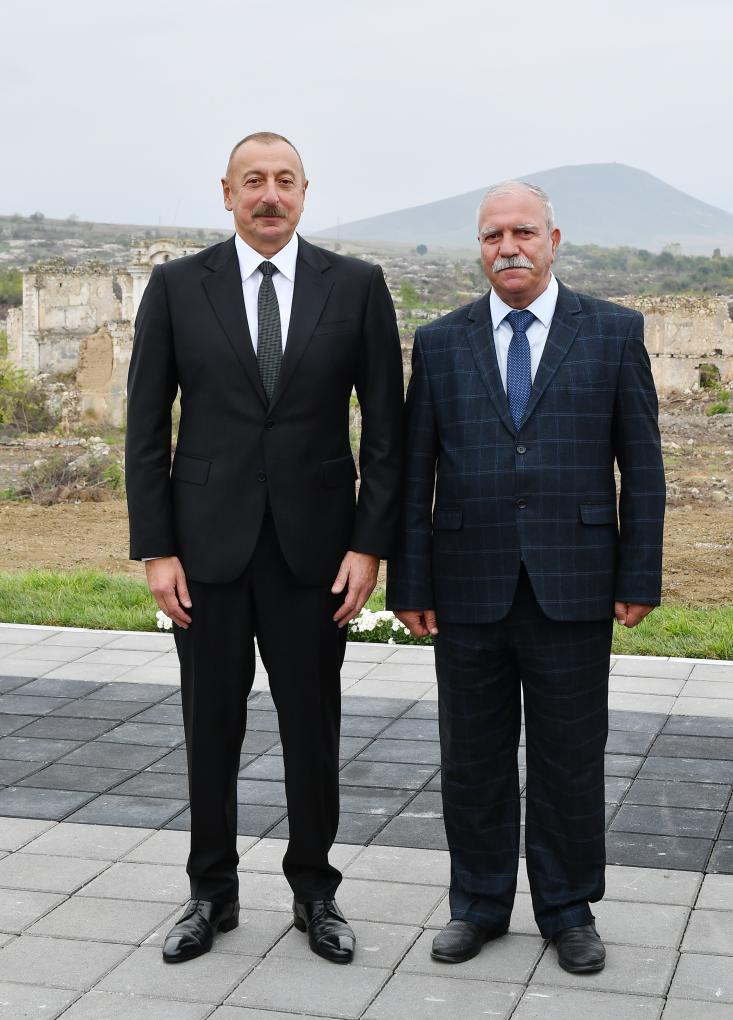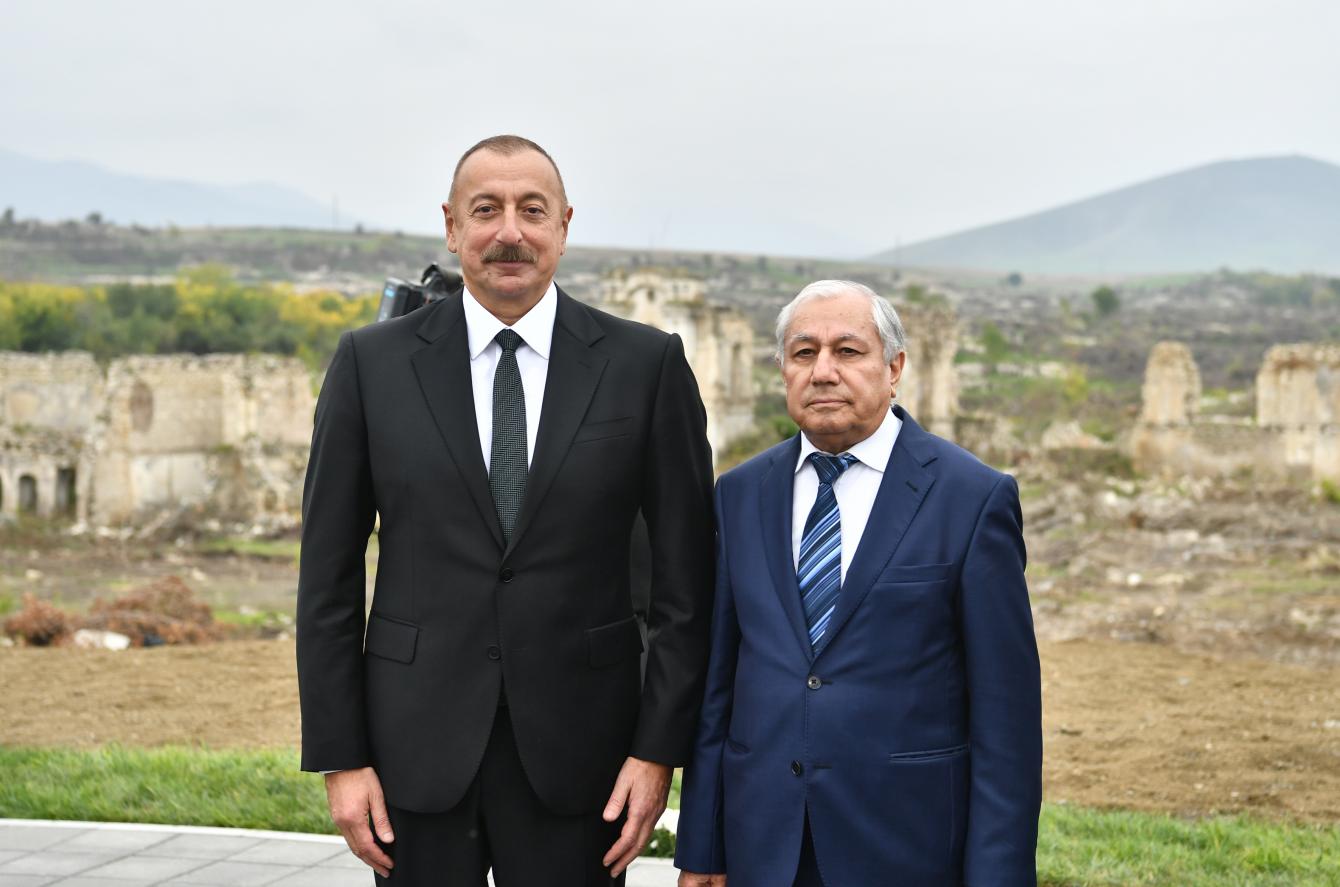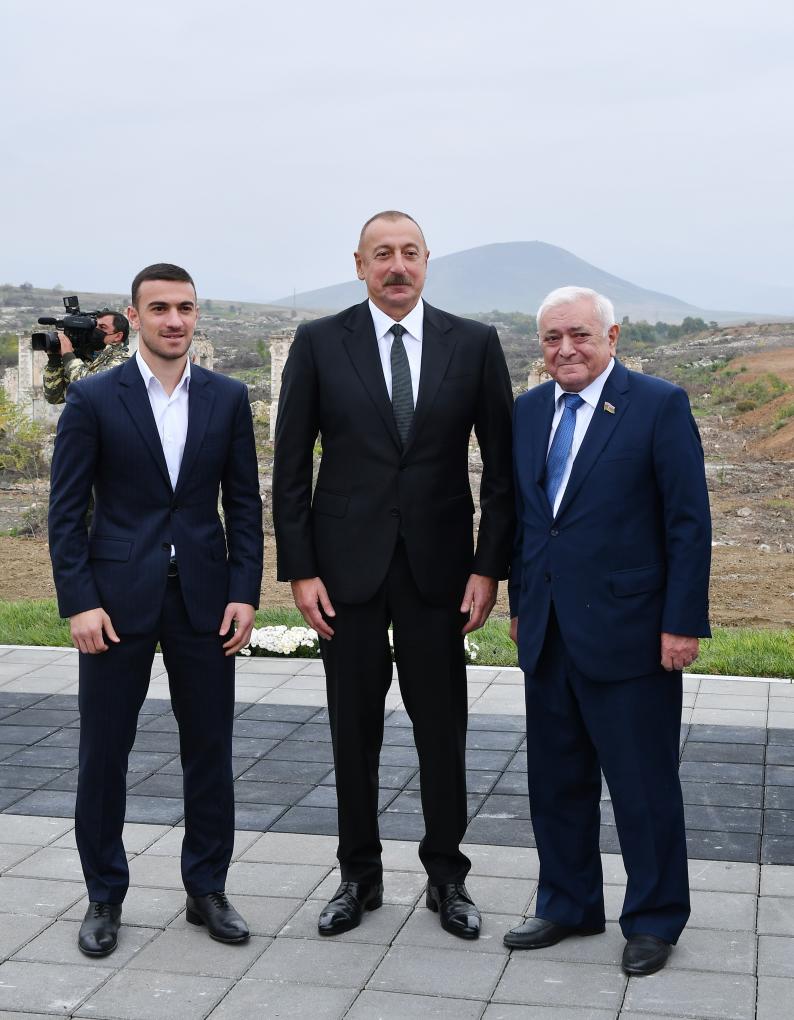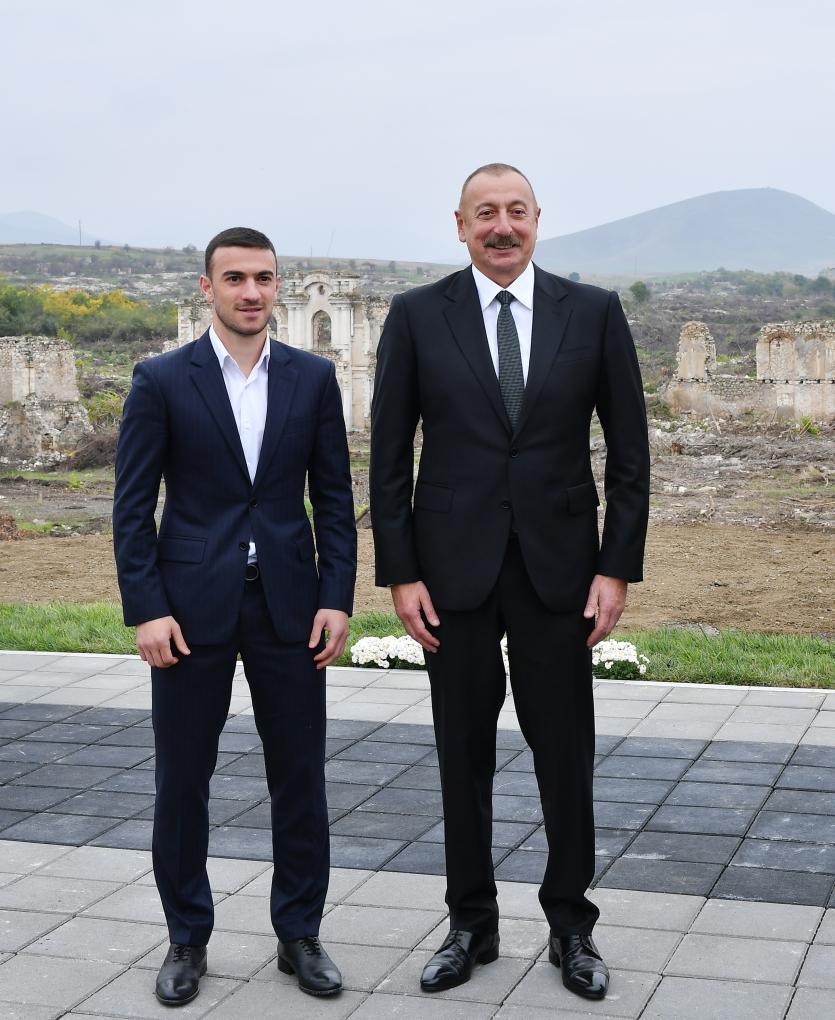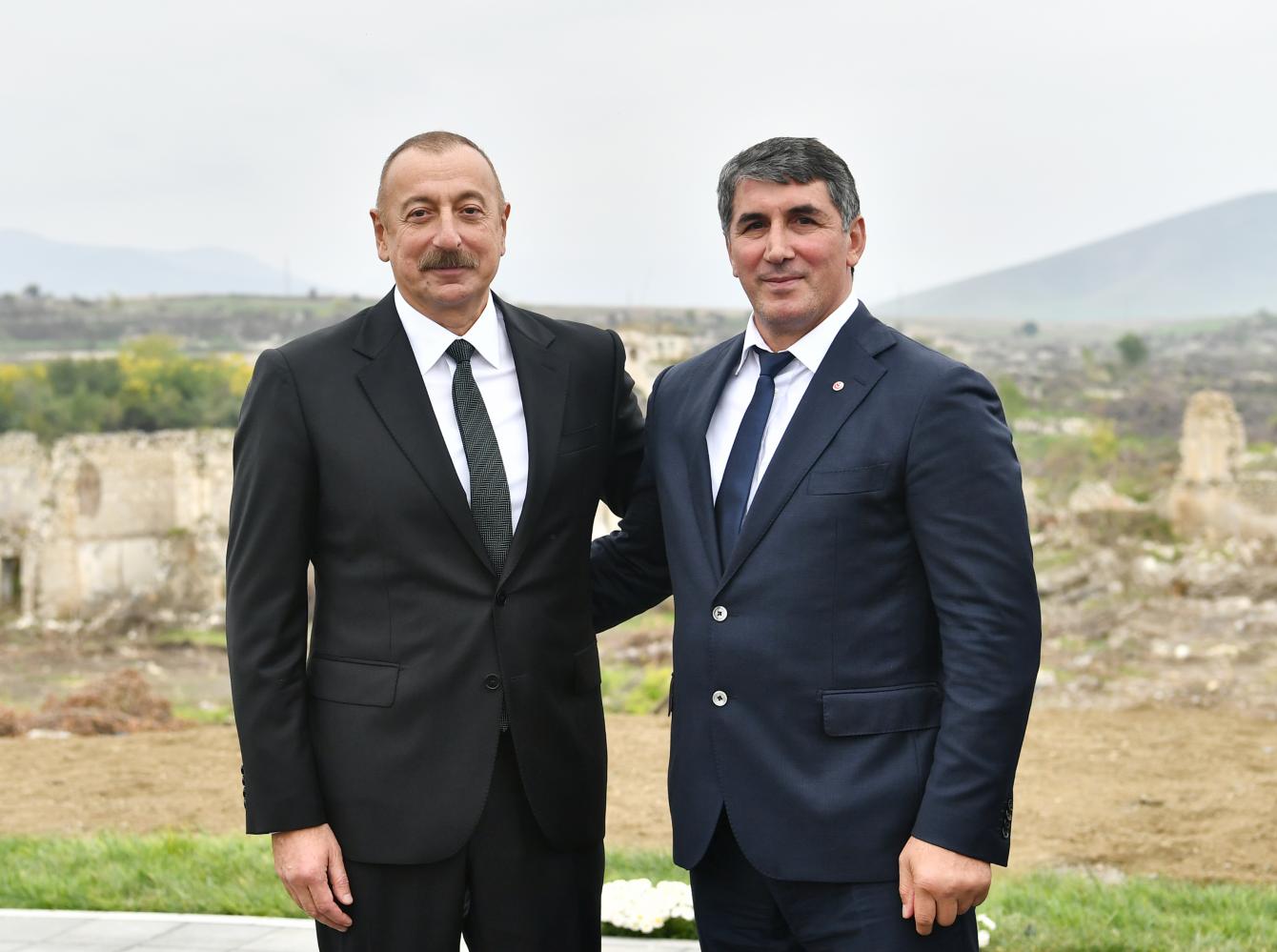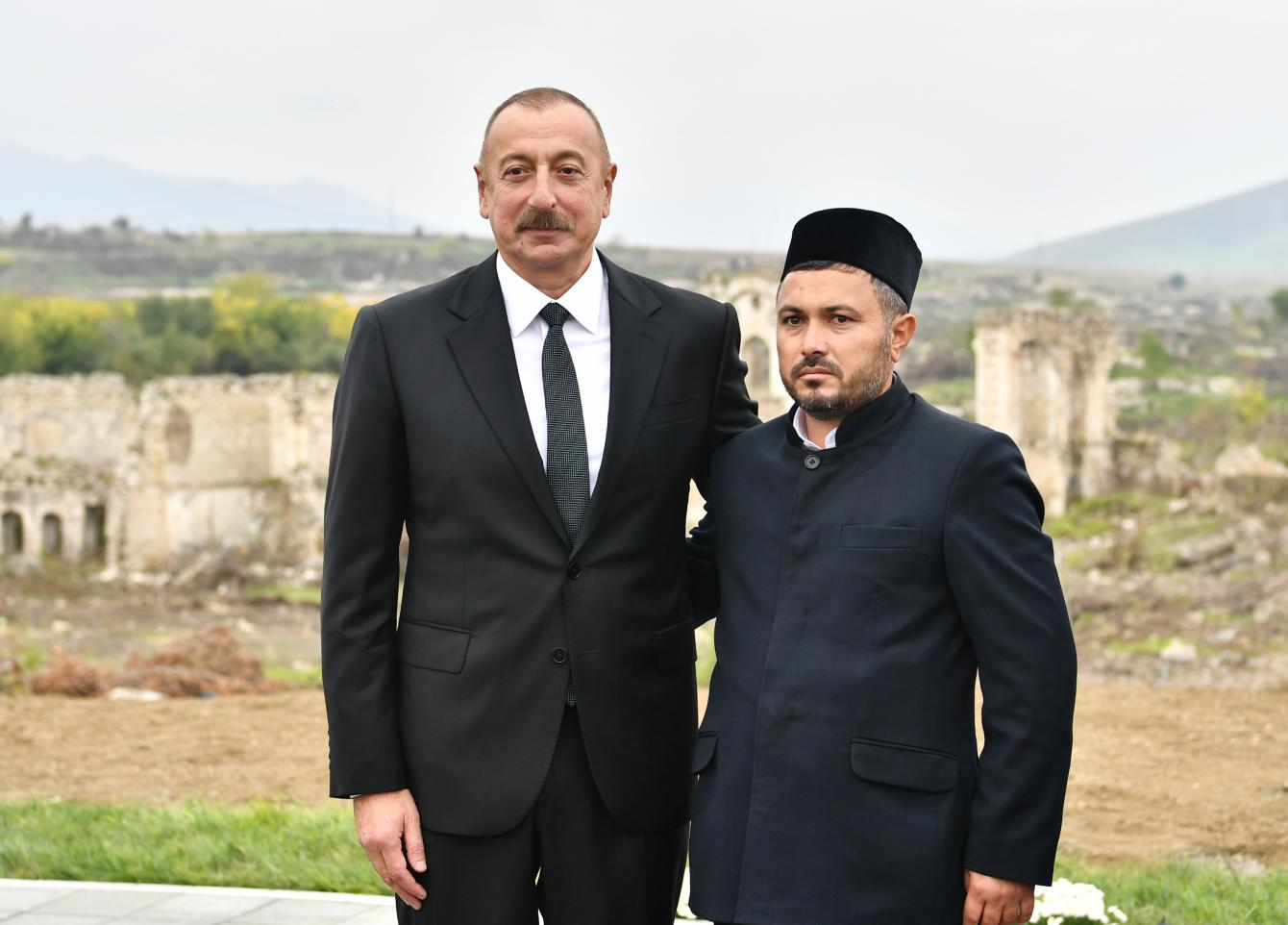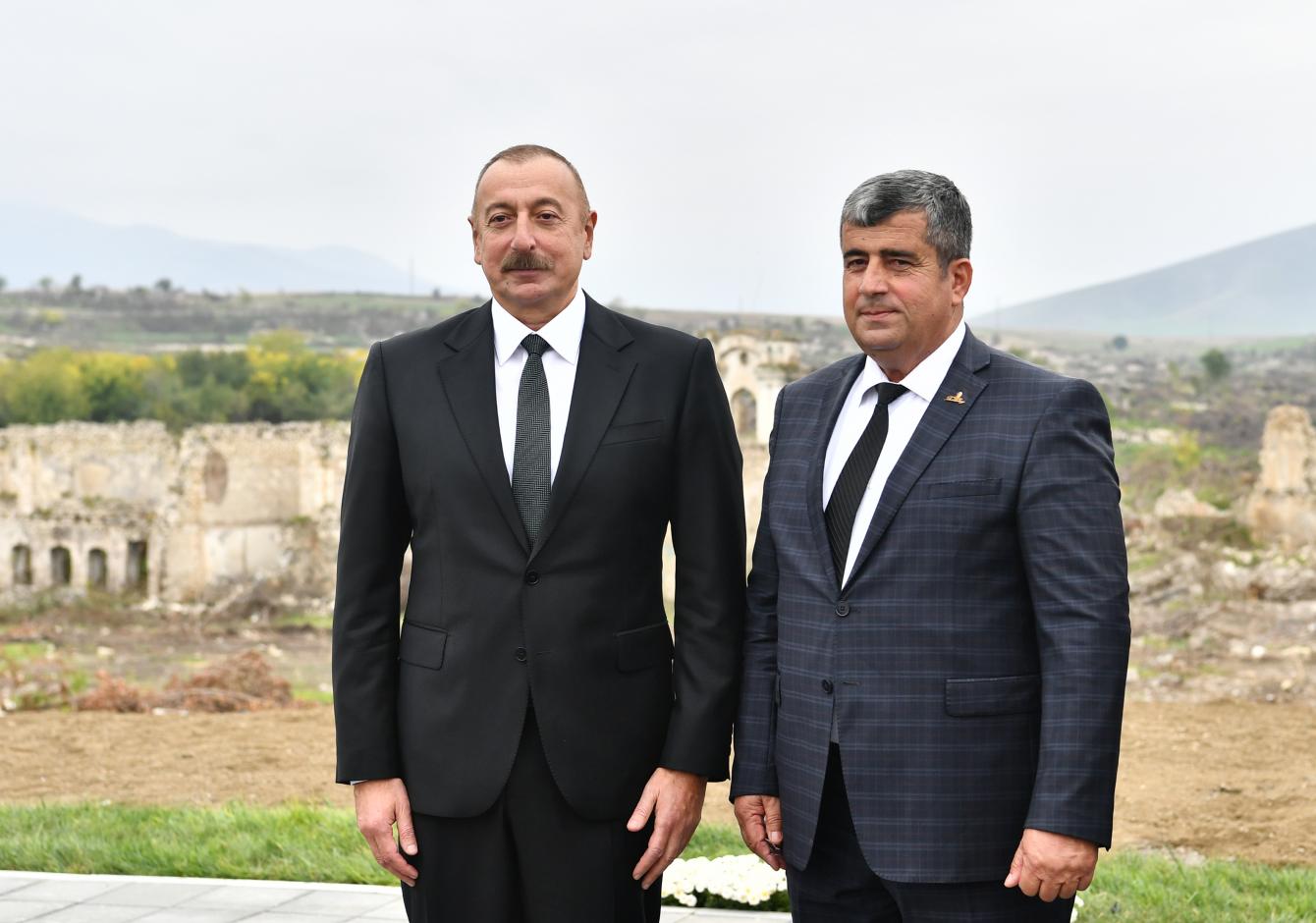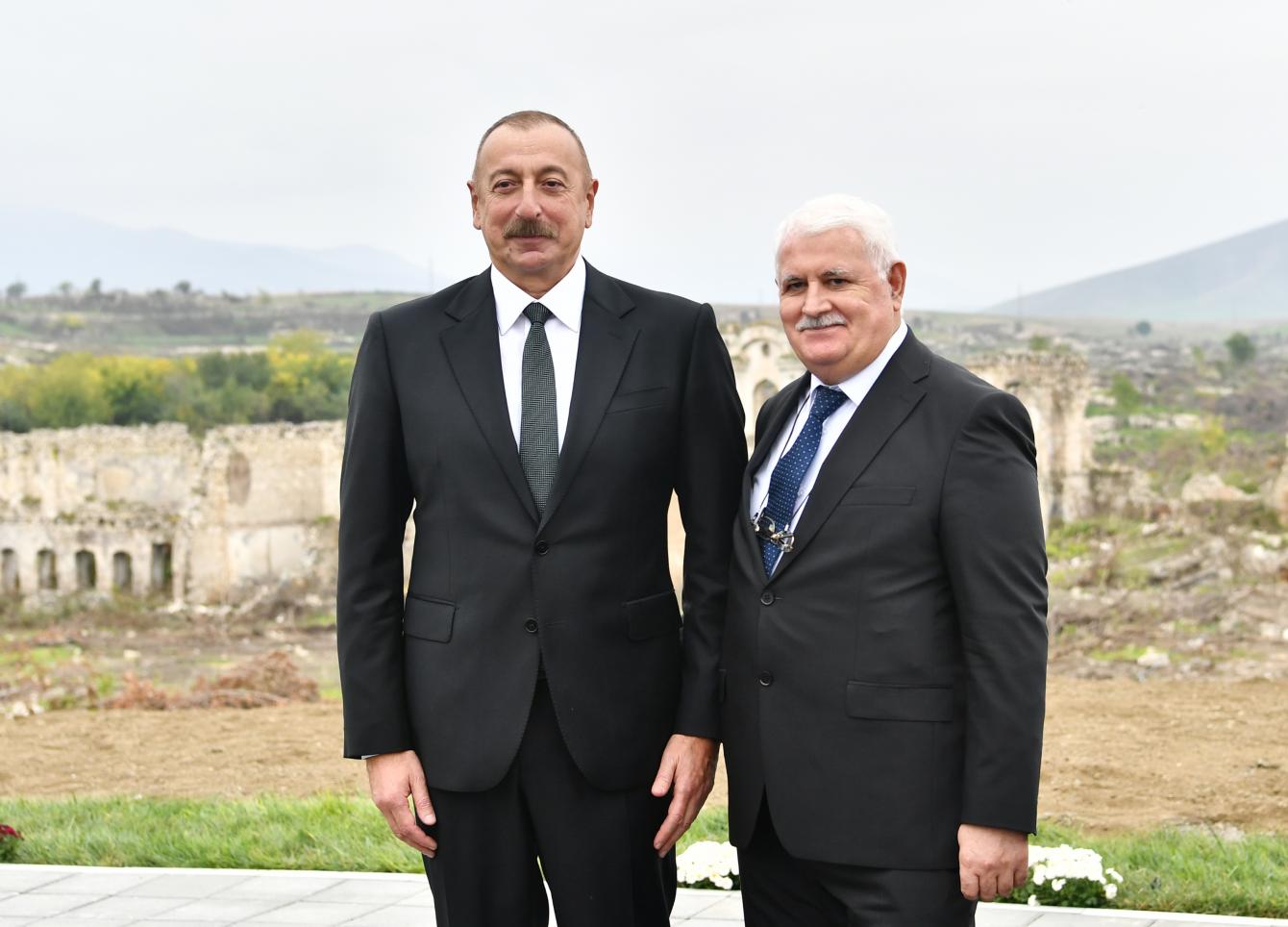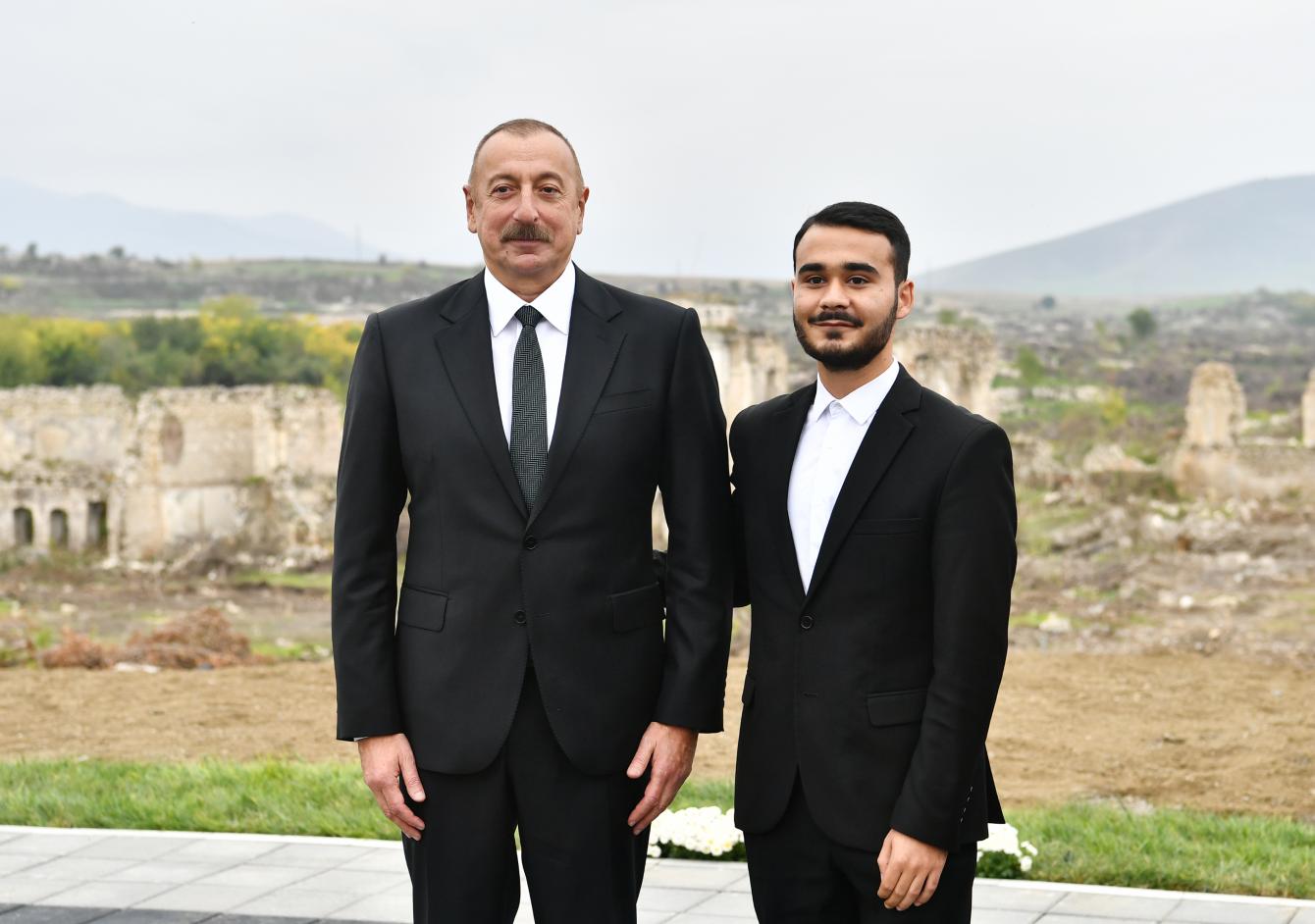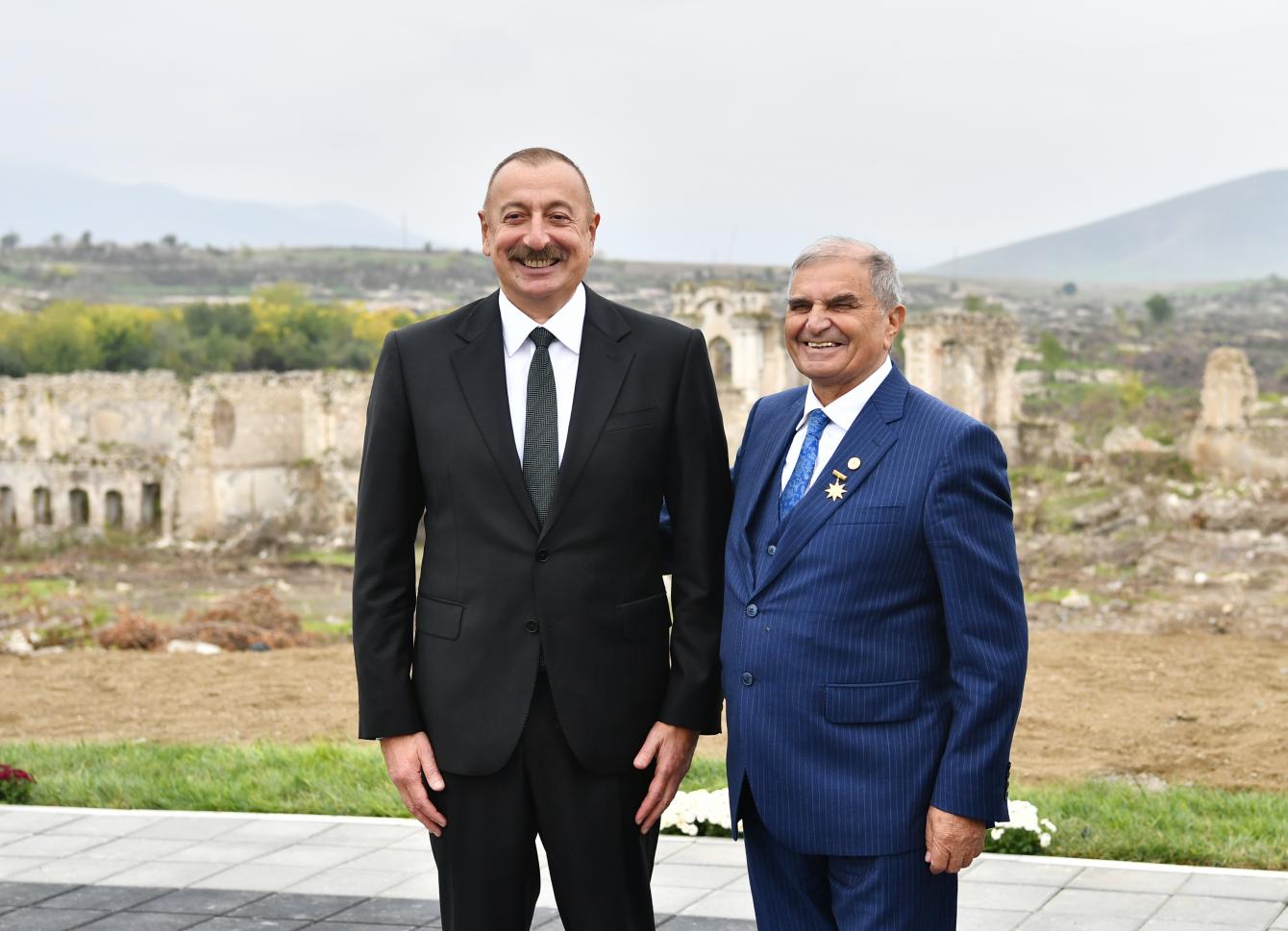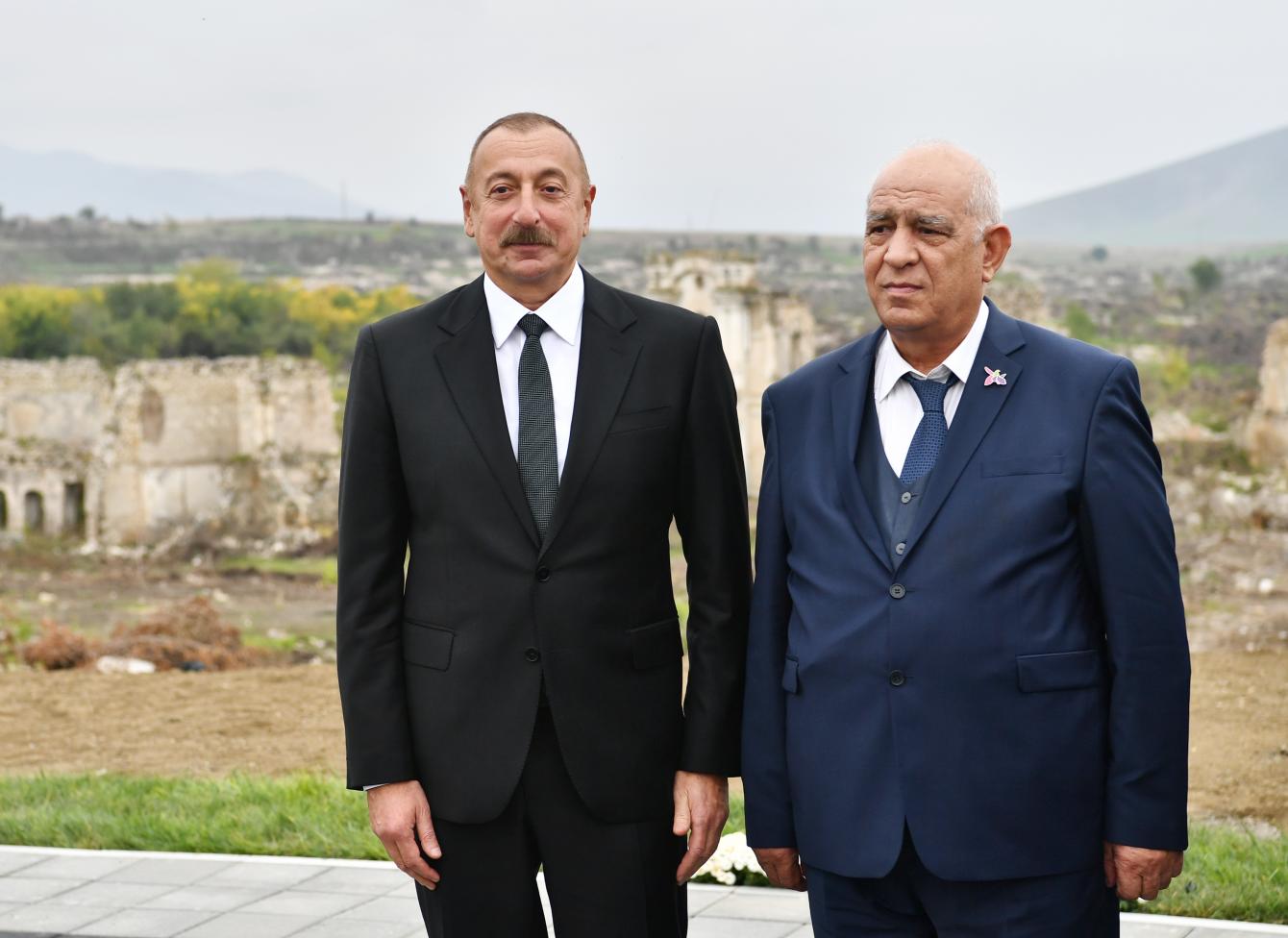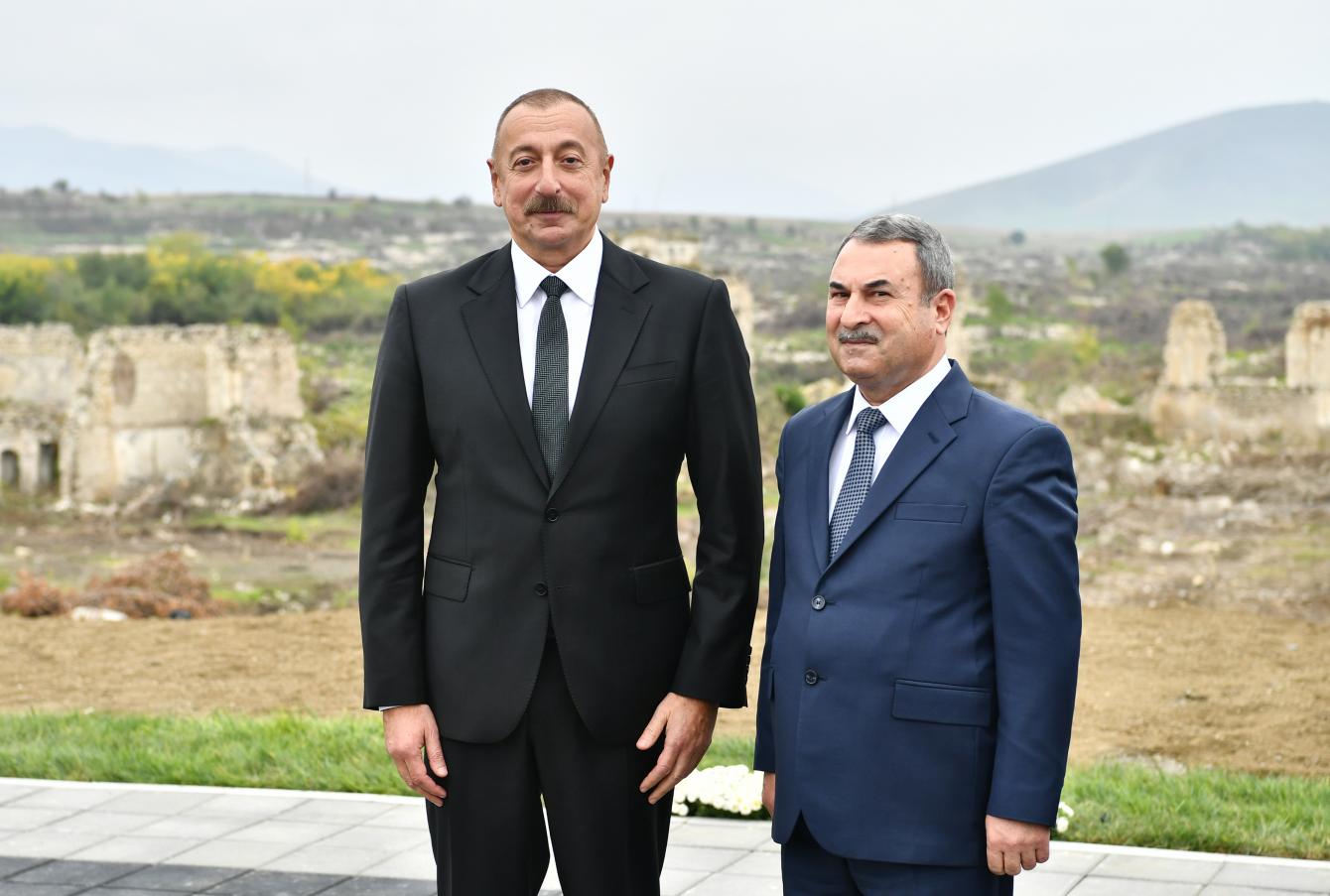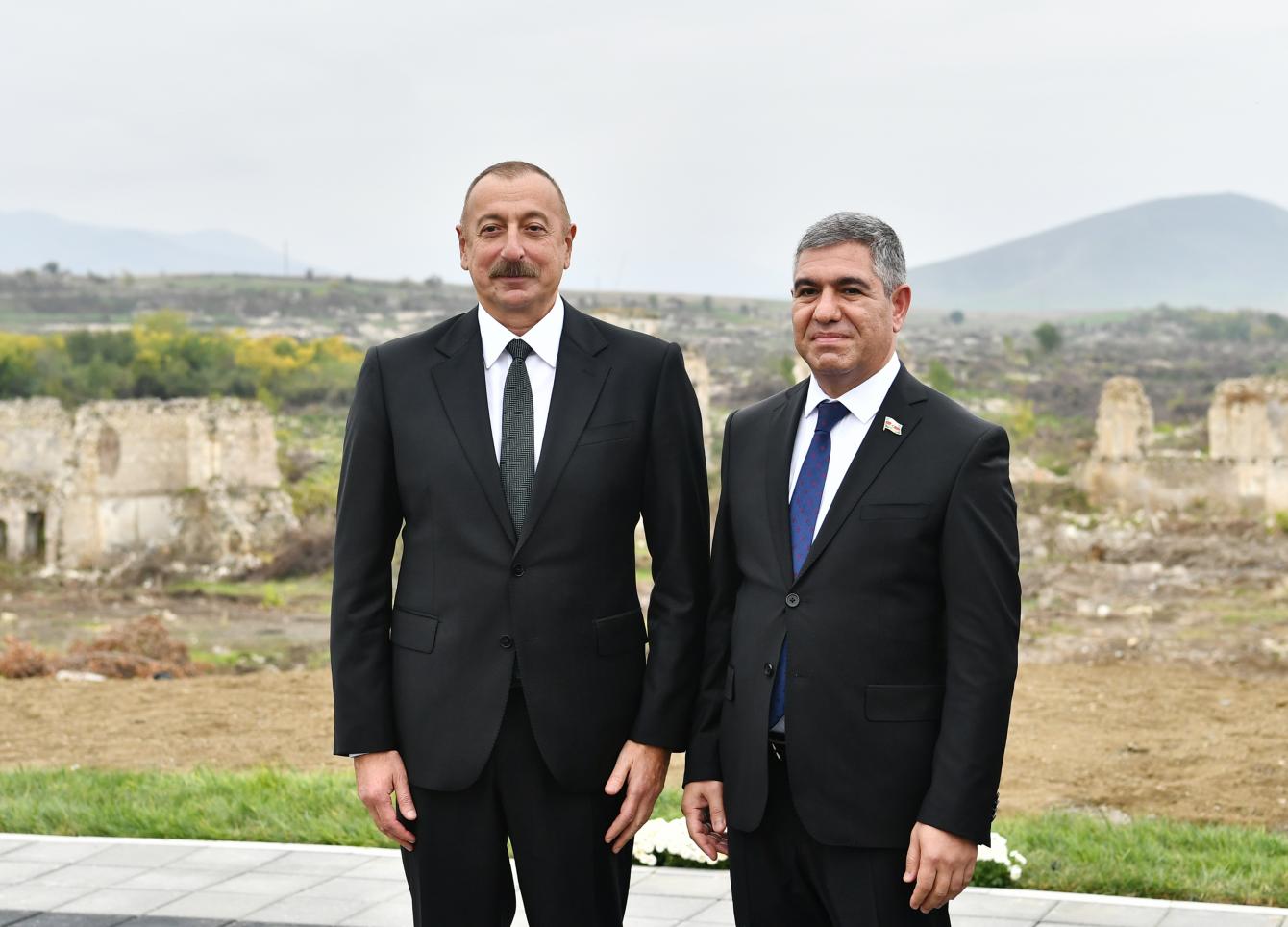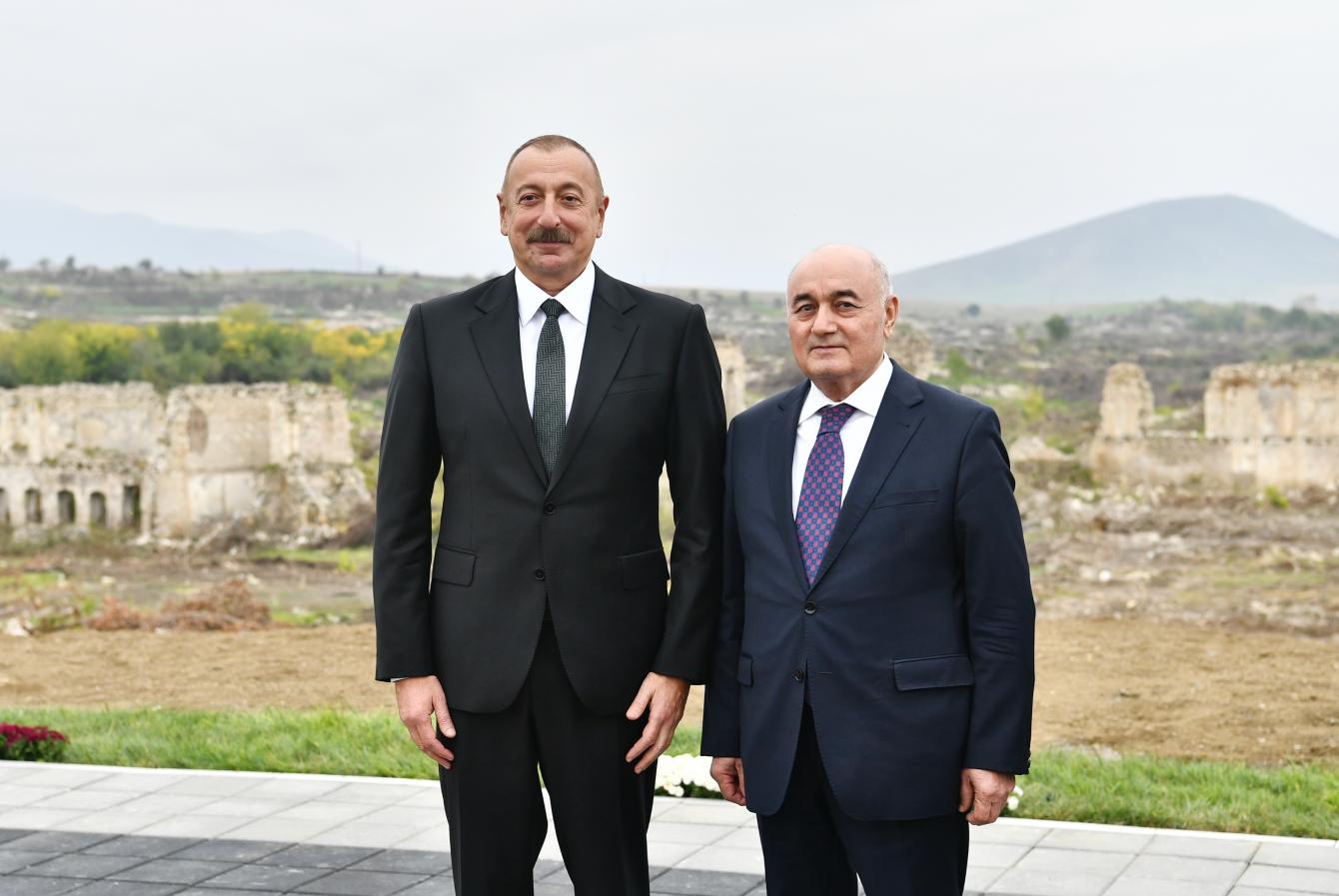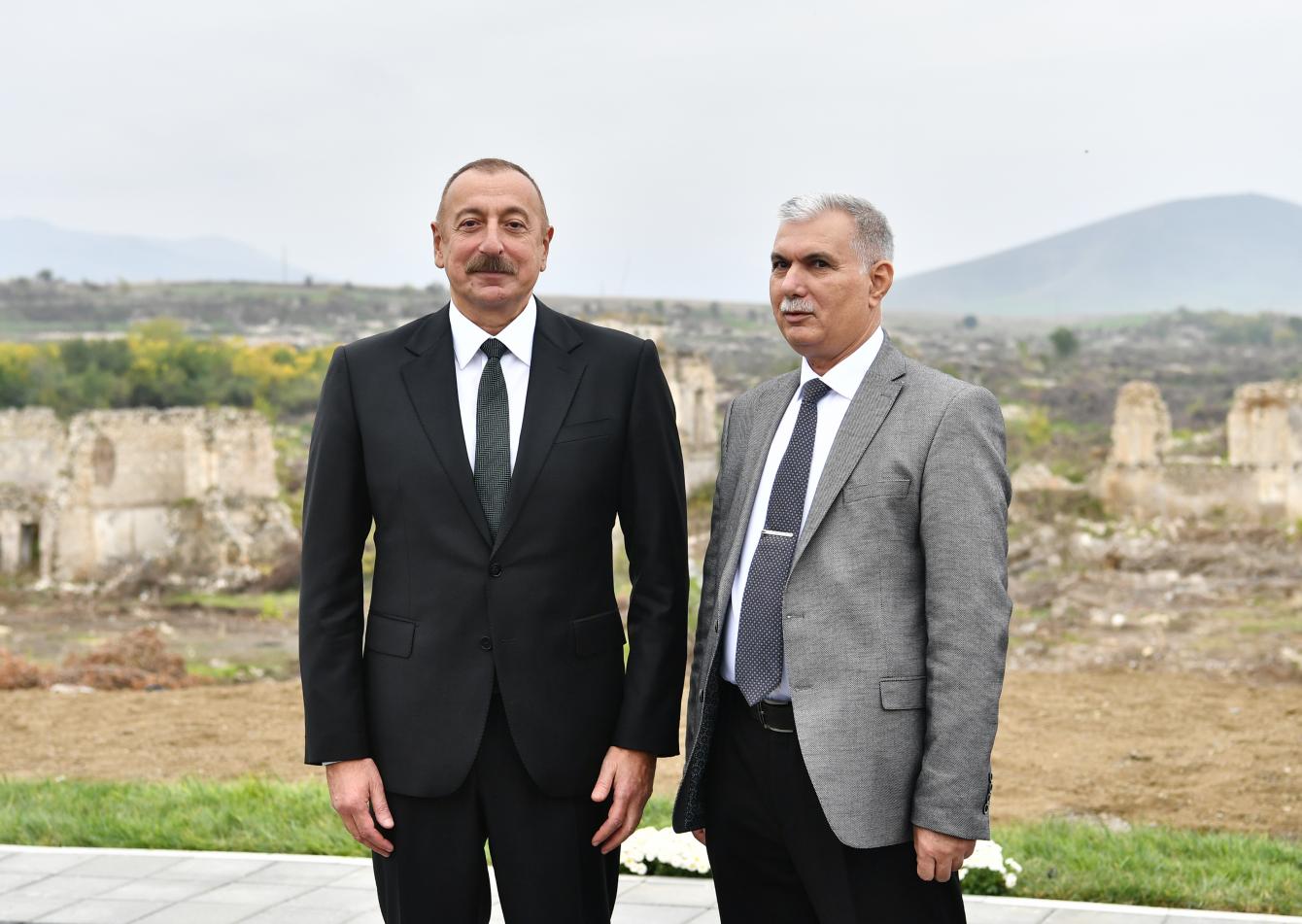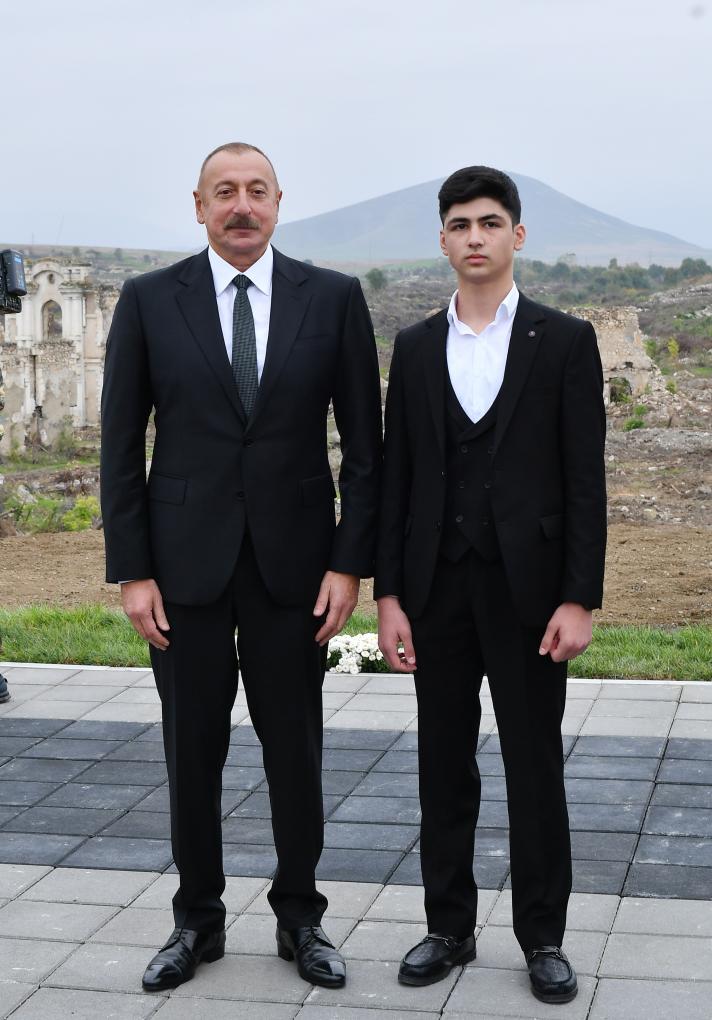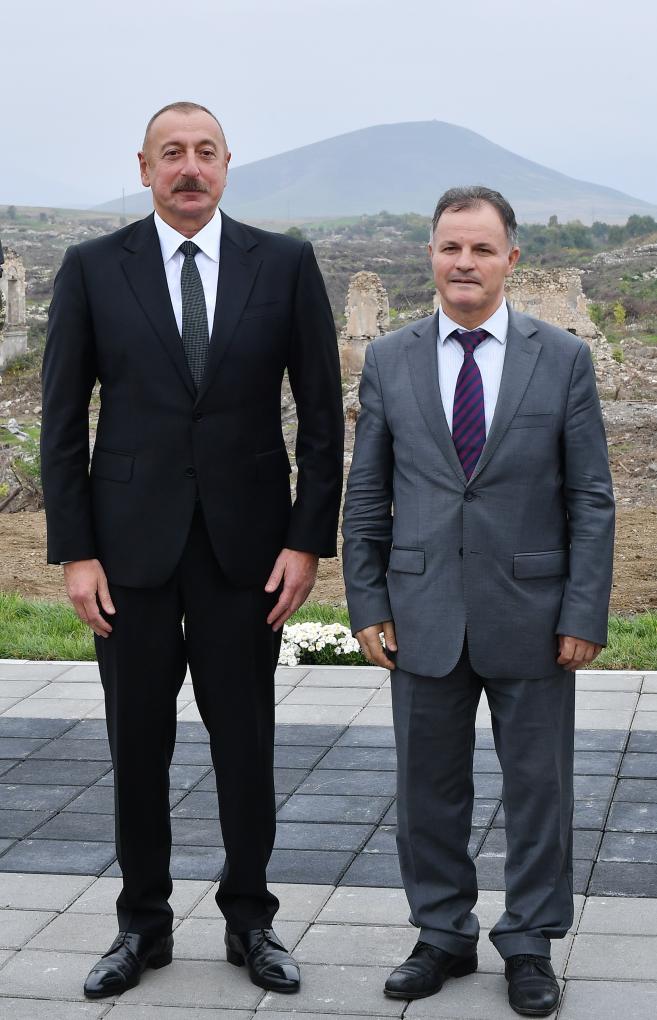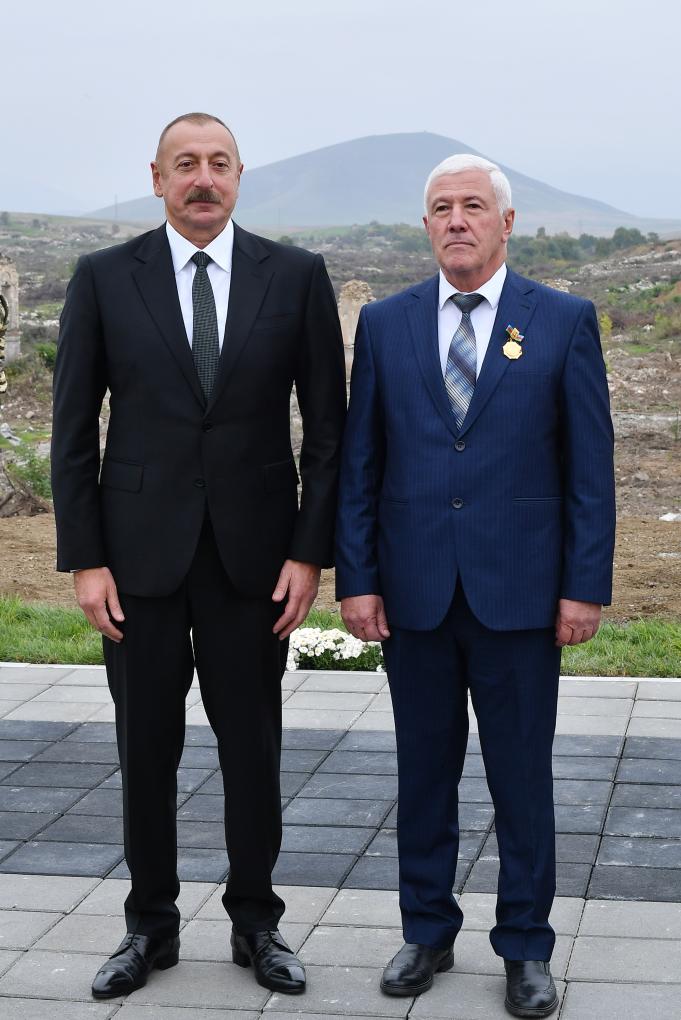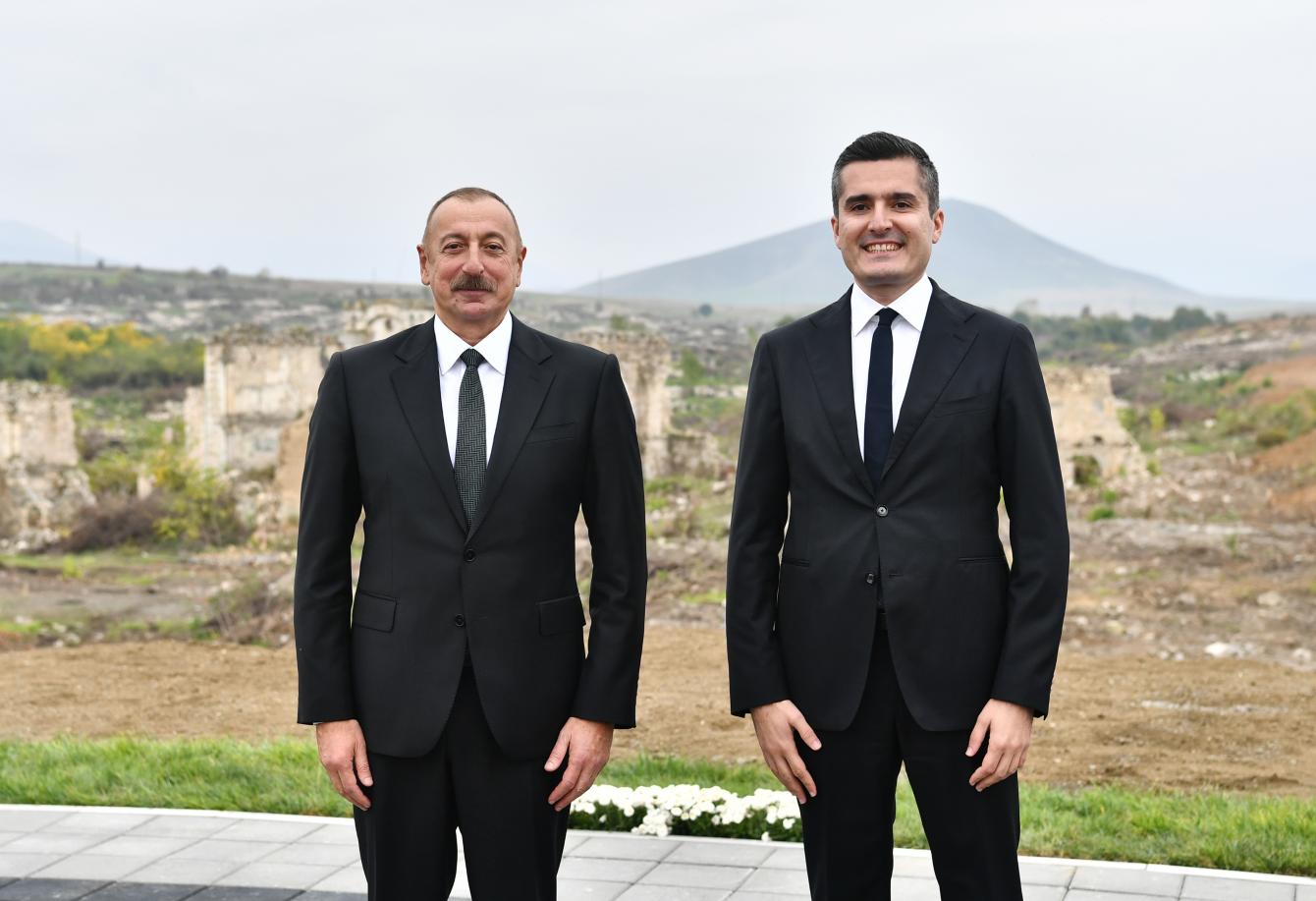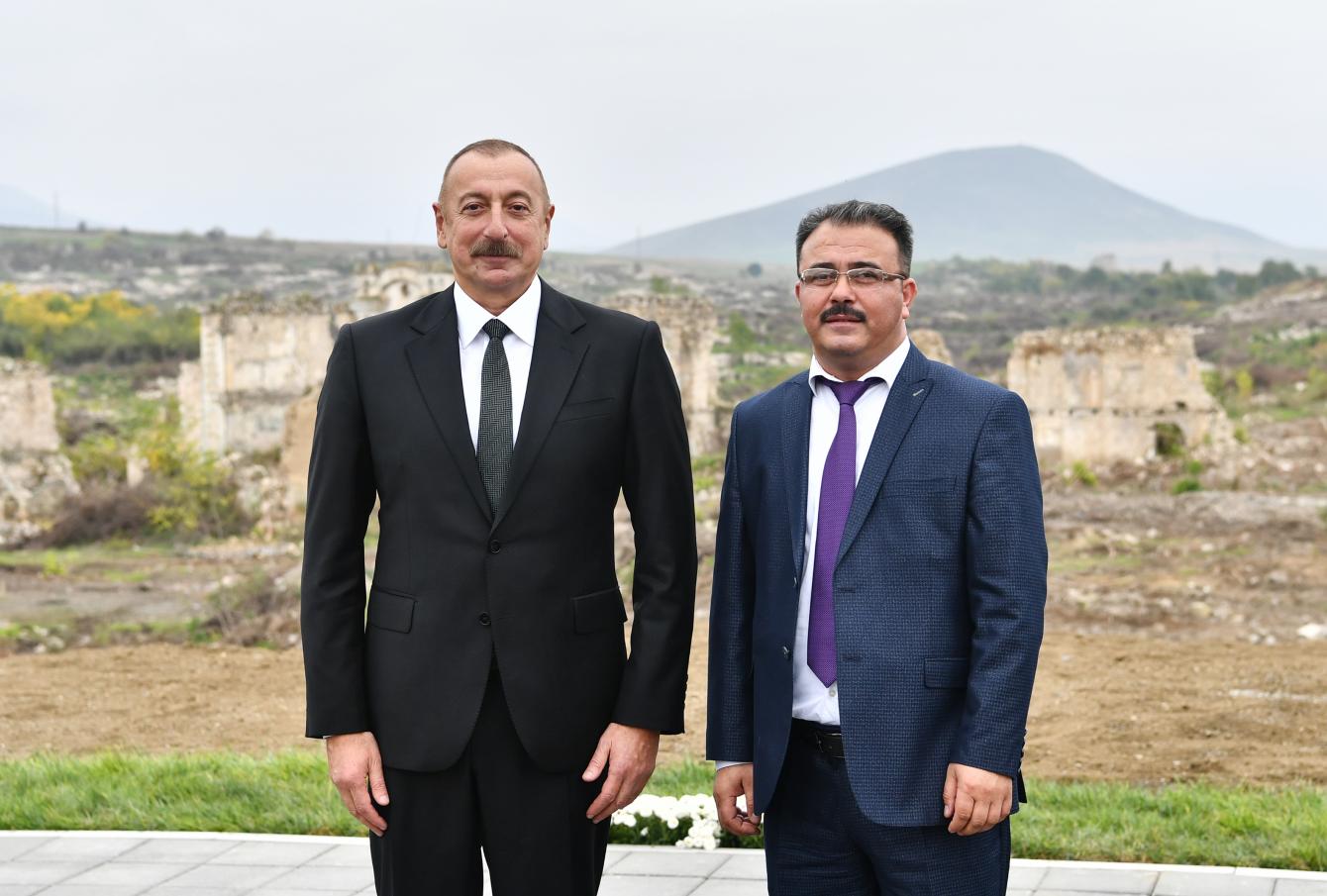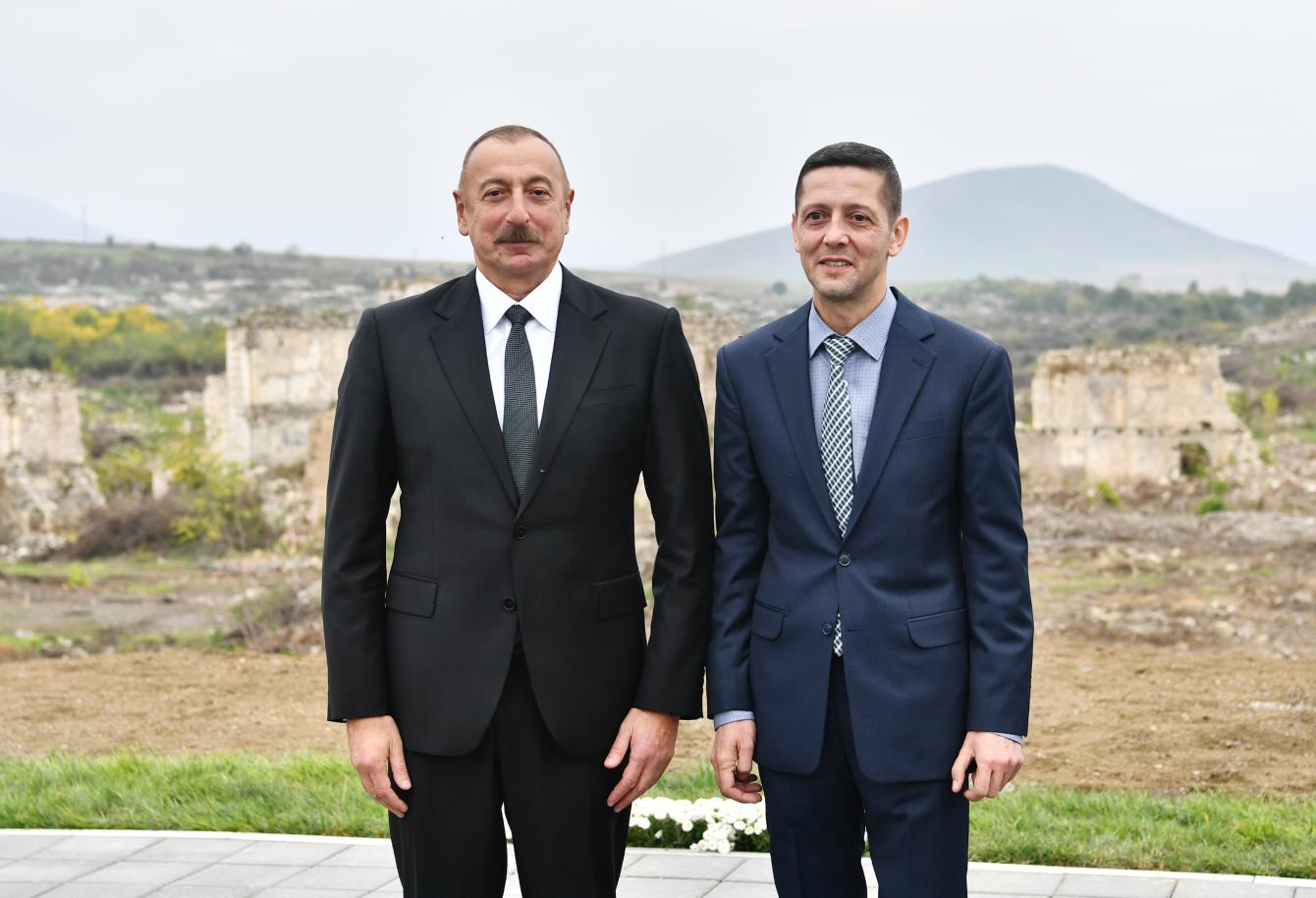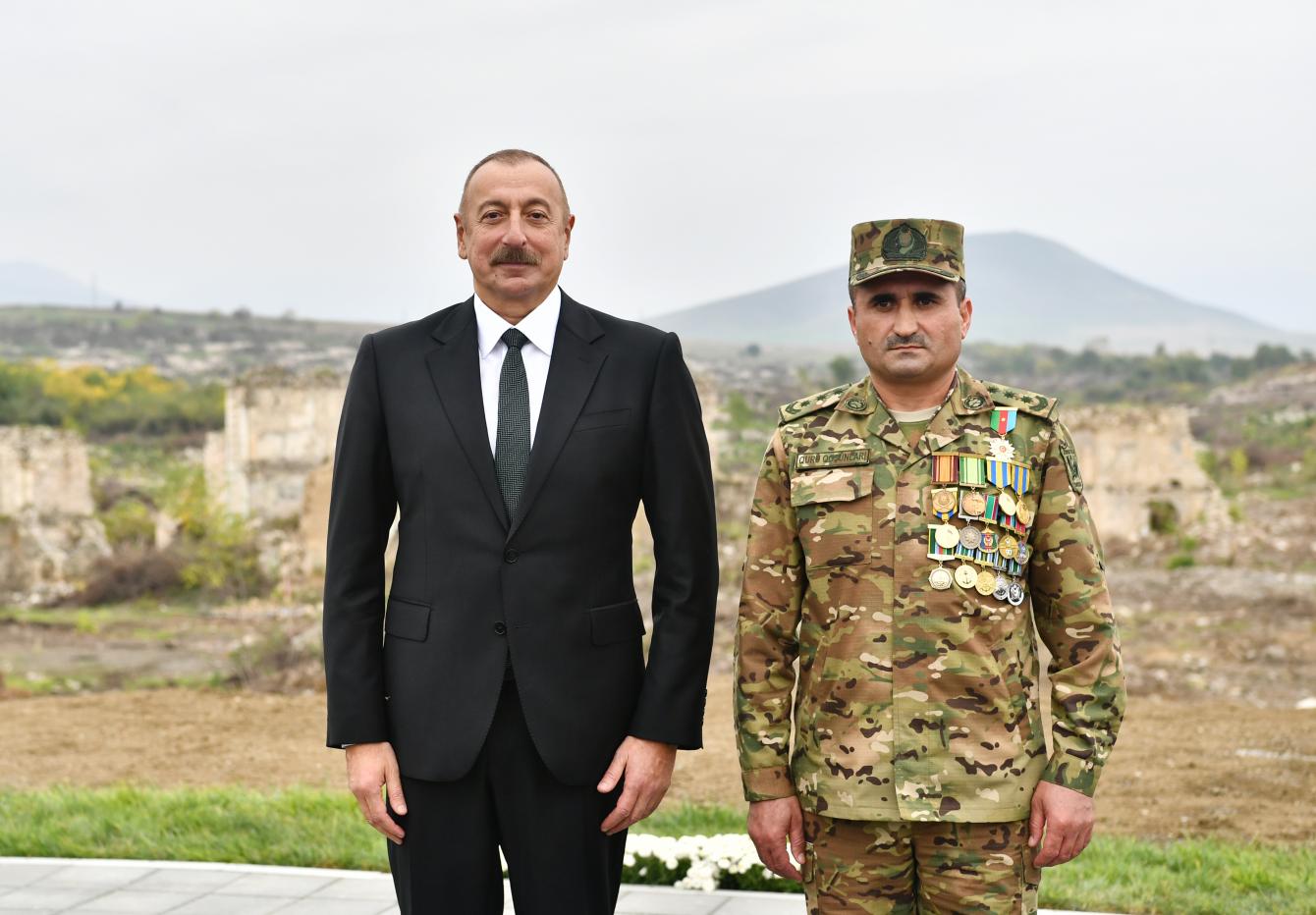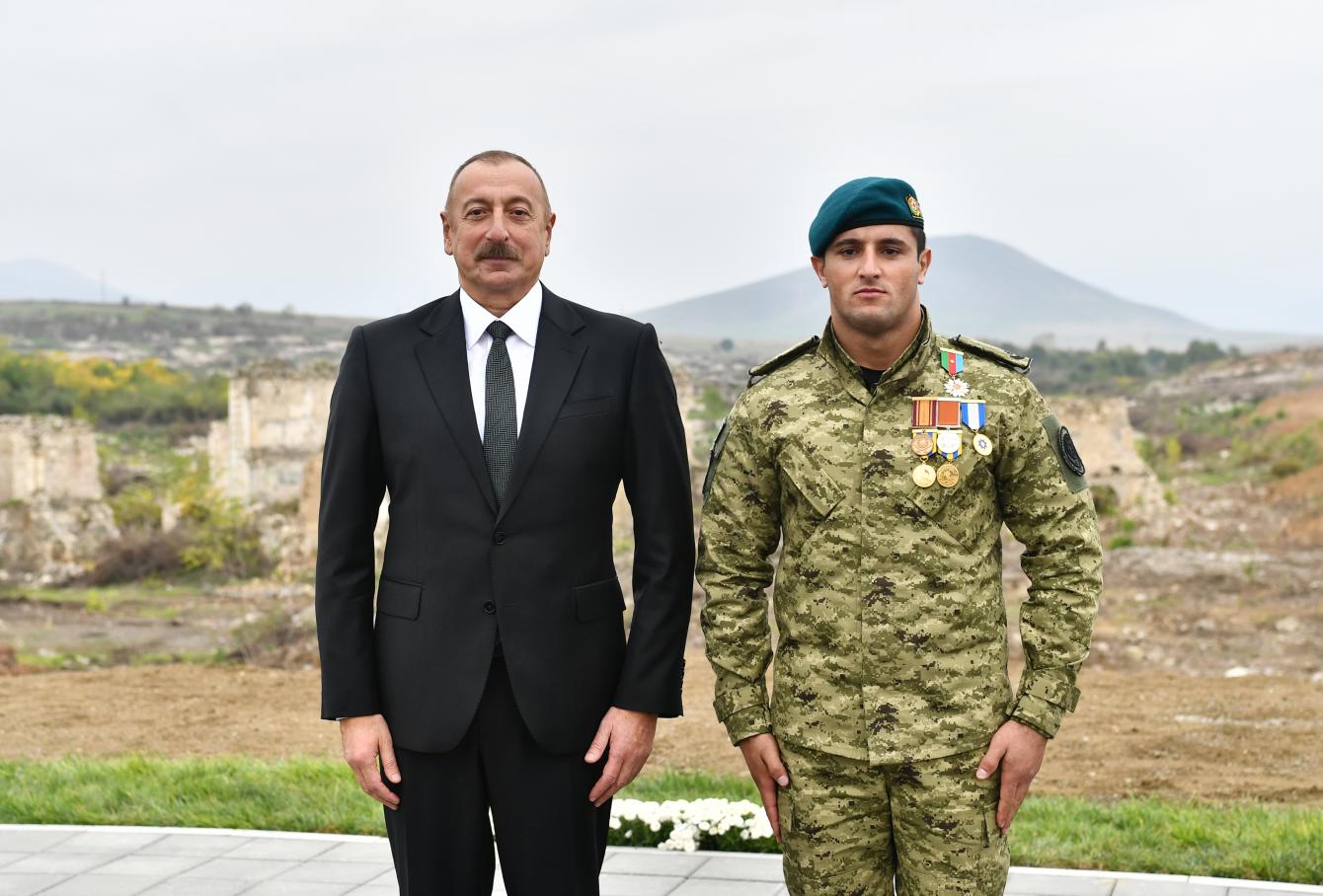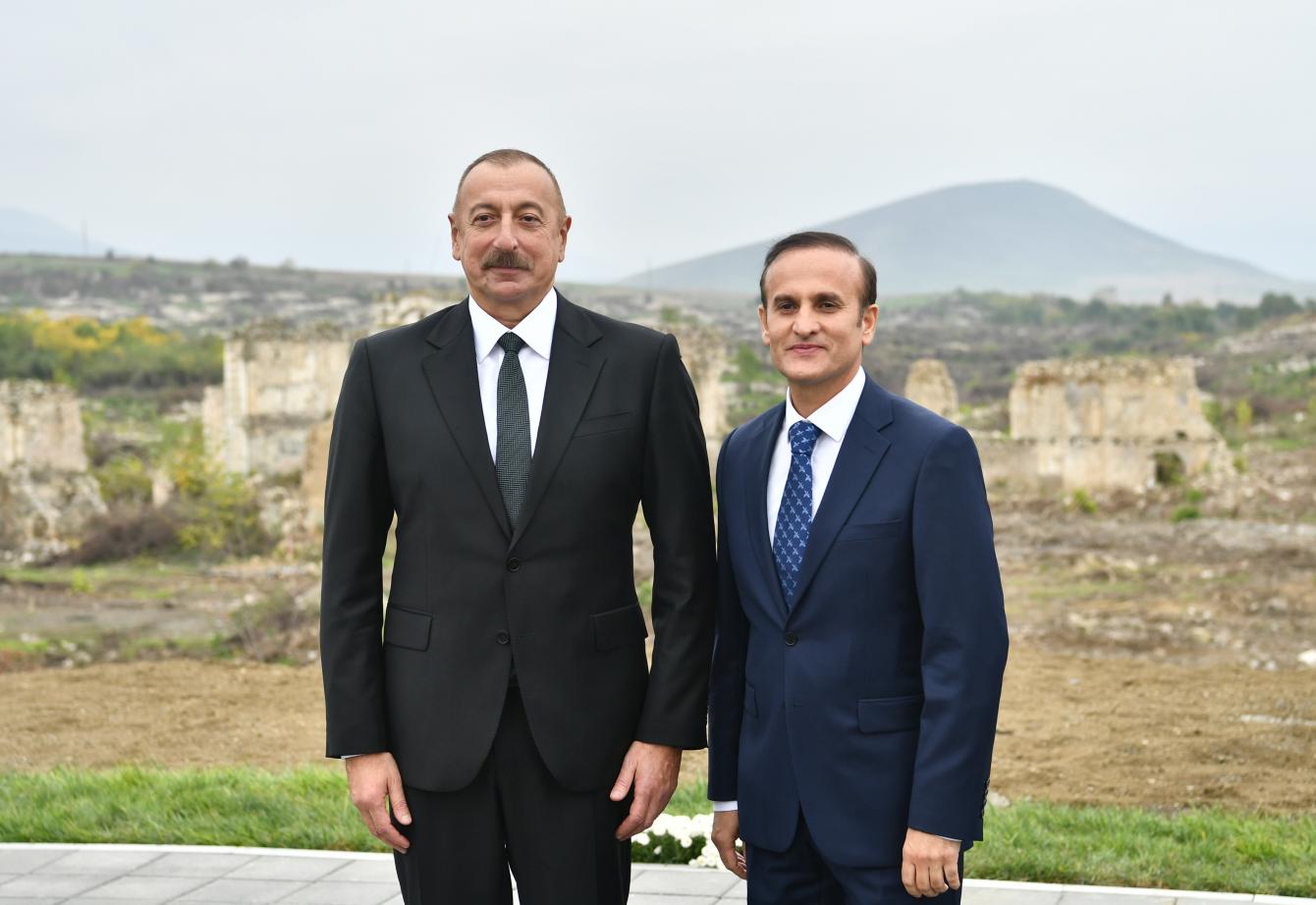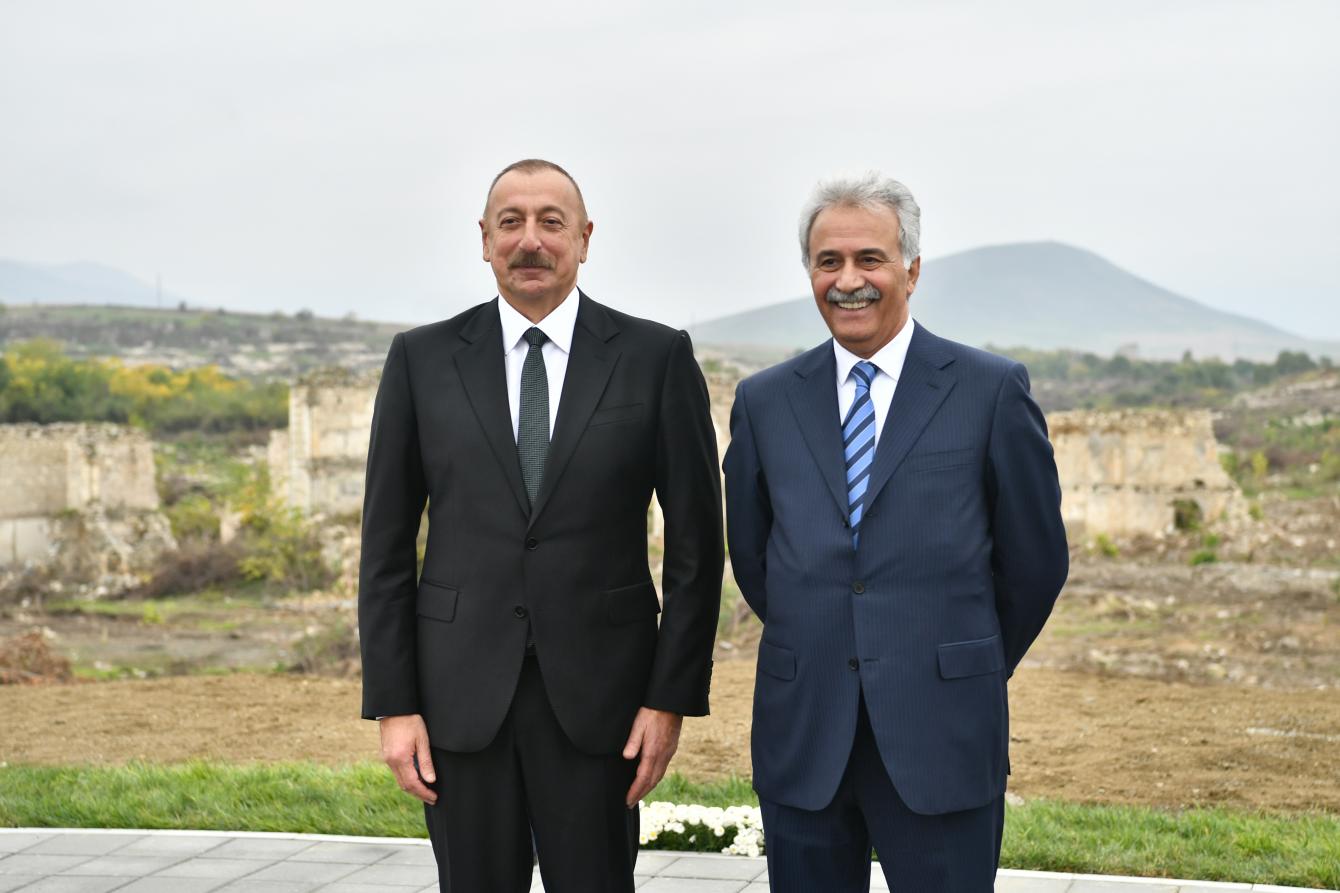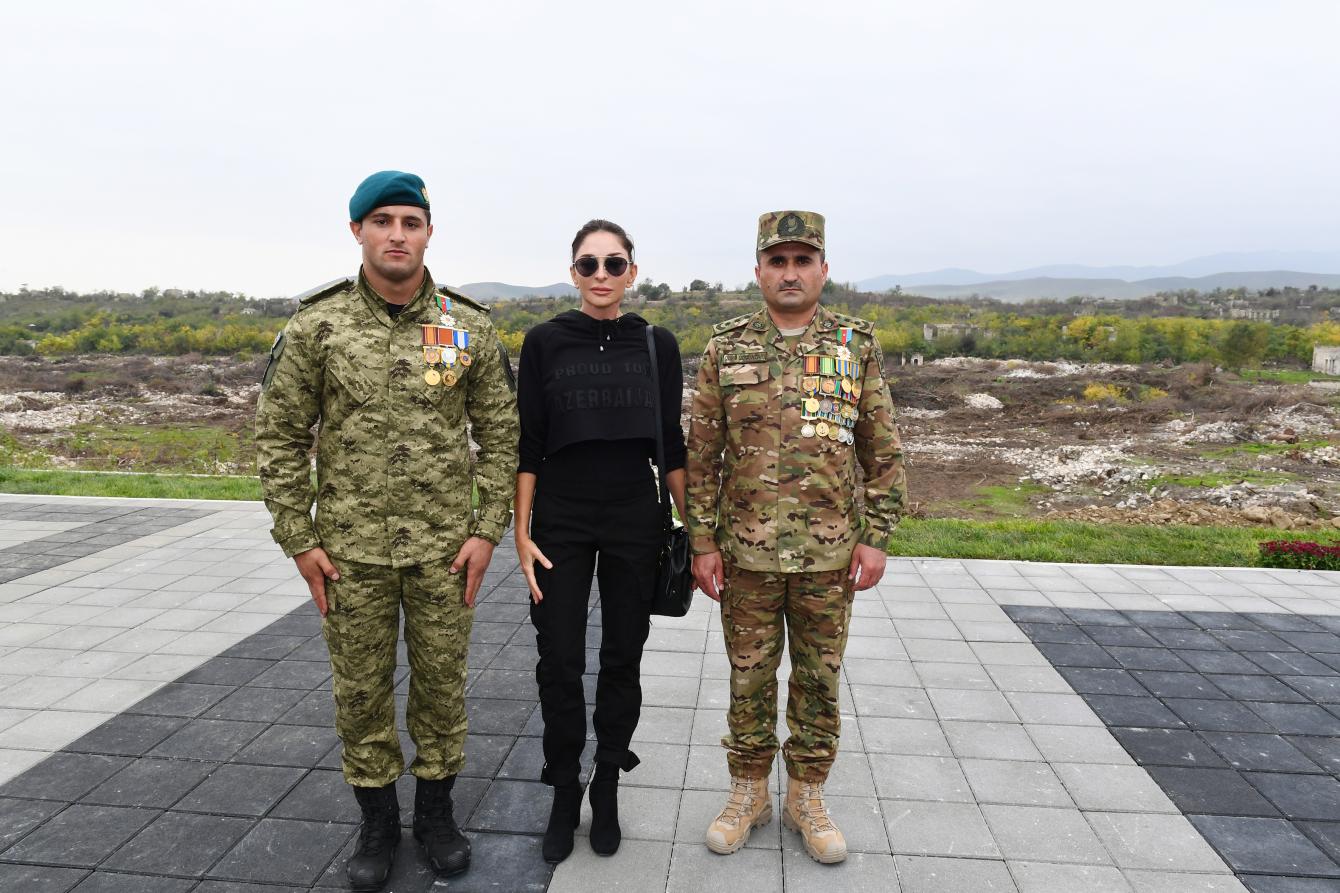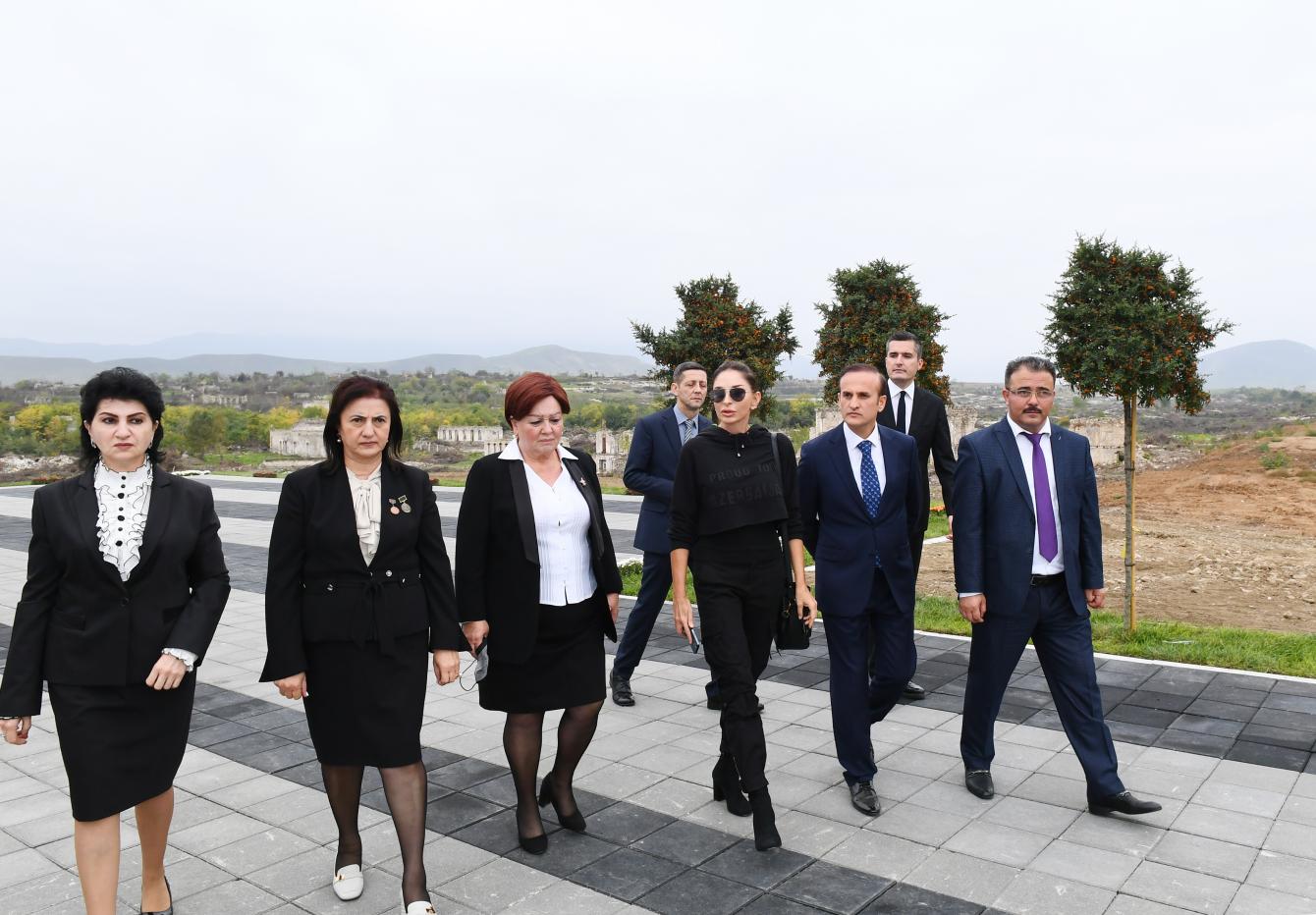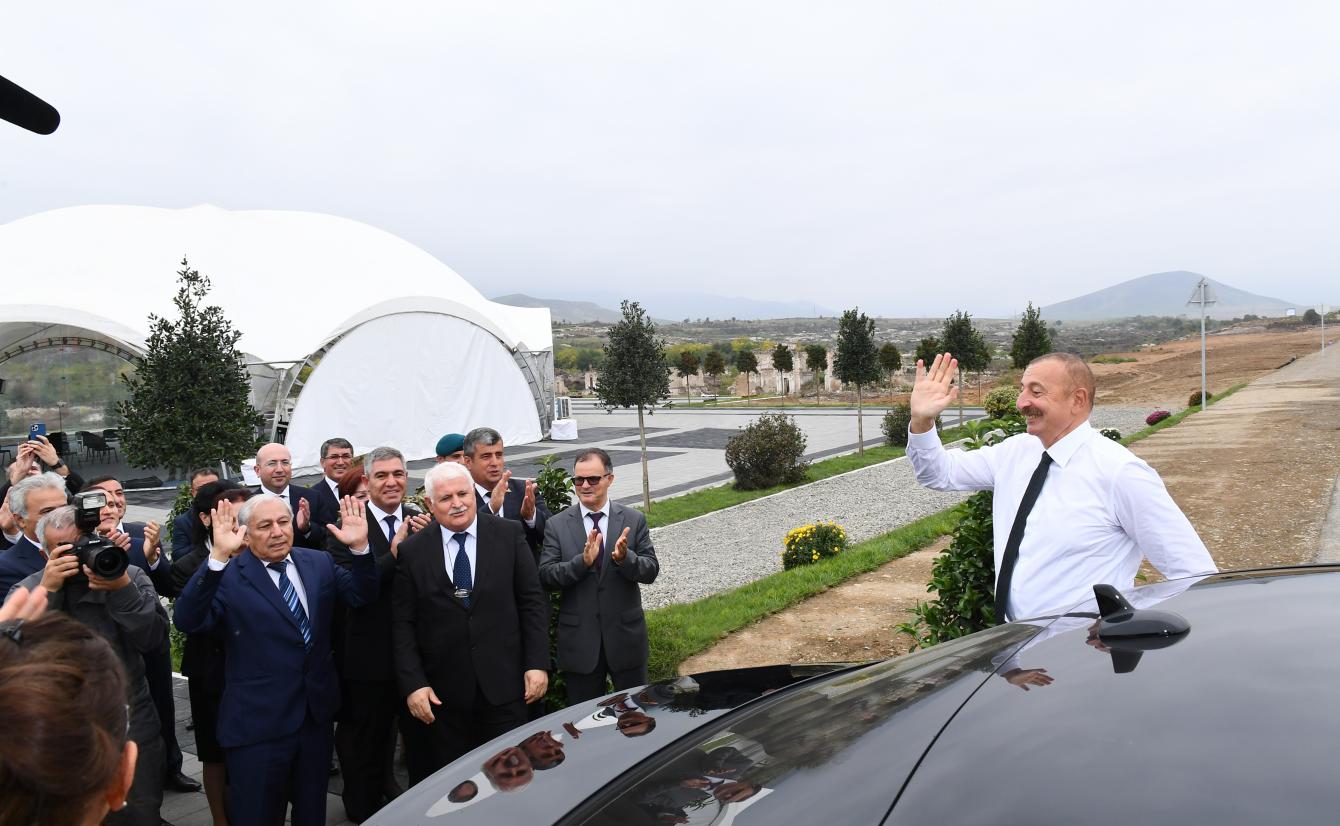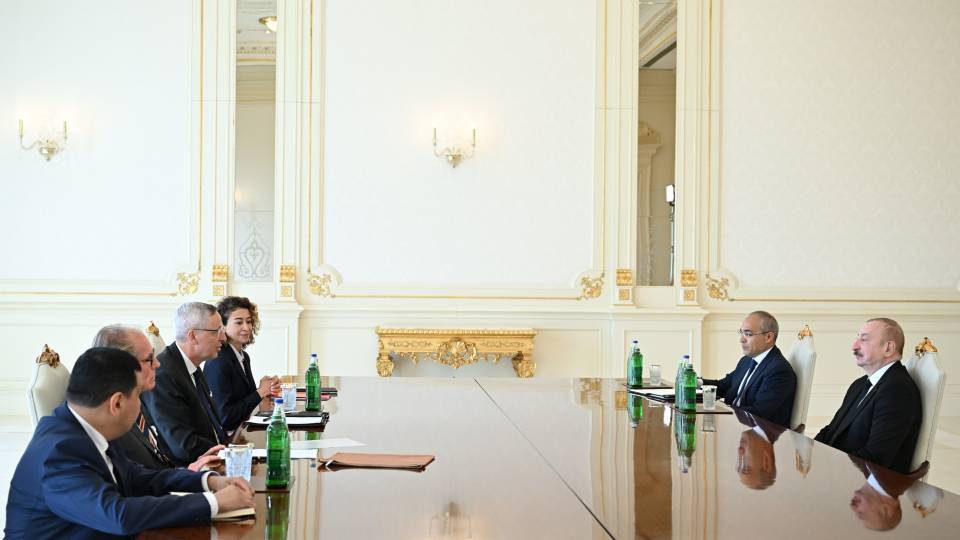Ilham Aliyev and First Lady Mehriban Aliyeva met with members of general public of Fuzuli, laid a foundation stone for Memorial Complex and that of the restoration of city
President of the Republic of Azerbaijan Ilham Aliyev and First Lady Mehriban Aliyeva have met with members of the general public of Fuzuli district, and laid the foundation stone for Memorial Complex and that of the restoration of the city.
The head of state delivered remarks at the meeting.
Remarks by the President Ilham Aliyev
- Dear friends, dear natives of Fuzuli. Greetings and welcome to Fuzuli. Here on liberated lands today, we are celebrating the first anniversary of the liberation of Fuzuli. Exactly a year ago, the glorious Azerbaijani Army liberated the city of Fuzuli and several villages from the occupiers, raised the Azerbaijani flag here, and thus the Azerbaijani state regained the sovereignty of these territories after a long break. This is a historic event. That day, 17 October, will have a special place in the centuries-old history of the Azerbaijani people. On 17 October, our city of Fuzuli was liberated from the occupiers. I once again pray to Allah to rest the souls of all our martyrs in the Second Karabakh War in peace. It is thanks to their selflessness and heroism that we have restored historical justice. The Azerbaijani Armed Forces showed true patriotism and heroism in the 44-day war. The Azerbaijani Army restored historical justice by crushing the enemy's manpower and equipment, and Azerbaijan restored its territorial integrity.
The liberation of Fuzuli during the war was very important, because it was a large settlement. It was the third largest settlement to be liberated from the occupiers after Jabrayil and Hadrut. There were fierce battles for Fuzuli, and very important operations were carried out around the city for several days. The enemy put up stiff resistance, but the Azerbaijani Armed Forces fulfilled its historic mission nonetheless. When I shared the news of the liberation of Fuzuli with the Azerbaijani people, the Azerbaijani people and I think the whole world saw that we would complete our glorious mission to the end and that there was no force capable of stopping us.
The importance of the liberation of Fuzuli also boils down to the strategic location of this city. After Fuzuli came under our control, there were more opportunities for us to go to Shusha. I want to repeat that the Armenian side had built very strong fortifications here. There were several lines of fortifications here. For 30 years, the enemy has been reinforcing its positions here, and being able to break through those fortifications was further evidence of the great heroism and self-sacrifice of our people. Of course, the enemy was frightened. They saw that our soldiers and officers were ready to die for the liberation of their native lands. Our heroic soldiers and officers, who sacrificed their lives because of these fortifications, showed the enemy the greatness of the Azerbaijani people again. It is no coincidence that after the liberation of Fuzuli, cases of desertion in the Armenian army became even more widespread. The enemy realized it could not stand in front of us. The enemy saw that the road ahead of us was already clear and the liberation of other cities and districts was imminent.
The liberation of Fuzuli gave us additional moral strength. After that, the Azerbaijani Armed Forces successfully continued their salvation mission with even greater resolve. The city of Zangilan was liberated three days after the liberation of Fuzuli, Gubadli five days later and then we accessed the corridor of Lachin. So the outcome of the war was no longer a secret to anyone.
We had to liberate our lands. During the occupation, I repeatedly addressed the people of Azerbaijan and held meetings with former IDPs regarding this issue, saying that we had to liberate our lands at any cost. I also said that if necessary, we would return our lands by force. And this is what happened. Despite all the pressure and statements both during the occupation and during the war, no force was able to stand in front of us. We destroyed the Armenian army, put an end to Armenian myths, proved to the whole world what the “invincible Armenian army” was capable of and demonstrated the greatness of our people to the whole world. This glorious victory will live forever in the centuries-old history of Azerbaijan.
I must also say that our successful operations began with Fuzuli district. On the first day of the war, on 27 September, four villages of Fuzuli were liberated – Garakhanbayli, Garvand, Horadiz, Yukhari Abdurrahmanli villages of Fuzuli district, and Boyuk Marjanli and Nuzgar villages of Jabrayil. So we started our victorious mission with Fuzuli district.
Anyone visiting Fuzuli these days can see the manifestations of Armenian savagery. Fuzuli is the worst destroyed district. There is not a single safe village here, not a single safe building. The city of Fuzuli has been completely razed to the ground. You probably remember this quite well. The Azerbaijani people remember that we could not find a single building to hoist our flag after the liberation of Fuzuli. Our flag was finally hoisted on a pole outside a military unit. Everyone who comes here can see Armenian savagery, Armenian vandalism, and no one can deny it. It is no coincidence that during the occupation, the Armenians did not allow anyone to come here, not even representatives of international organizations. True, representatives of the Minsk Group visited these regions with fact-finding missions twice during the occupation and prepared relevant reports. Those reports showed that the enemy had committed great vandalism here. But no one could have imagined such devastation. It is the ugly face of Armenian fascism, and the whole world can and should see it. Thousands of people, including residents of Fuzuli, as well as foreign diplomats, politicians and journalists, have come to the liberated lands to witness Armenian atrocities.
We will restore the city of Fuzuli and the villages of Fuzuli district. A lot has been done in this direction over the past year. Life will return to all the liberated lands, our citizens will return to their homes. During this year, we have been engaged in large-scale construction work, as well as the restoration of our cities and villages. This process is very challenging. Proper planning must be done here. Mine clearance must be carried. Fuzuli is the worst district in terms of the number of mines among the liberated districts – more than a hundred thousand mines were planted here. We must do all this in parallel. At the same time, the master plan of Fuzuli city and the concept of rural development have been prepared. The first infrastructure projects were launched in Fuzuli.
During the occupation, I visited the part of Fuzuli district that was under our control many times, I visited Fuzuli district 12 times. A lot has been done for the development of the district. Horadiz settlement was given the status of a city and became the unofficial center of Fuzuli District. Major social infrastructure projects were implemented here – 24 schools, two hospitals, an Olympic Sports Center, a youth center, the Museum of History and Ethnography, the Mugam Center were built here. A lot has been done in terms of infrastructure. Restoration of individual houses has been carried out. In other words, large-scale work on the development of Fuzuli District has been carried out. As I mentioned earlier, I have been to Fuzuli 12 times. I always met with the IDPs here and told them that after the liberation of Fuzuli city and the rest of the district, we would build even better houses, create even better conditions for their return. Today, everyone can see that. The projects already implemented in Fuzuli show both our intentions and potential. Fuzuli International Airport was built in just eight months. While inspecting the airport today, I saw again that perhaps no other international airport has been built in a mined area in such a short span of time elsewhere in the world. We have laid power lines from Fuzuli to Shusha. After the liberation of Shusha, the contemptible enemy cut off all power lines. It even blew up the water line, and Shusha was left without electricity in the winter months. Therefore, power lines were laid from Fuzuli to Shusha in difficult conditions. A substation was opened in Fuzuli and the foundation stone of a second substation was laid today.
Regarding the roads now - you have used the new road to come here. As you can see, we have built these roads in a short time. We have even built Victory Road to Shusha, and the construction of the Fuzuli-Shusha highway is under way now. Work is under way on the Fuzuli-Hadrut, Fuzuli-Jabrayil and Fuzuli-Aghdam roads. The foundation of a new road in the Fuzuli-Aghdam direction was laid today. At the same time, visitors and citizens visiting Aghdam can use Fuzuli International Airport. So Fuzuli International Airport is the air gateway to Karabakh.
By doing all this work, we pursued the goal of returning the former IDPs to their native lands as soon as possible. By attending the groundbreaking ceremonies today, we are bringing this day much closer. Today, the development concept of Dovletyarli village was approved and the foundation of it was laid. A large settlement will be created in Dovletyarli village on the basis of a “smart village” concept. I hope that the project covering five villages will be completed and provided to former IDPs by the end of next year. At the first stage, there are plans to build 450 houses. After that, there are plans to build an additional 300 houses, and this will be the first residential center in Fuzuli.
The master plan of Fuzuli will be unveiled today. I have already been familiarized with the master plan. We will look at this plan together today. Our specialists have been working on this plan for many months. Today we will all get acquainted with this project. The foundation stone will be laid for the Victory Museum and the Museum of Occupation.
Life is returning to Fuzuli, and it will return. I am sure that both the city of Fuzuli and the villages of the district will flourish in the shortest possible time. We are applying the latest technologies in the liberated areas. This is already a reality. I stated this immediately after the end of the war, and everyone can see it today. The construction of the first village in Zangilan is nearing completion. The master plan of Aghdam city was approved and work on it began. The master plan of Jabrayil has been approved. Instructions have already been given and funds have been allocated. Master plans for our other cities – Zangilan, Gubadli, Kalbajar and Lachin – are being prepared. We will do all this work. As you know, we will do it at our own expense, without applying to anyone for help and without taking any loans.
Of course, we worked for many years to be able to do all this. For many years, we had been strengthening our army for the liberation of our lands. And in the post-war period too, we have created conditions and opportunities for the construction and restoration work – technical capabilities, intellectual potential, human resources and financial resources. Today, the Azerbaijani economy is reviving after the pandemic crisis. I have already been informed that the figures for the first nine months are positive, that the economy has grown by about 5 percent, industry has grown, and the non-oil industry has grown by about 20 percent. But everyone should know that all this restoration work requires a lot of money. I repeat that Azerbaijan has not received and will not receive any assistance from anyone, not a penny. If we have not received anything yet, we will not receive it in the future either. We will do this work using our own resources. I am sure that all our plans will be implemented as soon as possible, and Karabakh and East Zangazur will become one of the most beautiful places not only in Azerbaijan, but in the world.
Tomorrow, 18 October, is a historic day. Thirty years ago, Azerbaijan declared its state independence. As you know, on my initiative, the Milli Majlis of Azerbaijan has made amendments to the list of our national holidays. I think that these amendments are fully consistent with the historical truth and historical justice. The main holiday of independence for us is 28 May – the day of the establishment of the Azerbaijan Democratic Republic. We are rightfully proud that the first democratic republic in the Muslim world was established by the Azerbaijani people. Today, as an independent country, we are the successors of the Azerbaijan Democratic Republic. Azerbaijan is the successor of the Azerbaijan Democratic Republic. On 18 October 1991, independence was restored. The amendments put an end to this discrepancy, and everyone should know that.
I must also say that I think that the then Azerbaijani leadership wasted a lot of time in declaring independence at that time. Independence could have been declared earlier, sooner. Everyone should know this too. We must approach history fairly. Unlike the Armenians, we must not create any myths. We must know and appreciate history as it is. In October 1991, many formerly Soviet republics had already declared their state independence. I have a list, and I want to give this information to both you and the people of Azerbaijan. Many may not know this.
Lithuania was the first former Soviet republic to declare independence on 11 March 1991. Then comes Georgia, 9 April 1991, Latvia on 4 May, Belarus on 27 July, Estonia on 20 August, Ukraine on 24 August, Moldova on 27 August, Kyrgyzstan on 31 August, Uzbekistan on 1 September, Tajikistan on 9 September, Armenia on 21 September, Turkmenistan on 27 September, Azerbaijan on 18 October. What was the reason for waiting so long? You know, I know the answer to this question. It is a rhetorical question. Therefore, it is completely inappropriate to celebrate 18 October with great pomp or to thank someone for it. The Soviet Union was falling apart; the Russian Federation adopted the Constitutional Act on State Sovereignty before us. Russia dropped out, Ukraine dropped out, all other republics dropped out. What were the Azerbaijani leadership waiting for? Who were they waiting for?
You know, this is why it is difficult to have a proper understanding without knowing the history. This is important for the right steps to be taken in the future, and the younger generation should know this. This is the historical truth. At the same time, we have another historical fact that occurred in that year, on 17 November. On 17 November 1990, on the initiative of Heydar Aliyev, the name of the then Nakhchivan Autonomous Soviet Socialist Republic was changed, the words “Soviet Socialist” were removed from it and republic was named the Nakhchivan Autonomous Republic. On 17 November 1990, on the initiative of Heydar Aliyev, the tricolor flag of the Azerbaijan Democratic Republic was adopted as the official flag in Nakhchivan. This historic footage is available. At the same time, a petition was submitted to the Supreme Council of Azerbaijan to take a similar step. But it did not. On the contrary, a referendum on preserving the Soviet Union was held in the Soviet Union in the spring of 1991 and the then leadership of Azerbaijan falsified the results of that referendum against the will of the people and voted for the preservation of the Soviet Union.
However, Heydar Aliyev did not allow this referendum to be held in Nakhchivan. Now look at the steps towards independence. What stages did the journey to independence go through? Therefore, my message of congratulation to the people of Azerbaijan on 18 October will be published tomorrow. At the same time, I would like everyone to know this history and recognize the main driving forces of independence. The path to our independence began on 17 November 1990, when the tricolor flag, our national flag today, was approved as the state flag.
Touching upon this history today, I just wanted to share my position and my thoughts with you and the people of Azerbaijan. It will be another historic day tomorrow – the liberation of Khudaferin settlement. On 18 October, the Azerbaijani Armed Forces reached the Khudaferin Bridge and hoisted the Azerbaijani flag over it. The Khudaferin Bridge is a national treasure of the Azerbaijani people, proof of the talent of the Azerbaijani people. We are justifiably proud of this magnificent architectural work belonging to the people of Azerbaijan.
The war has been consigned to history now. The Nagorno-Karabakh conflict has been consigned to history and we must look to the future. We are creating this future today. We are creating it with our own hands. I am confident that all our plans, as well as all the goals stated so far, will be met. We will achieve these goals, strengthen our country, strengthen our army and ensure the safe life of the Azerbaijani people. Of course, we will return the IDPs who have suffered for 30 years, including moral suffering, to their native lands as soon as possible. I congratulate you again and wish you continued success and good health. Thank you!
X X X
President Ilham Aliyev said: Thank you very much, dear friends, thank you for your kind words. I would just like to add that this is a victory for all of us. The people of Azerbaijan tirelessly walked towards this victory. Each of us was working from their end and contributed to our common Victory and our common development bringing this day, this sacred day closer.
It is no coincidence that the second Karabakh war is called a Patriotic War. Each of us, every citizen of Azerbaijan not only looked forward to this day, believed in it, but also brought it closer with their hard work. There has never been a more important issue for us, for our people, than the liberation of our lands. I think this is one of the main factors of our victory. Because we had not forgotten Karabakh, we had not come to terms with that situation. However, we were told that we had to reckon with reality, with the fact that we were defeated in the first war in the 1990s. We were told to come to terms with this situation and reach some compromise with the Armenians. My position was clear. I have stated this position in all domestic and international events, saying that we would never come to terms with that situation. It was the determination of our people that gave me strength. Our people did not come to terms with that situation. Just listen to what this young girl who has not seen these lands says. Our young people who did not see these lands were dying for these places. It shows the greatness of our people again. There have been many wars and conflicts in history, and there have been times when nations have come to terms with the occupation, bowed their heads. But our people have always stood tall. We have always lived with the desire and idea that the day will come when we will restore justice, when we will get rid of the “defeated” label over our people, when we will live as a proud people, as a victorious people, and this day has come. If our people did not believe in it, if our society did not support our policy in that area, it would be very difficult to end the war with such an outcome. Therefore, this is a victory for all of us, a celebration for all of us.
Of course, there are many factors. This has already been talked about. It will be written about in books, articles and researches, taking into account the factors that contributed to our victory. But I think that the most important of them is our unyielding spirit and patriotism. It was in this region that our young men, young soldiers and officers were dying. Armenians were based in all those positions, in those positions in the mountains. They were there for 30 years; they had built fortifications, bunkers, long-range firing points. We were crossing the line of contact from the plain, breaking through those fortifications, and our young people were dying. Therefore, the first factor has been patriotism and love of the Motherland. This factor will continue to make our people invincible.
Our primary task – of course, the restoration and development of our lands are always there – is to raise young people in the spirit of patriotism. If we fail doing so, then our dreams will be incomplete. If there is patriotism and if there is attachment to the Motherland, no force can stand in front of us.
Before, during and after the war, some people tried to threaten us, and they are still doing that. But all these efforts were in vain. No one can bend our resolve. We will not give up our dignity, our pride and our independence to anyone. Everyone should know this. Everyone knows where those who were trying to threaten us are now. It must be a lesson for everyone, a lesson for all. No one can speak to Azerbaijan in the language of force, in the language of threats.
I once again congratulate you on this sacred day – the day of the liberation of Fuzuli – and wish you good health. I am sure that we will soon rebuild and restore this beautiful land. We will meet many more times here. Thank you again!
X X X
President Ilham Aliyev: Are things going well?
Resident: Yes, work is going on. There are probably more than a thousand vehicles involved.
President Ilham Aliyev: Things are going well there now.
Resident: At a very high level, Mr. President.
President Ilham Aliyev: I will meet with National Heroes.
Colonel Huseynov: Mr. Commander-in-Chief, I am Colonel Huseynov.
Major Safarov: Mr. Commander-in-Chief, I am Major Safarov.
President Ilham Aliyev: Let's get acquainted with the master plan and then lay the foundation of the Victory Museum.
Chairman of the Committee for Urban Planning and Architecture Anar Guliyev: Dear Mr. President, dear Mehriban khanim. The Fuzuli Memorial Complex will be established in the central part of the city. The Occupation Museum, the Memorial Complex and the adjacent Victory Park will be built on an area of 5 hectares. Also, a Flag Square will be established on an elevated location. We would like to show a short video presentation with your permission.
The video is shown.
Anar Guliyev: Mr. President, as the video demonstrated, we believe that the Flag Square will be built at the highest point of the city and will represent a new symbol of Fuzuli. It will be visible from all sides, especially in the evening with illumination. The museum will consist of six main halls. Each hall will be dedicated to one topic, the strategic importance of Fuzuli and Karabakh. Fortifications built by the Armenian occupiers will be displayed on the ground floor of the museum. In addition, there will be a hall dedicated to the strategy of our military during the liberation of Fuzuli. Also, a separate exhibition will be organized dedicated to the appearance of Fuzuli after its liberation, the current situation and, of course, our martyrs. The museum will be located in a large park. A Victory Monument will also be erected in the park. With your permission, I would like to introduce to you the author of the monument, Rashad Mehdiyev.
President Ilham Aliyev: Yes, of course.
Rashad Mehdiyev: Dear Mr. President, dear Mrs. Mehriban Aliyeva, thank you for your assessment of my work. This monument consists of three parts – a podium, a plaque and columns. The plaque will reflect the names of the heroes who died heroically in the fierce battles for Fuzuli. There will be 44 columns as a continuation of the monument, representing the number of days the war lasted.
President Ilham Aliyev: Will it be visible from the sky?
Rashad Mehdiyev: It will be visible from above and from all sides. There will be an installation in which these 44 symbols will look as if they were in the air.
President Ilham Aliyev: Thank you very much. It is a very impressive piece of work. Will these ruins also be left in the open air?
Anar Guliyev: Yes, in the next part, alongside the Victory Park, an Occupation Museum and a park will be established on an area of 5 hectares. The ruins are in the area now and will be preserved as they are.
President Ilham Aliyev: We are keeping such places in every liberated city, so that the public, young people and foreign visitors can see the ruins.
Residents: The Karabakh region is famous for its monuments and for the water canals. It is a whole culture. In general, the culture of water canals has a very large network in Karabakh. In our village there was a water canal built by Shah Abbas.
President Ilham Aliyev: What village is that?
Residents: Garghabazar.
President Ilham Aliyev: Yes, Garghabazar is a famous village. We were very happy when it was liberated because it is a big village.
Resident: I cried so much when it was liberated. The oldest school is there.
President Ilham Aliyev: Are water canals envisaged in the master plan?
Anar Guliyev: There are springs here as well, Mr. President. Some of them have already been opened and examined.
President Ilham Aliyev: Of course, do take this into account.
Anar Guliyev: We will definitely look at the water canals one by one.
President Ilham Aliyev: In general, during the construction work, you should be in close contact with the Fuzuli public both here and in Baku. Let them be a part of these discussions.
Female resident: Mr. President, it is a pleasure to see you. I am greeting you in your own land. We are all together. I subscribe to all these words. Over the years, you have educated all our children, all children of the former IDPs. The state has paid for their education. Every year, 500-600 of our students are admitted to universities. The national leader laid the foundation and you are continuing his cause today.
Residents: May Allah rest our national leader’s soul in peace.
Another female resident: I, too, Mr. President, greet you in your native home. The wounded were first delivered to us, the Medical Diagnostic Center, built by your order, and to other central hospitals. Azerbaijani doctors, professors and scientists did not leave us and came to the aid of Fuzuli doctors from the first day. That voluntary process turned our hearts into mountains and made us feel proud. In other words, they helped us a lot in attending the soldiers. We learned a lot from them. Every soldier, as I have just told Mrs. Mehriban Aliyeva, had the Azerbaijani flag on their chest, on their heart. Everyone wanted to carry the glorious flag and raise it in Shusha. This made us even more proud. We doctors took care of them all day long, helped and attended them as brothers and children. Thank you for giving us this triumph, this victory.
President Ilham Aliyev: I thank you and all the doctors. Thank you very much.
Female resident: I am very proud that we are Azerbaijanis. You have raised our dignity in the world. Thanks to you, we will always keep our head high. Thank you very much.
President Ilham Aliyev: Thank you. Thank you very much.
Resident: Mr. President, I often attend events at the UN headquarters. I have watched your speeches there from the first day with great pride. In other words, you were giving those messages to the world during those 44 days with such confidence, with such stature. Those messages of yours reasserted our country in the international community again. There was also a lot of awareness-raising work about our country. You gave more than 30 interviews.
President Ilham Aliyev: For many years, the Armenians had been fabricating lies about us and spreading it through their networks. We did not have such opportunities to appear in the international media. So we took this opportunity, and during the war we felt that the international opinion was more based on reality.
Resident: Mr. President, you are our savior. We know you as a savior – from all young people to old people like me.
President Ilham Aliyev: It was my duty, my responsibility. I always felt that the people were behind me. That was what gave me strength and confidence. It was the faith in our hearts that led us to Victory.
Resident: Mr. President, I would like to mention three main facts – first, your Iron Fist policy, second, the strong unity of the people with you, and third, the victory of our glorious Army. The foundation of this glorious victory of our army was laid in 1993.
President Ilham Aliyev: Army issues have always been in the forefront for me. It is no coincidence that the biggest expenditures in our state budget were always associated with the military. The public was regularly informed about the work done, parades were held, and my various meetings were covered in the media. But we could not disclose all the work we were doing because, of course, it was confidential. However, we showed it during the war.
Football player: Thank you all. We all tried to serve, perhaps not everyone as a soldier, but as an athlete, to serve Karabakh. We always felt somewhat lost in international games, but now we try to perform differently.
President Ilham Aliyev: Of course, from now on we will live forever as a victorious nation.
Anar Guliyev: Mr. President, the pre-occupation settlement plan of Fuzuli is shown on this map in dark, it was 397 hectares. According to the new master plan, this area, which is highlighted in yellow, will cover 1,936 hectares, including the airport. The city is generally envisaged for 50,000 people. In other words, for the reporting period by 2040, there will be a city of 50,000 people.
President Ilham Aliyev: The land is also good and fertile. The purpose of plowing, sowing and planting now is to waste no time and bring this land back to life. Therefore, when the people return, of course, there will be distribution. I was also informed that backyards are also included here. In the villages, each house will have at least 12 acres of land.
Anar Guliyev: The “smart city” approach, of course, implies both smart management and training of professionals in modern technology. Smart society, healthy environment, lifestyle, transportation and communication, digital networks represent a new approach on a global scale. We will try to have a healthy environment, parks and lots of greenery here.
President Ilham Aliyev: There will be many public areas for walking and bicycle paths.
Anar Guliyev: Yes, Mr. President. Small and medium-rise apartment buildings will be built here. Later, private houses with backyards will be built. A transport corridor, roads and railways will be built in the northern part. The airport has already been built. Therefore, we have placed the residential area more on the left side of the city, while the areas close to the airport will have more jobs. There is an industrial park, a logistical park. An eco-park will also be established in the city. There will be forest belts in a very large area around the city. The bus station and railway station will be located at the entrance to the city. In the future, there are plans to create a large sports zone and a stadium. As for employment, transportation and logistics will be the primary area – industry, light industry and, of course, tourism.
Resident: Mr. President, more than 500 jobs have been created.
President Ilham Aliyev: Permanent?
Resident: Yes.
President Ilham Aliyev: Young people from Fuzuli should be involved in this work.
Anar Guliyev: The length of the roads will be 46 kilometers. There will be 85 km of pedestrian and bicycle paths. For example, highways will be completely separated, a separate lane will be provided only for pedestrians and cyclists.
President Ilham Aliyev: Environmentally friendly urban transport.
Anar Guliyev: Yes, this is the first of our priorities.
President Ilham Aliyev: A project of a large hospital is being prepared now. It will be submitted to me in the coming weeks.
Athlete: Inshallah, there will be large sports centers in Fuzuli.
President Ilham Aliyev: Of course. An Olympic Sports Center will definitely be established.
Athlete: Thank you very much, thank you.
X X X
President Ilham Aliyev and First Lady Mehriban Aliyeva then laid the foundation stone for Fuzuli Memorial Complex and that of the restoration of the city of Fuzuli.

